Committee for Regional Development
Report on the Roads
(Miscellaneous Provisions) Bill
Together with the Minutes of Proceedings of the Committee
Relating to the Report and the Minutes of Evidence
Ordered by The Committee for Regional Development to be printed 26 May 2010
Report: NIA 59/09/10R Committee for Regional Development
Session 2009/2010
Second Report
Membership and Powers
Powers
The Committee for Regional Development is a Statutory Departmental Committee of the Northern Ireland Assembly established in accordance with paragraphs 8 and 9 of strand one of the Belfast Agreement, section 29 of the Northern Ireland Act 1998 and under Standing Order 48 of the Northern Ireland Assembly. The Committee has a scrutiny, policy development and consultation role with respect to the Department for Regional Development and has a role in the initiation of legislation.
The Committee has the power to;
- Consider and advise on departmental budgets and annual plans in the context of the overall budget allocation;
- Consider relevant secondary legislation and take the Committee Stage of relevant primary legislation;
- Call for persons and papers;
- Initiate inquiries and make reports; and
- Consider and advise on matters brought to the committee by the Minister for Regional Development.
The Committee is appointed at the start of every Assembly, and has power to send for persons, papers and records that are relevant to its inquiries.
Membership
The Committee has eleven Members, including a Chairperson and Deputy Chairperson, with a quorum of five Members.
The membership of the Committee since its establishment on 9 May 2007 has been as follows:
Mr Fred Cobain (Chairperson)
Miss Michelle McIlveen (Deputy Chairperson) 4
Mr Cathal Boylan
Mr Allan Bresland 1
Mr Willie Clarke
Mr Danny Kinahan 2
Mr Billy Leonard 6
Mr Trevor Lunn 7
Mr Ian McCrea 5
Mr Conall McDevitt 3,8
Mr George Robinson
1 With effect from 15 September 2008 Mr Allan Bresland replaced Mr William Irwin and Mr Alastair Ross replaced Mr Stephen Moutray.
2 With effect from 22 June 2009 Mr Danny Kinahan replaced Mr John McCallister.
3 With effect from 29 June 2009 Mr Tommy Gallagher replaced Mr John Dallat.
4 With effect from 4 July 2009 Miss Michelle McIlveen replaced Mr Jim Wells.
5 With effect from 16 September 2009 Mr Ian McCrea replaced Mr Alastair Ross.
6 With Effect from 13 April 2010 Mr Billy Leonard replaced Mr Raymond McCartney.
7 With effect from 13 April 2010 Mr Brian Wilson ceased to be a Member of the Committee for Regional Development and Mr Trevor Lunn was appointed as 8 Member of the Committee for Regional Development.
9 With effect from 24 May 2010 Mr Conall McDevitt replaced Mr Tommy Gallagher.
Table of Contents
List of Abbreviations and acronyms used in the report
Executive Summary
Recommendations
Introduction
Consideration of the Bill by the Committee
Clause by Clause Scrutiny of the Bill
Appendix 1 – Minutes of Proceedings (Extracts)
Appendix 2 - Minutes of Evidence
Northern Ireland Assembly Research and Library Services, Wednesday 27 January 2010
The Department for Regional Development, Wednesday 10 March 2010
Clause by clause scrutiny of the roads (Miscellaneous Provisions) Bill, Wednesday 19 May 2010
Appendix 3 – Written Submissions
The Police Service of Northern Ireland, 8 February 2010
Cookstown District Council, 8 February 2010
Lisburn City Council, 9 February 2010
Firmus Energy, 17 February 2010
Phoenix Natural Gas Ltd, 17 February 2010
The Police Service of Northern Ireland, 17 February 2010
Northern Ireland Electricity, 18 February 2010
Northern Ireland Screen, 18 February 2010
North Down Borough Council, 19 February 2010
Omagh District Council, 19 February 2010
Antrim Borough Council, 23 February 2010
Ballymena Borough Council, 2 March 2010
Belfast City Council, 4 March 2010
Limavady Borough Council, 5 March 2010
Department of Enterprise, Trade and Investment, 8 March 2010
The Northern Ireland Authority for Utility Regulation (NIAUR), 8 March 2010
Northern Ireland Local Government Association (NILGA), 9 March 2010
Committee for Culture, Arts and Leisure, 16 March 2010
Committee for the Environment, 18 March 2010
Northern Ireland Electricity, 25 March 2010
Appendix 4 - Memoranda and papers from the Department for Regional Development
DRD Presentation on Roads (Miscellaneous Provisions) Bill, 26 June 2008
Draft Policy Consultation, 5 September 2008
Consultation on policy proposals for a Roads (Miscellaneous Provisions) Bill, 26 November 2008
Responses to Policy Consultation and Synopsis of consultation responses, 18 March 2009
Roads (Miscellaneous Provisions): Permit Schemes, 7 May 2009
Roads (Miscellaneous Provisions) Bill: Policy Memorandum, 7 May 2009
Executive agreement on the content of the Roads (Miscellaneous Provisions) Bill, 26 November 2009
Committee Stage – Roads (Miscellaneous Provisions) Bill, 15 February 2010
Department briefing on stakeholder consultation, 22 March 2010
Regarding submission from Phoenix Natural Gas, 16 April 2010
Clarification of issues raised, 10 May 2010
Correspondence from the Department for Regional Development's Primary Legislation Unit, 13 May 2010
Appendix 5 – Northern Ireland Assembly Research Papers
Appendix 6 – Other documents relevant to the Roads (Miscellaneous Provisions) Bill
Roads (Miscellaneous Provisions) Bill – As introduced
Explanatory and Financial Memorandum
Transcript of First Stage, 18 January 2010
Transcript of Second Stage, 26 January 2010
Motion for extension of Committee Stage, 15 February 2010
Transcript of motion for Extension of Committee stage, 15 February 2010
Appendix 7 – Stakeholders invited to give evidence
List of Abbreviations and Acronyms
used in the Report
BC - Borough Council
BT - British Telecom
BTI - British Telecom Ireland
CC - City Council
DALO - Departmental Assembly Liaison Officer
DC - District Council
DCAL - Department of Culture, Arts and Leisure
DDA - Disability Discrimination Act 1995
DETI - Department of Enterprise, Trade and Investment
DRD - Department for Regional Development
EQIA - Equality Impact Assessment
ETI - Committee The Committee for Enterprise, Trade and Investment
EU - European Union
Executive - The Northern Ireland Executive
FOI - Freedom of Information
FPN - Fixed Penalty notice
HAUC - Highway Authorities and Utilities Committee
LC - Lord Chancellor
LCJ - Lord Chief Justice
LLA - London Local Authorities
MLA - Member of the Legislative Assembly
MP - Member of Parliament
NCP - National Car Park Services
NDPB - Non-Departmental Public Body
NI - Northern Ireland
NI-JUG - Northern Ireland Joint Utilities Group
NICtS - Northern Ireland Courts Service
NIE - Northern Ireland Electricity
NILGA - Northern Ireland Local Government Association
NIRAUC - Northern Ireland Road Authority and Utilities Committee
NIS - Northern Ireland Screen
NISRANS - Northern Ireland Street Works Register and Notification System
NITB - Northern Ireland Tourist Board
NJUG - National Joint Utilities Group
OLC - Office of the Legislative Council
PAC - Planning Appeals Commission
PAC - Public Accounts Committee
PfG - Programme for Government
PSA - Public Service Agreement
PSNI - The Police Service of Northern Ireland
RIA - Regulatory Impact Assessment
ROI - Republic of Ireland
RPA - Review of Public Administration
SDLP - The Social Democratic and Labour Party
SL1 - Subordinate Legislation
TfL - Transport for London
TMO - Traffic Management Order
UK - United Kingdom
Executive Summary
Purpose
1. This report sets out the Committee for Regional Development's consideration of the Roads (Miscellaneous Provisions) Bill.
Key issues
2. The introduction of the Roads (Miscellaneous Provisions) Bill was welcomed by the Committee. Key issues of concern to Members included:
- the cost of issuing permits for works of roads;
- the need for cooperation and coordination when planning works on roads;
- the need for a notice period before works on roads commence;
- compensation for promoters in the event of emergency works;
- the impact of works on peak-time traffic flows;
- the impact of permit schemes on the extension of the gas and other utility networks;
- delegated powers of the Bill;
- the definition of the term 'film'; and
- the definition of special events.
Cost of issuing permits for works on roads
3. The cost of issuing permits was raised by a number of organisations as it was seen to be an influencing factor on how companies, especially the utility companies, carry out their work. The Committee was, however, satisfied that the cost of issuing a permit would be set at a rate that would recover only the administrative cost of delivering the scheme and would not be a means to generate additional income. The Committee was assured by the Department that the cost would not be so high as to act as a deterrent to carrying out works and would not have a detrimental effect on companies and how they carry out their work. This issue was also discussed during a meeting of Departmental officials and executives from the office of the Utility Regulator on 16 April 2010.
Cooperation and coordination when planning works on roads
4. The issue of cooperation and coordination when planning works on roads was raised by a number of organisations and was also an issue of concern to Members of the Committee. In its response to the Committee, the Department was of the view that the coordination function was already carried out, on its behalf, by Roads Service as the single road authority.
5. The Department also discussed how the Street Works (Northern Ireland) Order 1995 places a duty on those planning to carry out works to use their best endeavours to coordinate works so as to reduce disruptions, cost and the weakening of the structure of our roads. Members were of the view that the duty to use best endeavours was not sufficient and the term 'best endeavour' needs to be strengthened. The Committee accepts that this duty is included in the Street Works (Northern Ireland) Order 1995 and is therefore not within the scope of this Bill. However, the Committee's understanding is that regulations will be produced by the Department in relation to the permit scheme. The Committee is aware that the Public Accounts Committee, on 26 February 2009, reported on the issue of road openings by utilities and made recommendations for improvement. The Public Accounts Committee received a memorandum of response to that report dated 22 May 2009. An update to that memorandum of response was received on 2 November 2009 and was noted by the Public Accounts Committee. The Committee for Regional Development recommends that progress to date on the implementation of the findings of the Public Accounts Committee's report should inform the development of the Department's regulations for the permit scheme, and should form the basis of ongoing monitoring of the operation of the permit scheme.
6. The Committee further recommends that the permit scheme should be reviewed after three years to ascertain if the Street Works (Northern Ireland) Order 1995 requires amendment to address this issue.
Notice period before works on roads commence
7. The requirement for a notice period before any works could commence, with the exception of emergency works, was raised in submission and also by Committee Members. This has been an ongoing issue for Members in their constituencies and the Committee welcomed the inclusion in the Bill, of a provision to include in regulations the specification of a notice period to be given in advance of work commencing.
Compensation for promoters in the event of emergency works
8. The issue of who is responsible for compensating a promoter for any loss of earnings as a result of emergency works needing to be carried out was discussed at length in Committee. In discussion with, and in correspondence from, the Department, it was suggested that compensation recovery should be a matter for the promoters and their insurers. On reflection, the Committee agreed that the matter was appropriately covered in schedule 1 of the Bill and that the matter should be one for promoter and insurer, and that any compensation should not come from the public purse. The Committee sought and received from the Department confirmation that this issue will be dealt with in the guidance that issue on the permit scheme.
Impact of works on peak-time traffic flows
9. During evidence, the Committee raised concerns over the impact that works would have on the flow of traffic on roads, particularly on peak-time traffic flow. In response, Departmental officials indicated that the conditions included and defined in regulations may cover the times when works may be carried out and that the conditions may also cover types of roads and traffic sensitivity. The Committee, at its meeting on 19 May 2010, received briefing from Departmental officials and Roads Service officials on the Street Works (Northern Ireland) Order 1995 and is content that these concerns are addressed in Article 24 of that Order. Article 24 states that streets that are subject to peak-time traffic flows are designated by the street authority as traffic-sensitive. Traffic-sensitive streets are subject to special provisions whereby the execution of works on those streets shall be carried out on specified dates and at specified times.
Impact of permit schemes on the extension of the gas and other utility networks
10. In evidence, the Committee was informed that the introduction of the permit scheme might have an impact on the feasibility of extending the gas and other utility networks in Northern Ireland. It was suggested that the additional costs of obtaining a permit would mean that the extension of the existing network might not be financially viable. It was suggested that there needs to be a reduction or waiver of the permit fee in order to ensure continued network expansion. The Department indicated that it felt that it would not be appropriate to make exceptions for one utility and not for others. It also emphasised that the cost of the permit will be the cost of administering the system and it also pointed out that the Bill provides for regulations to discount certain fees. It was accepted by the Utility Regulator and the Committee that such discounts could be considered under regulations.
Delegated powers of the Bill
11. The Committee considered the delegated powers of this Bill and sought advice on the delegated powers memorandum from the Assembly's Examiner of Statutory Rules. In his advice on the delegated powers memorandum, the Examiner of Statutory Rules made the comment that, in his opinion, clause 3(10) should be widened to provide that the first regulations under this section, and any regulations containing provision to which clause 3(3)(e) applies, may not be made unless a draft of them has been laid before, and approved by a resolution of, the Assembly. Clause 3(3)(e), as referred, deals with the creation of a criminal offence. The Committee recommended, and the Department agreed, to the amendment of clause 3(10) to reflect the suggestions of the Examiner of Statutory Rules.
Definition of the term 'film'
12. In submission to the Committee, it was suggested that the term 'film' in schedule 1 of the Bill is restrictive and should be defined to include television programmes and commercials or that television programmes and commercials should be specifically referred to in the schedule. The Committee recommended, and the Department agreed, to the amendment of schedule 1 to insert a definition of the term 'film'.
13. On the general issue of filming, the Committee commented on the arrangements for road closures in the Republic of Ireland compared with those proposed in the Bill. It was suggested that the different arrangements might mean that Northern Ireland is disadvantaged as a result of the costs that might be incurred. In response, the Department informed the Committee that the fees for road closures for special events would only be aimed at recovering any additional costs and that the council may decide not to recover those costs. The Committee sought and received from the Department confirmation that this is the case and that the issue will be included in the guidance to be issued, the development of which will be fully consulted on.
The definition of special events
14. In submission to the Committee a view was expressed that the definition of special events, included in schedule 1 of the Bill, should include reference to markets and fairs. This view was supported by the Committee but Members accepted that the issue of markets and fairs was adequately provided for in other legislation, including the Roads (Northern Ireland) Order 1993; the Street Trading Act 2001; and the Off-Street Parking (Northern Ireland) Order 2000.
Recommendations
Cooperation and coordination for planned works on roads
1. The Committee accepts that there is a duty included in the Street Works (Northern Ireland) Order 1995 for those planning to carry out works on roads to use their best endeavours to coordinate works so as to reduce disruptions, cost and the weakening of the structure of our roads. Members were of the view that the duty to use best endeavours was not sufficient and the term 'best endeavour' needs to be strengthened. The Committee accepts that this duty is included in the Street Works (Northern Ireland) Order 1995 and is therefore not within the scope of this Bill. However, the Committee's understanding is that regulations will be produced and consulted on by the Department in relation to the permit scheme. The Committee is aware that the Public Accounts Committee, on 26 February 2009, reported on the issue of road openings by utilities and made recommendations for improvement. The Public Accounts Committee received a memorandum of response to that report dated 22 May 2009. An update to that memorandum of response was received on 2 November 2009 and was noted by the Public Accounts Committee. The Committee for Regional Development recommends that progress to date on the implementation of the findings of the Public Accounts Committee's report should inform the development of the Department's regulations for the permit scheme, and should form the basis of ongoing monitoring of the operation of the permit scheme.
2. The Committee further recommends that the permit scheme should be reviewed after three years to ascertain if the Street Works (Northern Ireland) Order 1995 requires amendment to address this issue.
Introduction
Background
1. The Roads (Miscellaneous Provisions) Bill was introduced to the Assembly by the Minister for Regional Development on 18 January 2010 and completed Second Stage on 26 January 2010, when it was subsequently referred to the Committee for Regional Development (the Committee) for Committee Stage. The Bill has 10 clauses and 3 schedules. The provisions in each clause are explained in the Explanatory and Financial Memorandum.[1]
2. The purpose of the Bill is to introduce arrangements in relation to the authorisation of certain events on roads and to introduce a permit scheme to control works on roads. The Bill also introduces, to the Road Traffic Regulations (Northern Ireland) Order 1997, a power to hold inquiries and also amends the Traffic Management (Northern Ireland) Order 2005 to reflect changes that have taken place in the functions of the Lord Chancellor's Office and the functions of the Lord Chief Justice.
The Committee's Approach
3. The Committee received a briefing from the Department for Regional Development (DRD) on 6 January 2010, prior to the introduction of the Bill to the Assembly.
4. The Committee considered the principles of the Bill at a Committee meeting on 20 January 2010. Following discussion of the Bill, the Committee decided that it would speak in favour of the principles of the Bill at Second Stage debate on 26 January 2010.
5. A public notice was placed in the main provincial newspapers on 8 February 2010, following commencement of Committee Stage, inviting written evidence on the provisions of the Bill. The Committee also contacted a number of key stakeholders seeking their views on the Bill. A list of those contacted in this way can be found at Appendix 7.
6. In response to its call for evidence, the Committee received written submissions from the following:
- Antrim Borough Council;
- Ballymena Borough Council;
- Belfast City Council;
- BT Ireland;
- Cookstown District Council;
- Committee for Culture, Arts and Leisure;
- Committee for the Environment;
- Department of Enterprise, Trade and Investment (DETI);
- Firmus Energy;
- Limavady Borough Council;
- Lisburn City Council;
- North Down Borough Council;
- Northern Ireland Authority for Utility Regulation (NIAUR);
- Northern Ireland Electricity (NIE);
- Northern Ireland Local Government Association (NILGA);
- Northern Ireland Screen;
- Omagh District Council;
- Phoenix Natural Gas Ltd; and
- Police Service of Northern Ireland (PSNI).
7. On 10 March 2010 the Committee took oral evidence from Departmental officials following a request from the Committee to receive the Department's views on the responses received. At that meeting the Committee took the decision that, as none of those organisations responding to the Committee's call for evidence indicated that they wished to provide oral evidence, it was not necessary to call specific witnesses to give further oral evidence on the Bill. The Committee also took the decision to seek comment on the Department's evidence from those organisations that had submitted written evidence.
8. Given the complex, technical and novel nature of some elements of the Bill, and the potential for receipt of a large number of submissions, the Committee sought an extension to the Committee Stage of the Bill, to allow the Committee sufficient time to receive written and oral evidence, and to allow Members time to reach a considered position and to report on the Bill to the Assembly. On 15 February 2010, the Assembly agreed to extend the Committee Stage of the Bill to 18 June 2010.
9. The Committee considered the evidence presented in written submissions on the clauses of the Bill at its meetings on 14 April and 21 April 2010. Following these meetings, the Committee corresponded with the Department on the issues identified and the Department's responses were considered at the Committee meeting of 10 May 2010. The Committee office also met with Departmental officials and executives from the office of the Utility Regulator on 16 April 2010 to discuss specific issues of concern that the Utility Regulator had raised. The outcome of this meeting was reported back to the Committee on 21 April 2010. At its meeting on 19 May 2010 the Committee undertook detailed clause-by-clause scrutiny of the Bill and, on 26 May 2010, the Committee agreed that its report on the Bill would be printed.
10. The Minutes of Proceedings relating to the Committee's deliberations on the Bill are included at Appendix 1. Copies of the Official Reports of the oral evidence sessions are at Appendix 2 and the written submissions which the Committee received initially are at Appendix 3. Appendix 4 contains copies of memoranda and papers from the Department for Regional Development (DRD). A research paper on the Bill, from the Northern Ireland Assembly's Research and Library Services, is at Appendix 5. Other documents relevant to the Roads (Miscellaneous Provisions) Bill are at Appendix 6, and a list of those invited to give written evidence on the provisions of the Bill is at Appendix 7.
Consideration of the Bill by the Committee
11. In considering the Bill, the Committee took account of the responses received from the range of stakeholders who responded to its call for evidence. It also took oral evidence from Departmental officials, who provided additional information and clarification on the points raised in the submissions received. The Committee office met with Departmental officials and executives from the Northern Ireland Authority for Utility Regulation to discuss the specific concerns that the Utility Regulator had raised; the outcome of this meeting was also taken into account by the Committee.
12. The Committee, during its evidence gathering, recognised that a number of the concerns it raised are covered by other legislation, that includes:
- the Street Works (Northern Ireland) Order 1995;
- the Street Works (Amendment) (Northern Ireland) Order 1997;
- the Roads (Northern Ireland) Order 1993;
- the Street Trading Act 2001; and
- the Off-Street Parking (Northern Ireland) Order 2000.
As a result, the Committee accepts that a large number of the concerns raised would be more appropriately addressed through consideration of other legislation, and not in this Bill.
Part 1 – Permit Schemes
General Comments
13. On the general issue of permit schemes, as detailed in part 1 of the Bill, a number of issues were raised with regard to the cost of issuing the permits; the need for cooperation and coordination when planning road openings so as to minimise cost incurred and disruption caused as a result of works, including the possibility of a centralised point of control.
14. A number of organisations raised concerns around the cost of permits. It was pointed out that the cost of the permit would have to be absorbed by the company that requested it and that this cost could not be passed on to the customer. In response, the Department informed the Committee that the cost of issuing a permit would be set at a rate that would only recover the administrative cost of delivering the scheme, it would not be a means to generate additional income[2]. The Committee accepted that, as the cost is only intended to cover administration of the scheme, it would not be so high as to act as a deterrent and would not have a detrimental effect on companies and how they carry out their work. This issue was also discussed during a meeting of Departmental officials and executives from the office of the Utility Regulator on 16 April 2010.
15. The issue of cooperation and coordination when planning road openings was raised by a number of organisations including Omagh District Council, Belfast City Council and Northern Ireland Electricity. It was also an issue of concern to Members of the Committee. In its response to the Committee, Departmental officials pointed out that it feels that this function is already carried out, on its behalf, by Roads Service as the single road authority.
16. The Department also discussed how the Street Works (Northern Ireland) Order 1995 places a duty on those planning to open roads to carry out works to use their best endeavour to coordinate works so as to reduce disruptions, cost and the weakening of the structure of our roads.
17. During discussions in Committee, Members were of the view that the duty to use best endeavour is not sufficient and the term 'best endeavour' needs to be strengthened. The Department expressed the view that to do so would be met with objections from the utility companies and the Utility Regulator as it would have a major impact on how they carry out certain aspects of their work.
18. The Committee accepts that there is a duty included in the Street Works (Northern Ireland) Order 1995 for those planning to carry out works on roads to use their best endeavours to coordinate works so as to reduce disruptions, cost and the weakening of the structure of our roads. Members were of the view that the duty to use best endeavours was not sufficient and the term 'best endeavour' needs to be strengthened. The Committee accepts that this duty is included in the Street Works (Northern Ireland) Order 1995 and is therefore not within the scope of this Bill. However, the Committee's understanding is that regulations will be produced and consulted on by the Department in relation to the permit scheme. The Committee is aware that the Public Accounts Committee, on 26 February 2009, reported on the issue of road openings by utilities and made recommendations for improvement. The Public Accounts Committee received a memorandum of response to that report dated 22 May 2009. An update to that memorandum of response was received on 2 November 2009 and was noted by the Public Accounts Committee. The Committee for Regional Development recommends that progress to date on the implementation of the findings of the Public Accounts Committee's report should inform the development of the Department's regulations on the permit scheme, and should form the basis of ongoing monitoring of the operation of the permit scheme.
19. The Committee further recommends that the permit scheme should be reviewed after three years to ascertain if the Street Works (Northern Ireland) Order 1995 requires amendment to address this issue.
Clause 1 – Meaning of permit scheme
20. Lisburn City Council, in its submission to the Committee, suggested the need for permits to be issued in advance of any road works commencing, in order to improve control and coordination of works and, as a result, reduce traffic congestion. The Committee accepts that this concern has been addressed in clause 1 of the Bill. The Department, in its evidence, agreed that the scheme must be effectively controlled and informed the Committee that Roads Service will fulfil this function.[3]
Clause 2 – Making, variation and revocation of schemes
21. The Committee did not receive any comments in relation to this clause of the Bill and Members did not raise any concerns.
Clause 3 – Permit regulations
22. This clause of the Bill caused most concern to Members and to those organisations that submitted evidence.
23. BT Ireland raised concerns around the regulations making provision for, or in connection with, the giving of fixed penalty notices. The suggestion received was that fixed penalty notices must not exceed costs in connection with the permit scheme. Northern Ireland Electricity made similar comments. The Committee accepted the Department's comments that this Bill repeals the permit scheme provision of the Street Works (Northern Ireland) Order 1995 and replaces it with the same requirements in this Bill; there will therefore not be any change to the current arrangement. The Committee also accepted the Department's comments that fixed penalty notices are issued as a result of overrunning the specified time period for completion of works or for poor performance and it is therefore possible for the utility companies to avoid fixed penalty notices[4].
24. The Committee received evidence from Northern Ireland Electricity, Phoenix Natural Gas and Firmus Energy that the Bill should be amended to make specific reference to providing a notice period to utility companies and other affected parties with regard to permits being considered by the Department and that actual restrictions should be agreed for approved permits. They also suggested an amendment to include specific reference to permit holders having to cooperate with emergency services and other agencies in resolving local emergency situations. In response, the Department is of the opinion that clause 3(2)(d) already provides for the first of these suggested amendments and that clause 3(8)(a) provides for the second suggested amendment. The Committee, in considering these suggested amendments, and in considering the detail of the Bill, accepts that they are already incorporated in the Bill.[5]
25. The issue of who is responsible for compensating a promoter for any loss of earnings as a result of emergency works needing to be carried out was discussed at length in Committee. In discussion with, and in correspondence from, the Department it was suggested that compensation recovery should be a matter for the promoters and their insurer. On reflection, the Committee agreed that the matter was appropriately covered in schedule 1 of the Bill and that the matter would be one for promoter and insurer, and that it should not come from the public purse[6]. The Committee sought and received from the Department confirmation that this issue will be dealt with in the guidance that issue on the permit scheme.
26. During evidence, the Committee raised concerns over the impact that works would have on the flow of traffic on roads, particularly on peak-time traffic flow. In response, Departmental officials indicated that the conditions included and defined in regulations may cover the times when works may be carried out and that the conditions may also cover types of roads and traffic sensitivity[7]. The Committee, at its meeting on 19 May 2010, received briefing from Departmental officials and Roads Service officials on the Street Works (Northern Ireland) Order 1995 and is content that these concerns are addressed in Article 24 of that Order. Article 24 states that streets that are subject to peak-time traffic flows are designated by the street authority as traffic-sensitive. Traffic-sensitive streets are subject to special provisions whereby the execution of works on those streets shall be carried out on specified dates and at specified times.
27. Lisburn City Council raised a concern that the decision to issue or refuse a permit can be appealed to the Planning Appeals Commission. It is of the view that the process is too slow and the appeals mechanism could delay works, to which a permit might apply, beyond the actual date that the works are planned to take place. In reply, the Department pointed out that the Planning Appeals Commission is the appellate body under the Street Works (Northern Ireland) Order 1995 and the Roads (Northern Ireland) Order 1993 and it would be the Department's view that it would be inappropriate for appeals to be dealt with by a different appellate body. The Committee shared the concerns of Lisburn District Council but accepted the Department's comments and also accepted that it would not be a major issue as it is extremely rare for a decision to be appealed to the Commission.[8]
28. The impact that the introduction of the permit scheme might have on the feasibility of extending the gas and other utility networks in Northern Ireland was discussed in detail. The Utility Regulator emphasised that the additional costs that might be incurred by the permit scheme would mean that the extension of the existing network would not be financially viable. In its submission, Utility Regulator suggested that there needs to be a reduction or waiver of the permit fee in order to ensure continued network expansion. The Department believes that it would not be appropriate to make exceptions for one utility and not for others.
29. In order to address these concerns, the Committee office met with Departmental officials and executives from the Northern Ireland Authority for Utility Regulation and, at that meeting, it was emphasised that the cost of the permit will be set to recover the cost of administering the system only. It was also pointed out that clause 3(6) of this Bill provides for regulations to discount certain fees. It was accepted by the Utility Regulator that such discounts could be considered under regulations.
30. The Committee received a memorandum from the Department that detailed the delegated powers proposed in this Bill. Advice was sought on the memorandum from the Assembly's Examiner of Statutory Rules. In his advice on the memorandum, the Examiner of Statutory Rules made the comment that, in his opinion, clause 3(10) should be widened to provide that the first regulations under this section, and any regulations containing provision to which clause 3(3)(e) applies, may not be made unless a draft of them has been laid before, and approved by a resolution of, the Assembly. Subsection (3)(e) of clause 3, as referred, allows permit regulations to make provision for, or in connection with, the creation of a criminal offence punishable on summary conviction by a fine not exceeding level 5 on the standard scale.
31. The Committee suggested, and the Department agreed, to the amendment of clause 3(10) to reflect the suggestions of the Examiner of Statutory Rules.
Clause 4 – Crown application
32. The Committee did not receive any comments in relation to this clause of the Bill and Members did not raise any concerns.
Clause 5 – Interpretation of Part 1
33. Again, the Committee did not receive any comments in relation to this clause of the Bill and Members did not raise any concerns.
Part 2 – Miscellaneous
Clause 6 – Prohibition or restriction of use of public roads in connection with special events
34. In submission to the Committee, Omagh District Council expressed a concern with regard to the transfer of powers to councils, stating that it appeared to be only the transfer of an administrative role. In reply, the Department stated to the Committee that it presently does not have any powers to authorise special events on roads and, consequently, there is no cost to the Department in respect of processing applications and there are therefore no proposals to transfer resources, associated with events on roads, to councils.[9]
35. The Committee for Culture, Arts and Leisure expressed the view that this clause should make reference to cultural events as special events. This issue will be detailed later in this report.
Clauses 7 to 10 – Inquiries; Minor amendments and repeals; Commencement; and Short title
36. The Committee did not receive any significant comments in relation to these clauses of the Bill and Members did not raise any concerns.
Schedules
Schedule 1 – Prohibition or restriction of use of public roads
37. Schedule 1 of this Bill relates to the schedule to be inserted at Schedule 3A of the Road Traffic Regulation (Northern Ireland) Order 1997.
38. Omagh District Council suggested an amendment to this schedule of the Bill in line with the spirit of strong local government as set out in the Review of Public Administration (RPA)[10]. In response to this suggestion, the Department stated that, in issuing guidance to councils regarding the exercise of their functions in relation to special events, it will serve to strengthen local government, in keeping with the council's views. The Committee noted this concern and made no further comment.[11]
39. In its submission to the Committee, Northern Ireland Screen suggested that the term 'film' in this schedule is restrictive and should be defined to include television programmes and commercials or that television programmes and commercials should be specifically referred to in the schedule.
40. The Committee suggested, and the Department agreed, to an amendment to schedule 1 to insert a definition of the term 'film'[12]. The definition to be inserted might include: "any record, however made, of a sequence of visual images, which is a record capable of being used as a means of showing that sequence as a moving picture".
41. On the general issue of filming, the Committee commented on the arrangements in the Republic of Ireland whereby the Minister makes the decision on what roads may or may not be closed for filming and publishes a scale of costs for closures. The concerns raised centred on the possibility that Northern Ireland may be disadvantaged as a result of the costs that might be incurred. In response, the Department informed the Committee that the proposed fees would only be aimed at recovering any additional costs and that the council may decide not to recover the additional costs. The Committee sought and received from the Department confirmation that this is the case and that the issue will be included in the guidance to be issued, the development of which will be fully consulted on.[13]
42. The Committee for Culture, Arts and Leisure was of the opinion that the definition of 'special event' in paragraph 2(1) of Schedule 3A of the Traffic Regulation (Northern Ireland) Order 1997 should include a reference to cultural events. In response to this suggestion, Departmental officials expressed the view that a cultural event, which a council is likely to consider closing a road to facilitate, is likely to be either sporting, social or entertainment by nature, or may possibly involve filming. Consequentially, such an event would be covered by the Bill.[14]
43. Belfast City Council felt that the definition of special events should include reference to markets and fairs. This view was supported but Members accepted that the issue is adequately provided for in other legislation, including the Roads (Northern Ireland) Order 1993; the Street Trading Act 2001; and the Off-Street Parking (Northern Ireland) Order 2000.[15]
Schedule 2 – Minor and consequential amendments
44. The Committee did not receive any comments in relation to this schedule of the Bill and Members did not raise any concerns.
Schedule 3 – Repeals
45. Again, the Committee did not receive any comments in relation to this schedule of the Bill and Members did not raise any concerns.
Clause by Clause Scrutiny of the Bill
46. The Committee undertook detailed clause-by-clause scrutiny of the Bill on 19 May 2010 – see Minutes of Evidence at Appendix 2. The Committee recommended two amendments which are outlined below.
Clause 1 – Meaning of permit scheme
47. The Committee agreed to clause 1 as drafted.
Clause 2 – Making, variation and revocation of schemes
48. The Committee agreed to clause 2 as drafted.
Clause 3 – Permit regulations
49. The Committee suggested, and the Department agreed, to the amendment of clause 3(10) to provide that the first regulations under this section, and any regulations containing provision to which clause 3(3)(e) applies, may not be made unless a draft of them has been laid before, and approved by a resolution of, the Assembly. Clause 3(3)(e), as referred, deals with the creation of a criminal offence. With the exception of this agreed amendment, the Committee agreed to clause 3 as drafted.
50. At the Committee meeting on 19 May 2010, Members considered and agreed the amendment, as drafted. The amendment, to be moved at Consideration Stage, is as follows:
Clause 3, page 4, line 4, leave out subsection (10) and insert —
'(10) No regulations to which this subsection applies shall be made unless a draft of the regulations has been laid before, and approved by a resolution of, the Assembly.
(10A) Subsection (10) applies to —
(a) the first regulations under this section;
(b) regulations under this section containing any provision which creates a criminal offence or increases a penalty for an existing offence.'
Clause 4 – Crown application
51. The Committee agreed to clause 4 as drafted.
Clause 5 – Interpretation of Part 1
52. The Committee agreed to clause 5 as drafted.
Clause 6 – Prohibitions or restriction of use of public roads in connection with special events
53. The Committee agreed to clause 6 as drafted.
Clause 7 – Inquiries
54. The Committee agreed to clause 7 as drafted.
Clause 8 – Minor amendments and repeals
55. The Committee agreed to clause 8 as drafted.
Clause 9 – Commencement
56. The Committee agreed to clause 9 as drafted.
Clause 10 – Short title
57. The Committee agreed to clause 10 as drafted.
Schedule 1 – Prohibition or restriction of use of public roads: special events
58. The Committee suggested, and the Department agreed, to the amendment of schedule 1 to insert a definition of the term 'film'. With the exception of this agreed amendment, the Committee agreed to schedule 1 as drafted.
59. At the Committee meeting on 19 May 2010, Members considered and agreed the amendment, as drafted. The amendment, to be moved at Consideration Stage, is as follows:
Schedule 1, page 7, line 13 at end insert—
'and for the purpose of this paragraph "film" includes a recording on any medium from which a moving image may by any means be produced.'
Schedule 2 – Minor and consequential amendments
60. The Committee agreed to schedule 2 as drafted.
Schedule 3 - Repeals
61. The Committee agreed to schedule 3 as drafted.
[1] http://archive.niassembly.gov.uk/legislation/primary/2009/niabill6_09_efm.htm
[2] The Official report of the Department's evidence of 10 March 2010 is included at Appendix 2.
[3] The Official report of the Department's evidence of 10 March 2010 is included at Appendix 2.
[4] The Official report of the Department's evidence of 10 March 2010 is included at Appendix 2.
[5] The Official report of the Department's evidence of 10 March 2010 is included at Appendix 2.
[6] The Official report of the Department's evidence of 10 March 2010 is included at Appendix 2.
[7] The Official report of the Department's evidence of 10 March 2010 is included at Appendix 2.
[8] The Official report of the Department's evidence of 10 March 2010 is included at Appendix 2.
[9] The Official report of the Department's evidence of 10 March 2010 is included at Appendix 2.
[10] The Committee, during its consideration of the response from Omagh District Council, recognised that some RPA related issues remained unresolved and received confirmation from the Department that the outworking of RPA will not have an impact on the passage of the Roads (Miscellaneous Provisions) Bill.
[11] The Official report of the Department's evidence of 10 March 2010 is included at Appendix 2.
[12] The Official report of the Department's evidence of 10 March 2010 is included at Appendix 2.
[13] The Official report of the Department's evidence of 10 March 2010 is included at Appendix 2.
[14] The Official report of the Department's evidence of 10 March 2010 is included at Appendix 2.
[15] The Official report of the Department's evidence of 10 March 2010 is included at Appendix 2.
Appendix 1
Minutes of Proceedings
of the Committee
Relating to the Report
Wednesday 9 December 2009
Room 21, Parliament Buildings
Present: Fred Cobain MLA (Chairperson)
Michelle McIlveen MLA (Deputy Chairperson)
Allan Bresland MLA
Willie Clarke MLA
Tommy Gallagher MLA
Danny Kinahan MLA
Ian McCrea MLA
George Robinson MLA
Brian Wilson MLA
In Attendance: Roisin Kelly (Assembly Clerk)
Trevor Allen (Assistant Assembly Clerk)
Andrew Larmour (Clerical Supervisor)
Alison Ferguson (Clerical Officer)
Apologies: Cathal Boylan MLA
Raymond McCartney MLA
10.38am The meeting commenced in open session.
3. Matters Arising
- Members noted correspondence from the Minister for Regional Development, Conor Murphy MP MLA, together with the draft Roads (Miscellaneous Provisions) Bill and indicative timetable. Members also noted that a pre-introductory briefing from Departmental officials on the proposed Bill has been scheduled for 6 January 2010.
[EXTRACT]
Wednesday 6 January 2010
Room 21, Parliament Buildings
Present: Fred Cobain MLA (Chairperson)
Michelle McIlveen MLA (Deputy Chairperson)
Allan Bresland MLA
Willie Clarke MLA
Danny Kinahan MLA
Raymond McCartney MLA
George Robinson MLA
Brian Wilson MLA
In Attendance: Roisin Kelly (Assembly Clerk)
Trevor Allen (Assistant Assembly Clerk)
Andrew Larmour (Clerical Supervisor)
Alison Ferguson (Clerical Officer)
Apologies: Cathal Boylan MLA
Tommy Gallagher MLA
Ian McCrea MLA
10.35 am The meeting commenced in open session.
5. Roads (Miscellaneous Provisions) Bill: Preparatory Briefing
Members noted a number of items of correspondence from the Department for Regional Development in relation to the Roads (Miscellaneous Provisions) Bill.
The Committee received a preparatory briefing from Departmental officials, Andrew Murray, Harvey Hamilton and Gerry Anketell, on the content of the Bill in advance of its proposed introduction in the Assembly on 18 January 2010.
[EXTRACT]
Wednesday 20 January 2010
Room 21, Parliament Buildings
Present: Fred Cobain MLA (Chairperson)
Michelle McIlveen MLA (Deputy Chairperson)
Cathal Boylan MLA
Allan Bresland MLA
Willie Clarke MLA
Tommy Gallagher MLA
Danny Kinahan MLA
Raymond McCartney MLA
Ian McCrea MLA
George Robinson MLA
Brian Wilson MLA
In Attendance: Roisin Kelly (Assembly Clerk)
Trevor Allen (Assistant Assembly Clerk)
Andrew Larmour (Clerical Supervisor)
Alison Ferguson (Clerical Officer)
Apologies: None.
10.36am The meeting commenced in open session.
4. Roads (Miscellaneous Provisions) Bill
Agreed: Members considered the Roads (Miscellaneous Provisions) Bill and the associated Explanatory and Financial Memorandum and agreed to accept the principles of the Bill.
Agreed: Members noted a Delegated Powers Memorandum from the Department for Regional Development in relation to the Roads (Miscellaneous Provisions) Bill and agreed to forward the memorandum to the Examiner of Statutory Rules for technical scrutiny and comment.
[EXTRACT]
Wednesday 27 January 2010
Room 21, Parliament Buildings
Present: Michelle McIlveen MLA (Deputy Chairperson)
Allan Bresland MLA
Willie Clarke MLA
Tommy Gallagher MLA
Danny Kinahan MLA
Raymond McCartney MLA
Ian McCrea MLA
George Robinson MLA
Brian Wilson MLA
In Attendance: Roisin Kelly (Assembly Clerk)
Trevor Allen (Assistant Assembly Clerk)
Andrew Larmour (Clerical Supervisor)
Alison Ferguson (Clerical Officer)
Apologies: Fred Cobain MLA (Chairperson)
Cathal Boylan MLA
10.34 am The meeting commenced in open session.
Members noted a tabled amended agenda for the meeting.
4. Roads (Miscellaneous Provisions) Bill
Members noted a Hansard report of the Second Stage debate on the Bill and a paper from a Member detailing points raised during the debate.
The Committee received a briefing from Assembly Research and Library Services that provided a synopsis of the Roads (Miscellaneous Provisions) Bill and highlighted the provisions of the Bill. The briefing also included a comparison of the provisions for managing events on roads and permit schemes in England, Wales and the Republic of Ireland.
10.50 am The meeting moved into closed session
Agreed: Members considered and agreed a timetable for the Committee Stage of the Roads (Miscellaneous Provisions) Bill.
Agreed: Members considered and agreed a motion to the Assembly to extend the time to report on the Roads (Miscellaneous Provisions) Bill.
Agreed: Members considered and agreed, subject to amendment, a list of key stakeholders to be contacted to make submissions to the Committee during the Committee Stage of the Roads (Miscellaneous Provisions) Bill.
[EXTRACT]
Wednesday 17 February 2010
Clarion Hotel, Carrickfergus
Present: Fred Cobain MLA (Chairperson)
Michelle McIlveen MLA (Deputy Chairperson)
Cathal Boylan MLA
Allan Bresland MLA
Tommy Gallagher MLA
Danny Kinahan MLA
Ian McCrea MLA
George Robinson MLA
Brian Wilson MLA
In Attendance: Roisin Kelly (Assembly Clerk)
Trevor Allen (Assistant Assembly Clerk)
Andrew Larmour (Clerical Supervisor)
Alison Ferguson (Clerical Officer)
Apologies: Willie Clarke MLA
Raymond McCartney MLA
10.14am The meeting commenced in open session. The Deputy Chairperson took the chair.
3. Matters Arising
- Agreed: Members noted responses from Lisburn City Council and the Command Secretary of the Police Service of Northern Ireland to the Committee's consultation on the Roads (Miscellaneous Provisions) Bill and agreed to consider the responses during its Consideration Stage of the Bill.
[EXTRACT]
Wednesday 24 February 2010
Room 21, Parliament Buildings
Present: Fred Cobain MLA (Chairperson)
Michelle McIlveen MLA (Deputy Chairperson)
Willie Clarke MLA
Tommy Gallagher MLA
Raymond McCartney MLA
George Robinson MLA
Brian Wilson MLA
In Attendance: Roisin Kelly (Assembly Clerk)
Trevor Allen (Assistant Assembly Clerk)
Andrew Larmour (Clerical Supervisor)
Alison Ferguson (Clerical Officer)
Apologies: Cathal Boylan MLA
Allan Bresland MLA
Danny Kinahan MLA
Ian McCrea MLA
10.40am The meeting commenced in open session.
3. Matters Arising
Agreed: Members noted responses received from Phoenix Natural Gas, the Police Service of Northern Ireland, Firmus Energy and Northern Ireland Electricity to the Committee's consultation on the Roads (Miscellaneous Provisions) Bill and agreed to consider these responses during the Committee Stage of the Bill. Members also agreed to forward all responses received to the Department for Regional Development for consideration.
[EXTRACT]
Wednesday 3 March 2010
Room 21, Parliament Buildings
Present: Fred Cobain MLA (Chairperson)
Michelle McIlveen MLA (Deputy Chairperson)
Allan Bresland MLA
Tommy Gallagher MLA
Danny Kinahan MLA
Raymond McCartney MLA
George Robinson MLA
Brian Wilson MLA
In Attendance: Roisin Kelly (Assembly Clerk)
Trevor Allen (Assistant Assembly Clerk)
Andrew Larmour (Clerical Supervisor)
Alison Ferguson (Clerical Officer)
Apologies: Cathal Boylan MLA
Willie Clarke MLA
Ian McCrea MLA
10.38am The meeting commenced in open session.
3. Matters Arising
Agreed: Members noted responses received from Northern Ireland Screen, North Down Borough Council, Omagh District Council and Antrim Borough Council to the Committee's call for evidence on the Roads (Miscellaneous Provisions) Bill and agreed to consider these responses during the Committee Stage of the Bill. Members also agreed to forward all responses received to the Department for Regional Development for consideration.
[EXTRACT]
Wednesday 10 March 2010
Room 21, Parliament Buildings
Present: Fred Cobain MLA (Chairperson)
Michelle McIlveen MLA (Deputy Chairperson)
Cathal Boylan MLA
Allan Bresland MLA
Willie Clarke MLA
Tommy Gallagher MLA
Danny Kinahan MLA
Raymond McCartney MLA
Ian McCrea MLA
George Robinson MLA
In Attendance: Roisin Kelly (Assembly Clerk)
Trevor Allen (Assistant Assembly Clerk)
Andrew Larmour (Clerical Supervisor)
Alison Ferguson (Clerical Officer)
Apologies: Brian Wilson MLA
10.44am The meeting commenced in open session.
4. Roads (Miscellaneous Provisions) Bill
Members considered the Department's delegated powers memorandum on the Roads (Miscellaneous Provisions) Bill and also considered written briefing on the memorandum from the Assembly's Examiner of Statutory Rules.
11.00am The meeting returned to open session.
Members considered the responses received to date to its call for evidence.
The Committee received a briefing from Roads Service officials, Andrew Murray, Gerry Anketell, Harvey Hamilton, and Gerry Byrne, on the responses received to the Committee's call for evidence.
Agreed: The Committee agreed to write to the Department in relation to the issues raised during the briefing.
Agreed: Having considered the responses received to date, the Committee agreed that, at this time, it was not necessary to call for oral evidence on the Committee Stage of the Bill. Members also decided that the Hansard transcript of the Departmental briefing be forwarded to the organisations who responded to the call for evidence for consideration.
[EXTRACT]
Wednesday 14 April 2010
Room 21, Parliament Buildings
Present: Fred Cobain MLA (Chairperson)
Michelle McIlveen MLA (Deputy Chairperson)
Cathal Boylan MLA
Willie Clarke MLA
Tommy Gallagher MLA
Billy Leonard MLA
Trevor Lunn MLA
George Robinson MLA
In Attendance: Roisin Kelly (Assembly Clerk)
Trevor Allen (Assistant Assembly Clerk)
Andrew Larmour (Clerical Supervisor)
Alison Ferguson (Clerical Officer)
Apologies: Allan Bresland MLA
Danny Kinahan MLA
Ian McCrea MLA
10.35am The meeting commenced in open session.
6. Roads (Miscellaneous Provisions) Bill: Consideration of the clauses of the Bill
Agreed: The Committee considered the evidence received to date on the Roads (Miscellaneous Provisions) Bill relevant to the clauses and schedules of the Bill and agreed to seek clarification on a number of issues and also to begin formal clause by clause scrutiny of the Bill after receipt of the clarification sought.
[EXTRACT]
Wednesday 24 March 2010
Room 21, Parliament Buildings
Present: Fred Cobain MLA (Chairperson)
Michelle McIlveen MLA (Deputy Chairperson)
Cathal Boylan MLA
Allan Bresland MLA
Willie Clarke MLA
Tommy Gallagher MLA
Danny Kinahan MLA
Raymond McCartney MLA
Ian McCrea MLA
Brian Wilson MLA
In Attendance: Roisin Kelly (Assembly Clerk)
Trevor Allen (Assistant Assembly Clerk)
Andrew Larmour (Clerical Supervisor)
Alison Ferguson (Clerical Officer)
Apologies: George Robinson MLA
10.46am The meeting commenced in open session.
3. Matters Arising
Agreed: Members noted responses received from Belfast City Council and the Committee for Culture, Arts and Leisure to the Committee's call for evidence on the Roads (Miscellaneous Provisions) Bill and agreed to consider these responses during the Committee Stage of the Bill.
[EXTRACT]
Wednesday 21 April 2010
Room 21, Parliament Buildings
Present: Michelle McIlveen MLA (Deputy Chairperson)
Cathal Boylan MLA
Allan Bresland MLA
Tommy Gallagher MLA
Billy Leonard MLA
Trevor Lunn MLA
George Robinson MLA
In Attendance: Roisin Kelly (Assembly Clerk)
Trevor Allen (Assistant Assembly Clerk)
Andrew Larmour (Clerical Supervisor)
Alison Ferguson (Clerical Officer)
Apologies: Fred Cobain MLA (Chairperson)
Willie Clarke MLA
Danny Kinahan MLA
Ian McCrea MLA
10.40am The meeting commenced in open session.
11.58am The meeting moved into closed session.
6. Roads (Miscellaneous Provisions) Bill: Further consideration of the clauses of the Bill
Agreed: The Committee considered further the evidence received on the Roads (Miscellaneous Provisions) Bill relevant to the clauses and schedules of the Bill and agreed to consider the first draft of the Bill Report at the Committee meeting on 10 May 2010 and to begin formal clause by clause scrutiny of the Bill at the Committee meeting on 19 May 2010.
Agreed: The Committee also agreed to write to the Department for Regional Development seeking confirmation on a number of issues raised.
12.10pm Mr Gallagher left the meeting.
12.16pm The meeting returned to open session.
[EXTRACT]
Monday 10 May 2010
Room 30, Parliament Buildings
Present: Michelle McIlveen MLA (Deputy Chairperson)
Allan Bresland MLA
Willie Clarke MLA
Tommy Gallagher MLA
Billy Leonard MLA
Ian McCrea MLA
George Robinson MLA
In Attendance: Roisin Kelly (Assembly Clerk)
Trevor Allen (Assistant Assembly Clerk)
Andrew Larmour (Clerical Supervisor)
Alison Ferguson (Clerical Officer)
Apologies: Fred Cobain MLA (Chairperson)
Cathal Boylan MLA
Danny Kinahan MLA
Trevor Lunn MLA
12.12pm The meeting commenced in closed session.
4. Consideration of the first draft of the Committee's report on the Roads (Miscellaneous Provisions) Bill
Agreed: The Committee considered the first draft of its report to the Assembly on the Roads (Miscellaneous Provisions) Bill and agreed to formally scrutinise the clauses of the Bill at the Committee meeting on 19 May 2010. The Committee also agreed to consider a revised report at its meeting on 26 May 2010.
12.35pm The Committee moved to public session.
[EXTRACT]
Wednesday 19 May 2010
Room 21, Parliament Buildings
Present: Michelle McIlveen MLA (Deputy Chairperson)
Allan Bresland MLA
Willie Clarke MLA
Danny Kinahan MLA
Ian McCrea MLA
George Robinson MLA
In Attendance: Roisin Kelly (Assembly Clerk)
Trevor Allen (Assistant Assembly Clerk)
Andrew Larmour (Clerical Supervisor)
Alison Ferguson (Clerical Officer)
Apologies: Fred Cobain MLA (Chairperson)
Cathal Boylan MLA
Tommy Gallagher MLA
Billy Leonard MLA
Trevor Lunn MLA
6. Roads (Miscellaneous Provisions) Bill: Clause-by-clause scrutiny
The Committee formally scrutinised, clause-by-clause, the Roads (Miscellaneous Provisions) Bill and agreed the following:
Clause 1 - Meaning of permit scheme
Question put and agreed: 'that the Committee for Regional Development has considered and agreed Clause 1 of the Roads (Miscellaneous Provisions) Bill, as drafted.'
Clause 2 - Making, variation and revocation of schemes
Question put and agreed: 'that the Committee for Regional Development has considered and agreed Clause 2 of the Roads (Miscellaneous Provisions) Bill, as drafted.'
Clause 3 - Permit regulations
Question put and agreed: 'that the Committee for Regional Development has considered and agreed Clause 3 of the Roads (Miscellaneous Provisions) Bill, as drafted, and subject to an agreed amendment, namely:
Clause 3, page 4, line 4, leave out subsection (10) and insert—
'(10) No regulations to which this subsection applies shall be made unless a draft of the regulations has been laid before, and approved by a resolution of, the Assembly.
(10A) Subsection (10) applies to—
(a) the first regulations under this section;
(b) regulations under this section containing any provision which creates a criminal offence or increases a penalty for an existing offence.'
Clause 4 - Crown application
Question put and agreed: 'that the Committee for Regional Development has considered and agreed Clause 4 of the Roads (Miscellaneous Provisions) Bill, as drafted.'
Clause 5 - Interpretation of Part 1
Question put and agreed: 'that the Committee for Regional Development has considered and agreed Clause 5 of the Roads (Miscellaneous Provisions) Bill, as drafted.'
Clause 6 - Prohibition or restriction of use of public roads in connection with special events
Question put and agreed: 'that the Committee for Regional Development has considered and agreed Clause 6 of the Roads (Miscellaneous Provisions) Bill, as drafted.'
Clause 7 - Inquiries
Question put and agreed: 'that the Committee for Regional Development has considered and agreed Clause 7 of the Roads (Miscellaneous Provisions) Bill, as drafted.'
Clause 8 - Minor amendments and repeals
Question put and agreed: 'that the Committee for Regional Development has considered and agreed Clause 8 of the Roads (Miscellaneous Provisions) Bill, as drafted.'
Clause 9 - Commencement
Question put and agreed: 'that the Committee for Regional Development has considered and agreed Clause 9 of the Roads (Miscellaneous Provisions) Bill, as drafted.'
Clause 10 - Short title
Question put and agreed: 'that the Committee for Regional Development has considered and agreed Clause 10 of the Roads (Miscellaneous Provisions) Bill, as drafted.'
Schedule 1 - Schedule to be inserted as Schedule 3A to the Road Traffic Regulation (Northern Ireland) Order 1997
Question put and agreed: 'that the Committee for Regional Development has considered and agreed Schedule 1 of the Roads (Miscellaneous Provisions) Bill, as drafted, and subject to an agreed amendment, namely:
Schedule 1, page 7, line 13 at end insert—
'and for the purpose of this paragraph "film" includes a recording on any medium from which a moving image may by any means be produced.'
Schedule 2 - Minor and consequential amendments
Question put and agreed: 'that the Committee for Regional Development has considered and agreed Schedule 2 of the Roads (Miscellaneous Provisions) Bill, as drafted.'
Schedule 3 - Repeals
Question put and agreed: 'that the Committee for Regional Development has considered and agreed Schedule 3 of the Roads (Miscellaneous Provisions) Bill, as drafted.'
Agreed: Members agreed that the decisions taken on the clauses and schedules of the Bill be reflected in the draft Committee report and that the report be considered by the Committee at its meeting on 26 May 2010.'
Agreed: Members agreed that the Committee office takes forward the collation of the appendices to the report, and further agreed that, as part of the published report, the appendices should be provided on CD-ROM.
[EXTRACT]
Wednesday 26 May 2010
Room 21, Parliament Buildings
Unapproved
Present: Fred Cobain MLA (Chairperson)
Michelle McIlveen MLA (Deputy Chairperson)
Cathal Boylan MLA
Allan Bresland MLA
Willie Clarke MLA
Danny Kinahan MLA
Billy Leonard MLA
Trevor Lunn MLA
Ian McCrea MLA
Conall McDevitt MLA
George Robinson MLA
In Attendance: Roisin Kelly (Assembly Clerk)
Trevor Allen (Assistant Assembly Clerk)
Andrew Larmour (Clerical Supervisor)
Alison Ferguson (Clerical Officer)
Apologies: No apologies were received.
10.40am The meeting commenced in open session.
4. Consideration of the Committee's draft report on the Roads (Miscellaneous Provisions) Bill
The Committee continued its consideration of its Report on the Roads (Miscellaneous Provisions) Bill.
Agreed: Members agreed the Executive Summary (paragraphs 1 to 14); the Recommendations (paragraphs 1 and 2); the Introduction section (paragraphs 1 to 10); the Consideration of the Bill by the Committee section (paragraphs 11 to 45); and the Clause by Clause Scrutiny of the Bill section (paragraphs 46 to 61) of the report.
Agreed: Members agreed that the above paragraphs, as agreed, do stand part of the report.
Agreed: Members agreed that Appendix 1, Minutes of Proceedings, stands part of the report.
Agreed: Members agreed that Appendix 2, Minutes of Evidence, stands part of the report.
Agreed: Members agreed that Appendix 3, Written Submissions, stands part of the report.
Agreed: Members agreed that Appendix 4, Memoranda and papers from the Department for Regional Development, stands part of the report.
Agreed: Members agreed that Appendix 5, Northern Ireland Assembly Research papers, stands part of the report.
Agreed: Members agreed that Appendix 6, Other Documents relevant to the Roads (Miscellaneous Provisions) Bill, stands part of the report.
Agreed: Members agreed that Appendix 7, Stakeholders Invited to Give Evidence, stands part of the report.
Agreed: Members agreed that the report be the Second Report on the Committee for Regional Development to the Assembly for the 2009/2010 Session.
Agreed: Members agreed that the extract of minutes of this meeting be checked by the Chairperson and included in the appendices to the report as unapproved minutes.
Agreed: Members agreed that the report of the Committee for Regional Development on the Roads (Miscellaneous Provisions) Bill be ordered to print.
11.01am Mr Kinahan and Mr McDevitt left the meeting
Agreed: Members agreed that the report will be laid, in manuscript, in the Assembly Business Office on the morning of Thursday 27 May 2010 and that it be made available for viewing by all Members of the Assembly.
Agreed: Members agreed that the report be forwarded to the Minister for Regional Development in advance of its publication.
Members noted that the report will be circulated to all Members of the Assembly on Tuesday 1 June 2010.
Agreed: Members considered and agreed a Committee press release on the publication of the Bill for issue on Tuesday 1 June 2010.
[EXTRACT]
Appendix 2
Minutes of Evidence
27 January 2010
Members present for all or part of the proceedings:
Miss Michelle McIlveen (Deputy Chairperson)
Mr Allan Bresland
Mr Willie Clarke
Mr Tommy Gallagher
Mr Raymond McCartney
Mr Ian McCrea
Mr George Robinson
Mr Brian Wilson
Witness:
Mr Desmond McKibbin |
Northern Ireland Assembly |
1. The Deputy Chairperson (Miss McIlveen): The Roads (Miscellaneous Provisions) Bill passed its First Stage on 18 January 2010 and its Second Stage on 26 January 2010 and stands referred to this Committee for its Committee Stage. I welcome Mr Desmond McKibbin from the Assembly's Research and Library Service, who is here to present a research paper on the Bill.
2. Mr Desmond McKibbin (Northern Ireland Assembly): The Roads (Miscellaneous Provisions) Bill introduces a number of new measures to update and amend roads-related legislation in Northern Ireland. According to Roads Service's policy consultation paper, the Bill will enable the Department for Regional Development to: "improve the quality and cost-effectiveness of the public services it provides, and improve the utility of existing transport infrastructure."
3. That aim will be achieved through two new provisions. One will give local councils the power to manage events on roads, such as closure for the purposes of filming, and the other will give the Department the power to provide permit schemes for work on roads. The powers will allow for better management of possible disruptions and will offer the potential to generate income.
4. I will begin by giving an explanation of the need for permit schemes and explore the issue of closure of roads for special events, after which I will outline how similar legislation has been applied in other legislatures.
5. Roadworks cause much disruption to the roads network in Northern Ireland, leading to congestion and delays. Current transport statistics suggest that the level of road use is still rising annually; that can only mean that congestion and delays will worsen. In addition to the works that the Department needs to carry out to maintain the road network, the utility companies contribute significantly to the disruption, with more than 35,000 road openings per annum. Although there is no question that such work is essential, the proposed permit scheme is designed to allow for better management of roadworks, which would minimise disruption by specifying start and finish dates and allowing for forward planning.
6. The Street Works (Amendment) (Northern Ireland) Order 2007 introduced permit requirements, largely for street works carried out by utility companies. However, the consultation on the Roads (Miscellaneous Provisions) Bill identified the need for such schemes to apply to all types of roadworks, and, therefore, it proposes to include private contractors as well as utility companies.
7. The Bill proposes a paid permit scheme for those who are contracted to carry out roadworks. It will introduce a fee for a permit application, the issuing of a permit and an application to change a permit. The policy consultation paper contains a suggestion that any charges for permit schemes would be in line with their equivalents in England and Wales.
8. The Bill is similar in composition to part 3 of the Traffic Management Act 2004, which provides for permit schemes on public roads in the UK. Although there is no current indication that councils in England charge for permits, the Street Works (Charges for Unreasonably Prolonged Occupation of the Highway) (England) (Amendment) Regulations 2009 apply to every publicly maintained highway. Charges may have yet to be applied because those regulations provide — as does the Roads (Miscellaneous Provisions) Bill — for circumstances in which a fee is not necessary, such as works in non traffic-sensitive streets or works in traffic-sensitive streets at non traffic-sensitive times. The costs associated with those permits are set at different levels according to the importance of the street.
9. A permit scheme came into effect on London's busiest roads on 11 January 2010. The scheme, which affects 18 boroughs, requires utility companies and other companies to apply for permits to dig up roads. It will aim to reduce disruption by imposing penalties on companies that fail to complete works on time. Each permit will cost £240, but companies could face fines of up to £5,000 for breaching the regulations.
10. During the consultation on the introduction of charges for permits in Northern Ireland, British Telecom (BT), Northern Ireland Electricity (NIE) and the National Joint Utilities Group (NJUG) took the view that charges for permits should be associated only with costs incurred by the Department for Regional Development. That view seems to be in line with what is happening in England, where charges for permits in London will be imposed only on companies that carry out works on the city's busiest roads.
11. The PSNI and some local councils have lobbied the Department for Regional Development to introduce statutory powers to clarify and regulate better the closure of roads for events. The police facilitate events such as the Belfast marathon, through the temporary closing of roads as provided for in article 32 of the Road Traffic Regulation (Northern Ireland) Order 1997. Clause 6 of the Roads (Miscellaneous Provisions) Bill amends the 1997 Order and will enable local councils to prohibit or restrict the use of roads for the purpose of holding special events, such as any sporting or social event or entertainment that is held on a public road, or, additionally, the making of a film on a public road. The Bill introduces a major amendment to the 1997 Order, in that it will provide the power to prohibit temporarily or restrict traffic on roads to facilitate the making of a film.
12. The London Local Authorities and Transport for London Act 2008 allows traffic authorities to close roads or highways in London for the specific purpose of filming. According to the film and media agency Film London, the legislation was most welcome and very necessary in order that London could be viewed as a world-class location in which to film. Previous legislation was ambiguous about what constituted a relevant event and was, therefore, regarded as a major disadvantage when compared with similar provision in cities worldwide.
13. It is widely accepted that filming on location provides many direct economic benefits for the location through job creation and, indirectly, through its propensity to promote tourism to film locations. The London legislation allows for closures to happen more frequently and for longer periods. The implementation of an order or a notice involves fees, which are set out in annex 1 to my research paper. Those fees, and the lead-in times for applications, differ from borough to borough. The production companies are also responsible for costs associated with the necessary traffic management plans, such as signage or any policing or security that is required.
14. The Deputy Chairperson: No Committee members have indicated that they wish to ask questions. Thank you for your presentation. It will inform us as we proceed with the Bill's Committee Stage.
10 March 2010
Members present for all or part of the proceedings:
Mr Fred Cobain (Chairperson)
Miss Michelle McIlveen (Deputy Chairperson)
Mr Cathal Boylan
Mr Allan Bresland
Mr Willie Clarke
Mr Tommy Gallagher
Mr Danny Kinahan
Mr Raymond McCartney
Mr Ian McCrea
Mr George Robinson
Witnesses:
Mr Gerry Anketell |
Department for Regional Development |
15. The Chairperson (Mr Cobain): This session is being recorded for Hansard. Andrew, will you introduce your team, please?
16. Dr Andrew Murray (Department for Regional Development): Good morning. I am Andrew Murray, and I am the Roads Service's director of network services. My colleagues are Gerry Byrne, the street works manager in Roads Service who works with me in the network services area; Harvey Hamilton, from our transportation and engineering policy unit; and Gerry Anketell, from the Department's primary legislation unit.
17. We are here to talk about the Roads (Miscellaneous Provisions) Bill. As you know, we have appeared before the Committee on numerous occasions, and officials have briefed the Committee several times. The last briefing was on 6 January, prior to the introduction of the Bill to the Assembly. We are back today at the Committee's invitation, and I thank you for that. We are here to provide the Department's response to the Committee's stakeholder consultation.
18. I will recap briefly: the Bill is a small one, with two main subjects. First, the permit scheme proposals. Those are free-standing proposals for street and other works. The second subject is the powers to close roads for special events. There are also two technical amendments.
19. Broadly speaking, no comments were made in the stakeholder consultation on the proposals to amend the Traffic Management (Northern Ireland) Order 2005 in relation to the roles of the Lord Chancellor and the Lord Chief Justice, or in relation to the Road Traffic Regulation (Northern Ireland) Order 1997 in respect of inquiries. Those are the two minor technical issues. However, the Department has identified some issues with the consultation on the two main subjects that members of the Committee may feel it helpful to have clarified and others that may require further explanation. I should mention that the Department will be happy to provide written submissions to the Committee on any points raised by the consultees.
20. Mr Gerry Byrne (The Department for Regional Development): The Department wishes to comment on responses submitted by Lisburn City Council, Phoenix Natural Gas, NIE and Firmus Energy, many of whose comments were the same, and by BT Ireland and the Utility Regulator. I will deal with each of those in turn.
21. Lisburn City Council welcomed the Bill but asked the Committee to take cognisance of its concerns in the areas raised in its representation. It raised two concerns around the permit scheme. The first comment was that it hoped that there would be effective policing of the permit scheme. The Department intends to ensure that effective policing is put in place.
22. The second concern regarded how much time an appeal might take through the Planning Appeals Commission. The council suggested using the Traffic Penalty Tribunal as a model. The Planning Appeals Commission is the appellate body under the Street Works (Northern Ireland) Order 1995 and in the Roads (Northern Ireland) Order 1993. The Department considers that it would be inappropriate for appeals that relate to the permit scheme to be considered by a different appellate body. The Planning Appeals Commission and the Office of the First Minister and deputy First Minister have indicated that the commission can undertake the task.
23. There is an agreement between the Department and the Northern Ireland Road Authority and Utilities Committee in respect of dispute resolution under the current noticing system. The Department anticipates that a similar dispute resolution process will be incorporated in respect of permit regulations. There is provision for that under clause 3. That dispute resolution procedure could resolve many disputes and reduce the workload and number of disputes that arise with the Planning Appeals Commission.
24. Those were the two points that arose from Lisburn City Council's submission. I will move on to comments by Phoenix Natural Gas, NIE and Firmus Energy. Those three utilities requested amendments to be made to clause 3 and the inclusion of two sub-paragraphs. The first was to make provision as to the notice to be given to utilities and other parties with regard to permits that are being considered and for the actual restrictions to be agreed for approved permits with utilities and other affected parties in advance.
25. The Department agrees that the giving of adequate notice is one of the underlying principles of effective co-ordination and co-operation between the road authority and those who execute works on the roads. However, the Department believes that provision already exists in the Bill as it stands, under clause 3(2)(d), which provides that the Department may make provision in regulations as to the inclusion of "conditions or types of conditions" that may be imposed. Therefore, the Department believes that there is no need for the inclusion of suggested sub-paragraph (e).
26. The second amendment that was requested by Phoenix Natural Gas, NIE and Firmus Energy was to set out standard provisions whereby permit holders must co-operate with and provide access for emergency services or other agencies, such as utilities, in resolving local emergency situations. Again, the Department agrees on the importance of emergency access. However, it believes that clause 3(8) provides for permit regulations to "disapply or modify" existing statutory provisions. Consequently, permit regulations could provide for the exemptions in respect of emergency works that are contained in the 1995 Order to be applied to works for which a permit is required, and for the duty of co-operation that is placed on undertakers to co-operate with street authorities and with each other, which is found in article 20 of the 1995 Order, to be applied to permit holders. For that reason, the Department believes that that requirement can be addressed in the permit regulations themselves, rather than in the Bill. The Committee is reminded that the first set of permit regulations must be laid before, and approved by resolution of, the Assembly.
27. The Chairperson: Do you want to elaborate on that issue or continue to the end of your submission?
28. Mr Byrne: I am happy to continue to the end of my submission, if that is the preferred approach.
29. NIE made five further points on the permit scheme in its response. The first was that fixed penalty notices should be in line with costs and the application of proposed fixed penalty notices — [Interruption.]
30. NIE's first point was that fixed penalty notices should be in line with costs and the application of proposed fixed penalty notices already in the 1995 Order. The Department's position is that the Bill simply repeals the permit scheme provisions of the 1995 Order and replaces them with the same requirements in the Bill. There is no proposal to change the intentions that are laid out in the 1995 Order.
31. The Northern Ireland street works registration and notification system — [Interruption.]
32. Mr McCartney: Three strikes and you are out. I am just letting you know.
33. Mr I McCrea: There will be a fixed penalty notice.
34. The Chairperson: If that were true, I would get somebody to ring me. [Laughter.]
35. Mr McCartney: Forty times.
36. Mr Byrne: The second point was that the Northern Ireland street works registration and notification system should be used to provide notice of proposed works to utilities and Roads Service. It is the Department's intention to have the system developed to ensure that the notice of works and the permit scheme are managed through that existing system.
37. NIE said that:
"If a permit scheme is determined to be the most effective way of managing events / works on roads then charges, if any, should only relate to actual costs incurred."
38. The permit scheme will not be used to manage events; it is purely to manage works on roads. The fees to be applied in relation to permits are intended only to cover the cost of administering the scheme. As NIE suggested, they will relate to actual costs that are incurred.
39. NIE also stated that:
"A single point of administration control and notification such as a Roads / Street Works Commissioner / Coordinator utilising NISRANS type notification / monitoring system should be appointed to manage all Roads / Street Works activities."
40. Where similar arrangements have been applied elsewhere, a number of separate road authorities have been involved in the co-ordination of works, and the single point of administration and control has been established to bring together all of those road authorities. Since we have a single road authority, Roads Service already carries out that function on behalf of the Department.
41. NIE's final point was that:
"no evidence that a permit scheme will enhance the management of disruption on the roads in Northern Ireland and solutions that are developed to suit large urban areas elsewhere may be counterproductive if implemented here."
42. The Department is satisfied that a permit scheme will assist in the better co-ordination and management of the specified works on roads here, thereby reducing congestion. The permit scheme, as opposed to the notification scheme, will improve clarity about whether works are being carried out appropriately.
43. We have received a degree of criticism from political representatives, principally through the Public Accounts Committee in its report this time last year, about the management and co-ordination of street works and the work that the utilities are doing. The Public Accounts Committee was concerned about the timescales involved in putting in place necessary legislation to improve the performance of the utilities. The Department is committed to introducing that legislation as quickly as possible.
44. Two points were raised by BT Ireland. It expressed concern about:
"the potential impact that the proposed legislation to the current Streetworks Order will have on our ability to deliver service as a leading utility operating within Northern Ireland".
45. The Department's position is that permit scheme arrangements already exist in the 1995 Order, as amended by the Street Works (Amendment) (Northern Ireland) Order 2007. Therefore, the Bill's impact on utilities will be no different to the impact of the legislation that is in place already.
46. BT Ireland also expressed concern about costs that will arise from permits, overrun charges, increased administration costs, time delays and additional system costs. Under the terms of the BT Ireland licence, that additional cost will have to be absorbed by the company; it cannot be passed on to the customer. BT Ireland said that fees and fixed penalties should not exceed the cost of operating the scheme.
47. The Department's position is that the fees will be designed to cover, but not exceed, the cost of administering the scheme. Fixed penalties and potential overrun charges are penalties in relation to poor performance by the utilities, and, therefore, it will be within the means of the utilities to avoid the increased costs associated with them.
48. The last two points to which we have a response were raised by the Utility Regulator. The first again relates to costs:
"The implementation of a permit scheme will impose costs on all utilities which will be recovered either through direct charges or through subsidy paid on behalf of consumers. We would hope that these charges will be cost reflective and structured to incentivise behaviours which benefit consumers."
49. As I previously indicated, the intention is that permit fees will cover only the cost of administering the scheme. We believe that the permit scheme, through fixed penalty notices and overrun charges, will incentivise the behaviour of utilities to the benefit of customers.
50. The Utility Regulator's second point relates specifically to the gas distribution network and the gas utilities:
"For most utilities, charges will be levied for the repair and extension of existing networks which already service most consumers. The cost will be relatively low and will be spread widely across an existing consumer base. However, considerable streetworks remain to be carried out to extend the gas distribution network to new consumers. The introduction of a charge on streetworks will be a significant burden on the development of the gas distribution network which might restrict the economic development of our gas supply and disadvantage groups of consumers in the process. We recommend that the final bill provides an exemption for the first time provision of gas services to ensure that the development of the gas supply network is not disadvantaged."
51. The Department considers that such an exemption would not be appropriate for the primary legislation, but that clause 3(6) of the Bill provides for regulations to discount certain fees and that the need for such discounts could be considered under regulations. The Department also believes that it would be difficult to consider treating one utility differently from another.
52. The Chairperson: I assume that the issue of policing the permit scheme will be revisited after a year or so to ensure that the Department is fine in fulfilling that role?
53. Mr Byrne: We intend to monitor the performance of the permit scheme to track the number of permits requested and issued and the conditions that have been applied.
54. The Chairperson: Will the Committee get a response after a year or so to see how that monitoring is going?
55. Mr Byrne: Yes, that can be done.
56. The Chairperson: Going through the Planning Appeals Commission can be a very time-consuming process. Any councillors on the Committee who have experience of dealing with it knows that the process can be long and drawn out. Is there merit in raising that as an issue?
57. Mr Byrne: Yes, there are certainly clauses in the Bill that will allow us to consider other, more rapid, dispute resolution processes.
58. The Chairperson: I understand all of that. However, at the stage of a dispute going to the Planning Appeals Commission, it joins a long train of cases that, even for planning applications, can be quite a drawn-out process.
59. Dr Murray: Generally, matters will be resolved before going to the Planning Appeals Commission.
60. The Chairperson: I know, but not all issues are resolved.
61. Dr Murray: In this case, through normal planning matters, it is in people's interest to take matters to the Planning Appeals Commission, and a large number go to the commission for that reason.
62. The Chairperson: I am just raising the issue, because people who have dealt with planning appeals know how drawn out the process can be. Even one or two of those issues going to the Planning Appeals Commission could be a long, drawn out process, even though one went through all the checks and balances.
63. Mr Gerry Anketell (Department for Regional Development): The Street Works (Northern Ireland) Order 1995 provides for appeals in certain circumstances to go to the Planning Appeals Commission. In the almost 15 years since the Order was made, the commission has not had a single claim about street works. We hope that that will be indicative of the business that the commission might expect through this process.
64. Mr Gallagher: I share the Chairperson's concerns. Although I am relieved to hear that no cases have gone to the Planning Appeals Commission, there is now a change in regulations, and matters may be more contentious under the new arrangements. I am concerned that if a case were to end up with the commission, it would never be got out, given the commission's record on hearing planning appeals. In new circumstances, I am worried about the length of time that the commission might sit on a dispute.
65. The Chairperson: You said that the Department believes that the permit scheme will assist and improve the issues raised by BT Ireland. From where does that belief come? Have you done some research?
66. Mr Byrne: There is no firm evidence —
67. The Chairperson: Was it divine intervention? When I hear that "the Department believes", I wonder whether you know something that we do not.
68. Mr Byrne: The permit scheme is designed so that it will be very clear that works being carried out in the street are either with or without a permit. Without a permit, it is an offence. That level of clarity is not quite as easily defined in the current notification system.
69. Mr Anketell: The permit scheme that the Bill addresses widens the existing permit scheme that applies to street works. One main reason why it is being widened is at the request of the utility companies, which were anxious to see a level playing field for all.
70. The Chairperson: I know that. I was just saying that when I hear officials say that "the Department believes", I think that you have a line somewhere that we do not.
71. Mr W Clarke: You touched on the Utility Regulator's comments about the exemption for first-time provision of gas supply. I concur with that view with regard to tackling fuel poverty and the Executive's priorities for reducing emissions. That is a good way for the Department to reduce emissions and tackle fuel poverty. I hope that the Executive will look favourably on that.
72. How does the scheme work when a street is closed as a result of an emergency — a burst pipe or whatever? Is a permit required for that, or is that covered by the closure? Will the permit control the times when work begins? I am thinking about peak traffic times. Will there be a sliding scale in relation to the costs of the permit? Again, that is down to traffic flows as well.
73. Mr Byrne: It is anticipated that the permit regulations will define categories of works, one of which will be defined as "immediate works" and will include emergency works. Those works may proceed without a permit because of their emergency nature.
74. The regulations will include and define a series of conditions, which may cover the times when works can be carried out. Moreover, it is anticipated that the permit regulations will cover the various types of roads and the traffic sensitivity. The conditions that are applied to individual permits will relate to the level of traffic disruption that the works are likely to cause.
75. It is anticipated that the fees will vary depending on the level of disruption, the nature of the road and the nature of the work that is to be carried out.
76. Mr Kinahan: I have two or three questions, one of which is about the Northern Ireland Street Works Register and Notification System (NISRANS) and your central point. When will that be ready and working? The Public Accounts Committee criticised how it worked with one or two utilities. You mentioned legislation as well — how long will it take to update the legislation, and how much will it cost?
77. One or two companies raised the issue of costs. Will the pricing be fully open so that they know the schedule or the sliding scale of costs, whether of time or people, beforehand? Lastly, who will carry out the effective policing that you mentioned earlier? You mentioned a gas exemption. Whoever is in charge in the central point should choose whether gas or other utilities are exempt. One utility should not be exempt if others are not. It is fair ground to have a dynamic scheme on how to let someone in quickly.
78. Mr Byrne: We implemented a replacement street works registration NISRANS system on 5 May 2009. That system is up and running and has the capacity to operate the permit scheme rather than a noticing system. The precise detail of what will be involved when we are ready to change from the noticing system to the permit system has not yet been fully developed. However, we have considered the specification that was prepared and the submission from the successful bidders, and we are satisfied that the system already has the capacity to operate a permit scheme when that comes into play.
79. Mr Kinahan: Is it costly?
80. Mr Byrne: We do not anticipate that it will be costly compared with the cost of providing the scheme in the first place. We may have to come back to the Committee when we have developed the detail.
81. I assume that the question about costs relates to permit fees and so on. It is intended that those will be fully open and will be covered in the regulations. It is anticipated that Roads Service will carry out the policing. As for the gas exemption, I take your point; it is difficult to treat one utility differently to all others. The emergency works provision that I referred to earlier will apply to all utilities rather than to the gas utility only.
82. Miss McIlveen: The Committee received a response from Omagh District Council about the transfer of powers to councils. It asked whether the transfer of functions working group, which was established to look at the transfer of powers, had discussed issues that are specific to the Bill.
83. Dr Murray: That question relates to the second part of the presentation, which is about the powers to close roads. We will come to that.
84. Miss McIlveen: Sorry; I thought that you had concluded your presentation. That is fine.
85. Mr McCartney: A variety of responses have put what they feel are the gaps in the Bill, and you have outlined your responses. Do you meet with them in order to come to some meeting of minds to satisfy them about your Bill?
86. Mr Byrne: I am not sure what the position is in relation to the Bill. We meet the utilities on a regular basis through the Northern Ireland Road Authority and Utilities Committee. We intend to consult them in relation to the permit regulations and the permit scheme. We have already produced an initial draft of the permit scheme and put it to the utilities for their comments, and we have received responses from them.
87. Mr McCartney: At the end of that process, do the utilities give you their view on how they see the Bill as it goes forward? Do they give you some sort of sense of how you have addressed their criticisms and whether or not they are satisfied?
88. One of your earlier comments was about Phoenix Natural Gas. Phoenix wanted something more definitive, and you said that it was covered by clause 3(2)(d).
89. Mr Byrne: Yes.
90. Mr McCartney: You can understand how someone might want "may be imposed" tightened to "will be imposed". The word "may" allows for a judgement call, whereas "will" ensures that conditions are imposed. How do you resolve that issue with Phoenix?
91. Mr Anketell: With respect to the resolution of individual points such as that, we are here to give the Department's line on points that were raised during the Committee's stakeholder consultation. If the Committee wants us to go back and respond to the points made by consultees, we can do that. Alternatively, if the Committee intends to go back and respond to the points, we will be happy to provide our written response, as Andrew said at the start of the session, for the Committee to do with as it feels fit.
92. Mr McCartney: As this moves forward, we have some sort of sense that Phoenix Natural Gas and BT Ireland have raised five points. As a result of our process, you can say that they now feel satisfied on three points, but not on the other two, and here is where we feel the gap is. We can see the strength of what we are taking forward.
93. Mr Anketell: Absolutely. I appreciate that. My point is just about choreography. Is it appropriate for us to respond to your stakeholder consultation? We can do that, if that is what you want us to do.
94. Mr G Robinson: My point it whether there is anything in the Bill for utilities about reinstating the road again to make sure that that is done properly. In the past there has been a lot of shoddy workmanship done on the roads in reinstatement. Ultimately, that leads to more costs for Roads Service. The road has to be dug up at a later stage as potholes form because the reinstatement work was not properly done.
95. Mr Byrne: The permit regulations will include conditions for the issue of permits, including conditions as to the reinstatement of the roads.
96. Mr G Robinson: But will the roads be properly reinstated?
97. Mr Byrne: The standard to which the road must be reinstated will be specified. After that, it comes down to the Chairman's point about effective policing of the permit regulations.
98. Mr G Robinson: Budgets are so tight at present, and a stitch in time saves nine.
99. Mr Boylan: I want a bit of clarification about notification. In the past, there have been problems and criticism. I wonder how you will roll out the new permit scheme and who will be responsible. Is it still your intention to work with councils and utilities in getting the message out on road closures? Whose responsibility will it be?
100. Mr Byrne: It is intended that the process that is currently in place for road closures will continue. A number of the criticisms of the notification system have related to late notification for individual works. The issue of late notifications will be addressed in the permit scheme, since no one will be able to carry out works on the road without a permit. It will be clear whether there has been an offence.
101. Mr Gallagher: Further to the point that George raised, we all know what goes on: the road is closed for a while; it is reopened and some gravel or dust is thrown in; and, following a couple of good showers, the road is full of potholes. That goes on for a month, then someone returns and puts a bit of tar on it. Six months later, the tar is out. Is there not a better way of ensuring that the job is done to a standard in a short time? I know that it cannot be done in a week, because something might sink or whatever, but, as the regulations stand, it is impossible to get the road put right without Roads Service having to return to it. A bond or whatever is being charged is usually factored into whatever those who are opening the road are charging. They can leave it hanging, and it is a Roads Service problem.
102. Dr Murray: There is a detailed code of practice and specification for reinstatements, and we do not intend to change that. If what you say is going on, there is a policing issue there, but it is not a matter for the new primary legislation. We have good standards.
103. Mr G Robinson: That is debatable.
104. Dr Murray: There is anecdotal evidence, but we are happy to investigate any cases of that.
105. The points raised by the utilities are either matters that we have been able to deal with through clarification of what is intended, or matters that will be dealt with in one way or another in the regulations that will follow and which will come to the Committee. We do not envisage that they will make any change to the proposed primary legislation.
106. Mr Harvey Hamilton (Department for Regional Development): Responses on the powers to close roads for events were submitted by Lisburn City Council, NIE, Northern Ireland Screen, Omagh District Council, Ballymena Borough Council, the Utility Regulator and the Northern Ireland Local Government Association (NILGA).
107. Lisburn City Council stated that:
"to provide for only one closure to be allowed on any road in any twelve month period … may be restrictive."
108. Taking Lisburn as an example, the council listed a number of events that take place in the borough. The restriction of closures on roads to one in a 12-month period was removed as a result of an earlier consultation. The Department considered that it should be up to councils to determine how frequently a road should be closed to facilitate events.
109. NIE felt that:
"Cost recovery powers by the Department / District Councils in relation to traffic management or additional street cleaning costs directly as a result of filming / event should relate to additional costs incurred only, at a no profit rate."
110. Paragraph 4 of schedule 1 provides for the recovery by the relevant authority, from the promoter, of costs incurred by it in connection with the event. The relevant authority in respect of special roads is the Department, and, in respect of all other roads, district councils. The Department does not envisage many occurrences when special roads will be used for the purposes of special events, and it will be for district councils to justify the costs reclaimed by them in respect of events.
111. Northern Ireland Screen considered that:
"the term 'film' is overly restrictive. We would propose that film is either defined to include television programmes and commercials or television programmes and commercials should be specifically mentioned in the clauses."
112. The Department had envisaged that the filming of television programmes would be covered by the arrangements proposed in the Bill. Consequently, we are content to insert a definition of "film" in the Bill. One definition, which is included in the corresponding GB Bill, is:
"any record, however made, of a sequence of visual images, which is a record capable of being used as a means of showing that sequence as a moving picture". [Laughter.]
113. Mr McCartney: Give us that again. [Laughter.]
114. Mr H Hamilton: The Department believes that the use of that definition should meet the requirements of Northern Ireland Screen.
115. Omagh District Council:
"is concerned that in relation to the transfer of powers to Councils, it appears to be purely transferring an 'administrative' role to local government with the objective of the exercise being the reduction of the cost to the Department of processing applications."
116. It is also concerned that the Department's consent is required before a council may make an order to consent to an event. Presently, the Department has no powers to authorise special events on roads and, consequently, there is no cost to the Department in respect of processing applications. Therefore, there are no proposals for the Department to transfer resources associated with events on roads. However, it is worth noting that the Bill's provisions will enable councils to recover their costs.
117. The future consent of the Department is considered necessary as the Department will remain the roads authority and alternative traffic management measures may be required to facilitate an event. The Department's consideration will be required to ensure that any proposed alternative routes are geometrically and structurally appropriate and suitable for the type and volume of traffic that may be expected to use them.
118. The Department believes that any guidance that it issues to councils regarding the exercise of their functions in relation to special events will serve to strengthen local government and be entirely in keeping with the councils' wishes for strong local government.
119. Omagh District Council also enquired whether the transfer of functions working group had considered the issue of funding for the transfer of powers specifically in relation to special events:
"the council is very keen to ensure that appropriate and adequate funding from central government is included in the transferring package."
120. As previously stated, the Department has no legislative powers in relation to authorising special events on roads. Consequently, the Bill does not seek to transfer powers in relation to that. As a result, it is not intended that any funding will transfer from the Department. The issue was discussed by the transfer of functions working group, and local government officials noted that the Bill includes provision for councils to recover their costs.
121. Ballymena Borough Council felt that:
"the substance of the document relates to Council assuming responsibility for aspects of road closures and to the associated issue of permits for particular events. On the basis of elements of roads responsibility coming to Council post R.P.A., Council considers that this proposal of itself would not be an issue, however, there should be a clear understanding that it would be post implementation of R.P.A., and any transfer of resources and financial allocation associated with the new responsibilities."
122. The proposal that councils should become responsible for local events on roads was included in Minister Foster's speech to the Assembly, in March 2008, on the future shape of local government. However, the Department also received representations from a number of other Departments, the PSNI and Northern Ireland Screen regarding the lack of specific powers available to authorities to achieve road closures to facilitate sporting, social and entertainment events. In addition, the PSNI obtained legal advice which suggested that the use of its powers to that end could be held to be inappropriate. Consequently, the provision of powers to achieve road closures was considered desirable. The fact that the legislative proposals have been included in the Roads (Miscellaneous Provisions) Bill rather than in the Department's RPA-related Bill indicates that special events on roads should be treated independently of the RPA proposals.
123. Paragraph 6 of schedule 1 provides for special events on roads and will be introduced on such days as the Department may by order appoint. This will enable the Department to introduce the powers on a date when appropriate arrangements have been put in place.
124. The Utility Regulator said:
"Much of our utility services are routed under roads. Faults will occur from time to time and utilities may require emergency access to repair apparatus and restore essential services. Activities in roads (under either the permit scheme or powers to prohibit or restrict the use of roads in respect of special events) might restrict the ability for utilities to access their apparatus. Consideration should be given to how access will be maintained for emergency works. We believe that utilities should not be responsible for the direct or consequential costs to other road users arising from access for emergency works."
125. The Bill provides for district councils to restrict traffic or close roads for the purposes of facilitating special events on roads where there is no practical alternative. The measures are proposed to rectify a problem that currently exists where the identification of an appropriate authorising body for those types of events is difficult. The Department does not envisage that there will necessarily be more events on roads as a result of the arrangements, but that those events that are held presently will be more adequately provided for in the future.
126. The Street Works (Northern Ireland) Order 1995 defines "emergency works" and makes provision for their execution. It is not anticipated that those arrangements will change. The matter of emergency works will be addressed in guidance that is being prepared for issue to councils.
127. Limavady Borough Council commented that:
"various members expressed concern at the implications this Bill may have for local government should minor roads become a responsibility of Ccouncils following the proposed local government reform."
128. Councils will not become responsible for minor roads under the RPA proposals. There will continue to be a single roads authority here.
129. NILGA expressed satisfaction with the content of the Bill, but believes that:
"Councils should be given the necessary autonomy to address local priorities with as little direction from central government as possible and thus local government would welcome and encourage the opportunity to engage constructively with the Department in developing regulations and appropriate guidance."
130. It is our intention to do just that.
131. Mr McCartney: Is there an upper limit on how long a road can be closed for?
132. Mr H Hamilton: The Bill imposes no limit.
133. Mr McCartney: What is the definition of a "special road"?
134. Mr H Hamilton: Essentially, a motorway.
135. Mr McCartney: The Bill states:
"A district council may not make an order except with the consent of the Department."
136. Can the Department overrule a council's decision?
137. Mr H Hamilton: Yes, if we are not satisfied with the alternative provisions for rerouting or signing.
138. Mr McCartney: I do not wish to paint a scenario that may never happen, but say that a film crew were to come to Dungiven and decide that it would be good for the area to close the road for seven days and the Department were to feel that that would cause chaos to other transport. Who would make the final decision?
139. Mr H Hamilton: That decision would be made by the council, provided that the Department were content that any alternative routes and diversionary signs were adequate.
140. Mr W Clarke: If a council on the north side of the border closes a road, that has an impact on the South. What input is there in regard to that? When someone is deciding on a location for filming, what happens in the South in regard to traffic management plans, stewarding and policing? That is an additional burden of costs. Is what we are proposing here replicated in the South? Someone could decide to film in the South, and not here, because there is too much bureaucracy in the North. Has any thought been given to that?
141. Mr H Hamilton: The arrangements in the South are a bit more flexible in that the Minister makes the decision on which roads can and cannot be closed. In the South, a scale of fees for closures is published. Our charges have to be evidence-based so that they represent the cost to the council in executing the closure.
142. Dr Murray: You also mentioned the issue of events on cross border roads. When Roads Service considers the impact on traffic, it considers the flow of traffic coming from the south of the border or from the north to the south.
143. Mr W Clarke: I would like some information on that.
144. The Chairperson: Who compensates an event promoter when emergency access is required to a road that is closed for the event?
145. Dr Murray: We will have to consider that eventuality, and, indeed, whether it is a matter for primary legislation or not. We will come back to the Committee on that. We have not faced that issue before, but, obviously, it is a possibility.
146. The Chairperson: We are trying to tease out any difficulties in the Bill. Promoters put large amounts of money into some of these events. If something goes wrong and the event does not take place, the promoter cannot simply tell the artist that he or she will not be getting paid because there was an emergency. It is not just one individual artist; there could be roadies and groups. Therefore, we want to see who would be legally responsible.
147. Mr G Robinson: Will the North West 200 be covered by the Bill?
148. The Chairperson: The Bill covers any event.
149. Mr W Clarke: Agriculture shows.
150. The Chairperson: Anything at all.
151. OK? Thanks very much.
19 May 2010
Members present for all or part of the proceedings:
Miss Michelle McIlveen (Deputy Chairperson)
Mr Allan Bresland
Mr Willie Clarke
Mr Danny Kinahan
Mr Ian McCrea
Mr George Robinson
152. The Deputy Chairperson (Miss McIlveen): We turn to the Committee's clause-by-clause scrutiny of the Roads (Miscellaneous Provisions) Bill. I draw members' attention to the text of the two amendments to the Bill that were drafted in response to suggestions from the Committee and agreed by the Department. Those amendments may be discussed in more detail during this item of business.
153. This part of the meeting is being reported by Hansard for inclusion in the Committee's report. I remind members to ensure that mobile phones are switched off because they interfere with the audio recording.
154. This is an opportunity for the Committee to consider the Bill, clause by clause, in advance of considering the second draft of our report at our meeting on 26 May 2010. Are members content that we deal with the formal clause-by-clause scrutiny of the Bill?
Members indicated assent.
155. The Deputy Chairperson: If, at any stage during this process, members are not content, we can revisit any clause at next week's meeting. I draw members' attention to the Bill, a copy of which is included in the meeting packs. The Bill comprises 10 clauses, and there are three schedules.
156. Part 1 of the Bill, comprising clauses 1 to 5, deals with permit schemes. Part 2 of the Bill, which comprises clauses 6 and 7, deals with miscellaneous issues that include the holding of inquiries by the Department, as well as prohibition and restriction in respect of public road use in connection with special events — as does schedule 1. Part 3, and schedules 1 to 3, deal with amendments and repeals in respect of previous legislation, as well as when the Bill will come into operation.
157. I remind members that, throughout the Committee Stage of the Bill, the information that was gathered, the evidence that was provided, the discussions that took place, and the consideration of the first draft of the Committee's report have been structured to reflect the structure of the Bill and the content of each of the clauses and schedules.
158. Are members content to deal with each of the 10 clauses and three schedules in turn?
Members indicated assent.
Clauses 1 and 2 agreed to.
Clause 3 (Permit regulations)
159. The Deputy Chairperson: I beg to move
That the Committee recommend to the Assembly that the clause be amended as follows: In page 4, line 4, leave out subsection (10) and insert
"(10) No regulations to which this subsection applies shall be made unless a draft of the regulations has been laid before, and approved by a resolution of, the Assembly.
(10A) Subsection (10) applies to —
the first regulations under this section;
regulations under this section containing any provision which creates a criminal offence or increases a penalty for an existing offence."
Question put and agreed to.
Clause 3 agreed to.
Clauses 4 to 10 agreed to.
Schedule 1 (Schedule to be inserted as Schedule 3A to the Road Traffic Regulation (Northern Ireland) Order 1997)
160. The Deputy Chairperson: I beg to move
That the Committee recommend to the Assembly that the schedule be amended as follows: in page 7, line 13 at end insert
"and for the purpose of this paragraph 'film' includes a recording on any medium from which a moving image may by any means be produced."
Question put and agreed to.
Schedules 1 to 3 agreed to.
161. The Deputy Chairperson: Are members content that the decisions that have been taken today be reflected in the revised version of the report, which will be considered by the Committee at its meeting on 26 May 2010?
Members indicated assent.
162. The Deputy Chairperson: Are members content for the Committee office to take forward the collation of information for inclusion in the appendices to the report? That information will all have been before the Committee during the Committee Stage of the Bill, and it is extremely lengthy. Are members happy that we do that?
Members indicated assent.
163. Mr I McCrea: I would not say that I am overly happy, but we have to do it.
164. The Deputy Chairperson: Are members agreed that, because the full report and the appendices will be an extremely large document, the appendices should be produced on CD-ROM and included with the report, rather than printed in full?
Members indicated assent.
165. The Deputy Chairperson: Thank you very much.
Appendix 3
Written Submissions
The Police Service of Northern Ireland,
8 February 2010
_08022010_-_The_Pol_fmt.jpeg)
Cookstown District Council, 8 February 2010
_09022010_-_Cooksto_fmt.jpeg)
Lisburn City Council, 9 February 2010
Our Ref: IW/SF
9 February 2010
For the Attention of
Committee Clerk
Committee for Regional Development
Northern Ireland Assembly
Committee Office, Room 402
Parliament Building
BELFAST
BT4 3XX
Committee.regionaldevelopment@niassembly.gov.uk
Dear
Re The Roads (Miscellaneous Provisions) Bill
Thank you for your letter dated 3 February 2010 re the Committee Stage of the above Bill.
Lisburn City Council made a comprehensive representation to the Consultation of the Draft Bill in March 2009.
Whilst the Council welcomes the new Bill, it does request that the Committee take cognisance of its concerns in all of the areas raised in its representation.
For ease of referencing, I have attached a copy of the Council's response appended to this letter.
Should you require any clarification on any matter this Council has raised, please do not hesitate to contact me.
Yours sincerely
Ian Wilson
Assistant Director of Environmental Services
(Building Control)
Enc
_09022010_-_Lisburn_fmt.jpeg)
_09022010_-_Lisbur_fmt1.jpeg)
_09022010_-_Lisbur_fmt2.jpeg)
_09022010_-_Lisbur_fmt3.jpeg)
_09022010_-_Lisbur_fmt4.jpeg)
_09022010_-_Lisbur_fmt5.jpeg)
_09022010_-_Lisbur_fmt6.jpeg)
_09022010_-_Lisbur_fmt7.jpeg)
_09022010_-_Lisbur_fmt8.jpeg)
_09022010_-_Lisbur_fmt9.jpeg)
_09022010_-_Lisbu_fmt10.jpeg)
_09022010_-_Lisbu_fmt11.jpeg)
_09022010_-_Lisbu_fmt12.jpeg)
_09022010_-_Lisbu_fmt13.jpeg)
_09022010_-_Lisbu_fmt14.jpeg)
_09022010_-_Lisbu_fmt15.jpeg)
_09022010_-_Lisbu_fmt16.jpeg)
_09022010_-_Lisbu_fmt17.jpeg)
_09022010_-_Lisbu_fmt18.jpeg)
_09022010_-_Lisbu_fmt19.jpeg)
_09022010_-_Lisbu_fmt20.jpeg)
_09022010_-_Lisbu_fmt21.jpeg)
_09022010_-_Lisbu_fmt22.jpeg)
_09022010_-_Lisbu_fmt23.jpeg)
_09022010_-_Lisbu_fmt24.jpeg)
_09022010_-_Lisbu_fmt25.jpeg)
_09022010_-_Lisbu_fmt26.jpeg)
Firmus Energy, 17 February 2010
I am replying to a letter received by Mark Prentice relating to this matter. Please find attached our submission below which is structured to reflect changes required to the Bill.
Permit regulations 3.-(2)
- it is essential that utilities are adequately notified in advance of potential road restrictions and of actual dates for restrictions included on permits in order that planned work in the highway is not affected.
The regulations require the following sub clause (e) "make provision for the advanced notice to be given to utilities and other affected parties with regard to permits being considered and for the actual restrictions to be agreed for approved permits with utilities and other affected parties in advance."
- on occasions unplanned emergency work in the highway, for safety or maintaining the continuity of supply of essential services, may occur and in such circumstances the cooperation of permit holders is crucial.
The regulations require the following sub clause (f) "set out standard provisions whereby permit holders must co-operate with and provide access for emergency services or other agencies including utilities, in resolving local and utility network emergencies".
Kevin Mc Sherry
head of engineering
firmus energy
Phoenix Natural Gas, 17 February 2010
_17022010_-_Phoenix_fmt.jpeg)
The Police Service of Northern Ireland,
17 February 2010
_17022010_-_The_Pol_fmt.jpeg)
_17022010_-_The_Po_fmt1.jpeg)
Northern Ireland Electricity, 18 February 2010
_18022010_-_Norther_fmt.jpeg)
_18022010_-_Northe_fmt1.jpeg)
_18022010_-_Northe_fmt2.jpeg)
Northern Ireland Screen, 18 February 2010
_18022010_-_Nothern_fmt.jpeg)
North Down Borough Council, 19 February 2010
I refer to your letter dated 3 February 2010 regarding the Road (Miscellaneous Provisions) Bill. The correspondence was considered by North Down Borough Council at a meeting held on 16 February 2010 and no comment was made.
Regards
Jennifer
Jennifer Glasgow
Member Services Officer
North Down Borough Council
Omagh District Council, 19 February 2010
_19022010_-_Omagh__fmt.jpeg)
_19022010_-_Omagh_fmt1.jpeg)
Antrim Borough Council, 23 February 2010
I have reviewed the Bill and would ask you to note that I don't have any comments to make.
Geraldine
Geraldine Girvan
Director of Development and Leisure
BT Ireland, 26 February 2010
Northern Ireland Assembly
Committee for Regional Development
Committee Office, Room 402
Parliament Buildings
BELFAST
BT4
26th February 2010
BT Ireland (BTI) welcomes the opportunity to respond to the Roads (Miscellaneous Provisions) but as all utilities in Northern Ireland are primarily governed by the Street Works (Northern Ireland) Order 1995, BT will decline the offer to brief the committee.
However BT would like to express its concerns over the introduction of the permit legislation and also in the area of equivalence.
I would like to raise BT's concerns at the potential impact that the proposed legislation to the current Streetworks Order will have on our ability to deliver service as a leading utility operating within Northern Ireland, and the subsequent negative effect that these changes will have on our customers and generally on members of the public.
The implementation of the proposed legislation has significant cost implications such as permits, over run charges, increased administration costs, time delays additional system / computerisation costs. By the terms of the BTI licence, this additional cost will have to be absorbed by the company as it cannot be passed on to the customer.
BTI believes the permit scheme to be unnecessary as all of the utilities have demonstrated through working together under the auspices of NIRAUC the amount of congestion due to utility road works on the highway has been reduced.
Equivalence
Proposed new legislation in Northern Ireland should apply equally to DRD Roads Service and all its agencies and to all parties that undertake work in the highway, such as Private developers as well as the private utilities.
Permit Schemes
In making provision Roads Service must try to ensure, so far as is reasonably practicable, that the fees payable in connection with permit schemes do not exceed such costs in connection with permit schemes as may be prescribed.
Permit Regulations 3.4:
Fixed Penalty Notices (FPNs) When applied they must not exceed costs in connection with the scheme.
Yours Sincerely
ALEX CROSSAN
Ballymena Borough Council, 2 March 2010
Further to your letter dated 3rd February, 2010 I apologise for the delay in forwarding a submission, however, Ballymena Borough Council considered that the response date of 19th February, 2010, based on a consultation document received on 5th February, 2010, was inappropriate in relation to Council's cycle of meetings and the ability to give the matter due consideration.
We understand that the substance of the document relates to Council assuming responsibility for aspects of road closures and the associated issue of permits for particular events. On the basis of elements of roads responsibility coming to Council post R.P.A., Council considers that this proposal of itself would not be an issue, however, there should be a clear understanding that it would be post implementation of R.P.A., and any transfer of resources and financial allocation associated with the new responsibilities.
Anne Donaghy
Town Clerk and Chief Executive
Belfast City Council, 4 March 2010
_15032010_-_Belfas_fmt.jpeg)
_15032010_-_Belfa_fmt1.jpeg)
_15032010_-_Belfa_fmt2.jpeg)
_15032010_-_Belfa_fmt3.jpeg)
_15032010_-_Belfa_fmt4.jpeg)
_15032010_-_Belfa_fmt5.jpeg)
_15032010_-_Belfa_fmt6.jpeg)
_15032010_-_Belfa_fmt7.jpeg)
_15032010_-_Belfa_fmt8.jpeg)
_15032010_-_Belfa_fmt9.jpeg)
_15032010_-_Belf_fmt10.jpeg)
_15032010_-_Belf_fmt11.jpeg)
Limavady Borough Council, 5 March 2010
_05032010_-_Roads__fmt.jpeg)
Department of Enterprise,
Trade and Investment (DETI), 8 March 2010
1. The ETI Committee has sought the views of the Department on the above following a request from the Regional Development Committee.
2. DETI, together with the Department of Culture, Arts and Leisure (DCAL), seeks to develop the creative industries sector in the region – this includes the film industry. Invest Northern Ireland is a key contributor to the development of NI's film and television sector, with a focus on increasing the volume and value of film production.
3. The main issue of interest for DETI, with regard to this Bill, therefore is the proposal to introduce a power to enable traffic on roads to be restricted or prohibited temporarily to facilitate the making of a film, or to facilitate the holding of sporting, social or entertainment events.
4. DETI officials have been engaging with officials in DRD on this issue since 2005, at the request of Northern Ireland Screen , regarding the need for legislation in Northern Ireland covering the temporary closure of roads for filming purposes.
5. Currently there is no statutory provision which gives clear instructions as to the approach to be taken, including the route that a production company should take, in requesting a road closure for filming purposes. The introduction of new legislation will clarify the legal boundaries for all those involved in closing off roads.
6. It is also envisaged that the Bill will contribute to making Northern Ireland a more attractive proposition for inward investment by film makers and it should be noted that this proposal reflects arrangements already in place in England and Wales and similar powers in the Republic of Ireland.
7. It is the Departments view therefore that the clauses contained within the Bill pertaining to this matter are to be welcomed.
The Northern Ireland Authority
for Utility Regulation (NIAUR), 8 March 2010
_08032010_-_Utilit_fmt.jpeg)
_08032010_-_Utili_fmt1.jpeg)
Northern Ireland Local Government Association (NILGA), 9 March 2010

Roads (Miscellaneous Provisions) Bill
NILGA, the Northern Ireland Local Government Association, is the representative body for district councils in Northern Ireland, promoting the interests of local authorities. NILGA is pleased to be able to have an opportunity to comment on the policy proposals for a Roads (Miscellaneous Provisions) Bill. For further information regarding this response, please contact Helen Richmond, Policy Officer at NILGA on (028)90798972 or email h.richmond@nilga.org
Key Issue
NILGA would like to put forward its view on one specific provision of the Roads (Miscellaneous Provisions) Bill related to the proposal to introduce a power to enable traffic on roads to be restricted or prohibited temporarily to facilitate the making of a film or to facilitate the holding of sporting, social or entertainment event.
The Bill introduces powers that would enable district councils, with the approval of the Department, to close roads (other than trunk roads and motorways) for sporting, social and entertainment events and for the purposes of location filming.
NILGA would broadly welcome the proposal to extend the powers to local government as it is considered that the power could support the delivery of the wider tourism and culture and arts priorities of councils.
It is noted that the Department would intend making regulations governing how local councils should make such closures and might also produce guidance to be followed by councils to ensure consistency of approach. It is noted also that the Department's approval would be required to ensure that appropriate alternative routes were available to traffic.
NILGA believes that Councils should be given the necessary autonomy to address local priorities with as little direction from central government as possible and thus local government would welcome and encourage the opportunity to engage constructively with the Department in developing the regulations and appropriate guidance.
Committee for Culture, Arts and Leisure,
16 March 2010
_16032010_-_Cultur_fmt.jpeg)
Committee for the Environment, 18 March 2010
Environment Committee Office
Room 245
Parliament Buildings
Stormont
BT4 3XX
Tel: 028 9052 1347
Fax: 028 9052 1795
Room 402
Committee for Regional Development
18 March 2010
Committee Stage of the Roads (Miscellaneous Provisions) Bill
The Environment Committee considered your invitation to submit evidence on the Roads (Miscellaneous Provisions) Bill on 11 February 2010 and agreed to seek the Northern Ireland Local Government Association's (NILGA) position on the proposed legislation. The Committee received a reply from NILGA on 9 March and this has informed the Committee's response.
The Committee welcomes the extension of powers to local government to close roads (other than trunk roads) for sporting, social and entertainment events and for the purposes of location filming.
The Committee understands that in a bid to ensure local authorities adopt a consistent approach, the Department is considering making regulations on how councils should implement the regulations as well as providing guidance. During scrutiny of legislation linked to the RPA process, the Committee has been made aware of the value attached by local authorities on being given sufficient autonomy to deliver new powers that will be afforded to them arguing that this is essential for them to be able to respond and adapt to local needs and priorities. Therefore whilst the Committee sees merit in the Department providing guidance on the delivery of the Bill, it would be reluctant to see a raft of prescriptive regulations governing how councils operate the road closure scheme.
The Committee further suggests that the Department should proactively encourage councils to participate fully in the development of the guidance.
Yours sincerely
Clerk to the Committee for the Environment
BT Ireland, 23 March 2010
Assistant Clerk to the Committee for Regional Development
23rd March 2010
BT welcomes the opportunity to make a response to the draft Hansard Report and would like to make the following comments on its submission;
Equivalence
There appears to have been no discussion on the Permit scheme being equally applied to all parties who undertake work on the highway;
Proposed new legislation in Northern Ireland should apply equally to DRD Roads Service and all its agencies and to all parties that undertake work in the highway, such as Private developers as well as the private utilities.
BT would like to see the Act equally apply with the same measurement set, which reports on Utilities performance, coupled with FPN's being equally applied to all parties who excavate in the Highway.
The issues on Permit Schemes and Fixed Penalty Notices have been answered, stating the fees will be designed to cover, but not exceed the cost of administrating the scheme.
Yours Sincerely
Francis Russell
Senior Access Planning Manager
Northern Ireland Electricity, 25 March 2010
NIE acknowledge, and appreciate, receipt of the Committee for Regional Development's Official Report on the Roads (Miscellaneous Provisions) Bill and would like to respond as follows.
- Roads Service mention in the report that this Bill (Page 10 – Mr Anketell) seeks to introduce a permit scheme that will create "a level playing field" for all street works "at the request of utility companies". However, this Bill will not apply to private developers who are still governed by the Private Streets (Northern Ireland) Order 1980, amended by the Private Streets (Northern Ireland) Order 1992. In this respect a significant gap still exists that needs to be addressed before there is one set of clear legislation for all Road and Street Works.
- NIE are disappointed that suggested utility amendments were not included in the Bill and that NIE's proposal (Page 6) to appoint a Roads / Street Works Commissioner / Coordinator to independently manage Road and Street Works activities in Northern Ireland was not given further consideration.
Regards,
Con
Phoenix Natural Gas, 29 March 2010
_Phoenix_response__fmt.jpeg)
_Lisburn_City_Coun_fmt.jpeg)
Lisburn City Council, 30 April 2010
_Lisburn_City_Cou_fmt1.jpeg)
_Lisburn_City_Cou_fmt2.jpeg)
Appendix 4
Memoranda and Papers from the Department for
Regional Development
DRD Presentation on the Roads
(Miscellaneous Provisions) Bill, 26 June 2008
_25062008_DRD_Prese_fmt.jpeg)
_25062008_DRD_Pres_fmt1.jpeg)
_25062008_DRD_Pres_fmt2.jpeg)
_25062008_DRD_Pres_fmt3.jpeg)
_25062008_DRD_Pres_fmt4.jpeg)
_Roads_misc_bullet__fmt.jpeg)
_Roads_misc_bullet_fmt1.jpeg)
_Roads_misc_bullet_fmt2.jpeg)
_Roads_misc_bullet_fmt3.jpeg)
Draft Policy Consultation, 5 September 2008
__Roads_Misc_Prov_B_fmt.jpeg)
__Roads_Misc_Prov__fmt1.jpeg)
Annex 1
Policy Consultation Paper
October 2008
Should you require this document in Irish or an accessible format such as Braille, audiotape, large print, computer disk or in a minority ethnic language etc, please contact
Clare Carey
Department for Regional Development
Roads Service Headquarters
Clarence Court
10-18 Adelaide Street
Belfast
BT2 8GB
Telephone: 028 90540854
Text phone: 028 90540022
E-mail: Clare.Carey@drdni.gov.uk
The document is also available on the website – www.roadsni.gov.uk by clicking on the Consultations link in the Main Menu.
Contents
3.1 Permit Schemes for works on roads
3.2 Road closures for filming and special events
3.3 Rule-making procedures of the Traffic Management (Northern Ireland) Order 2005
4 Equality and Other Impact Assessments
4.3 Regulatory Impact Assessment
6.1 Annex A - Equality Screening Analysis
6.2 Annex B - Partial Regulatory Impact Assessment – Proposed Permit Scheme For Works On Roads
6.3 Annex C – Partial Regulatory Impact Assessment – Road Closures For Filming And Special Events
Introduction
1.1 The Department for Regional Development ("the Department") proposes the introduction of measures to update and amend roads-related legislation and, in some instances, to take account of arrangements proposed or in place in England and Wales and in the Republic of Ireland. These policy proposals would eventually be included in a Roads (Miscellaneous) Provisions Bill.
1.2 The purpose of this consultation paper is to:
- provide information about the Department's proposals;
- explain the anticipated impacts of the proposed changes; and
- seek views on the Department's proposals.
1.3 Consultees' views are sought on the Department's proposals to introduce:-
- a permit scheme to better control the execution of certain works on roads. Chargeable permits would be required for certain works on roads, to be specified in regulations.
- a power to enable traffic on roads to be restricted or prohibited temporarily to facilitate the making of a film, or to facilitate the holding of sporting, cultural or entertainment events.
- a general power to hold and inquiry into the exercise, by the Department, of any of its functions under the Road Traffic Regulation (Northern Ireland) Order 1997.
- minor amendments to procedures to be followed by the Lord Chancellor when exercising two rule-making powers under the Traffic Management (Northern Ireland) Order 2005.
1.4 In considering the Department's proposals, consultees might find the following definitions to be helpful:-
- Road - A public road maintained by the Department at public expense. It is deemed to include all the land contained between the road's boundaries, including the carriageway and the footway. The Department's proposals in this document relate solely to the roads which it maintains.
- Street works may be defined as works carried out in streets by statutory undertakers that is, utilities, which have statutory rights to place and maintain their apparatus in order to supply services like gas and electricity to members of the public.
Policy Context
2.1 The Department is the sole road authority for Northern Ireland and Roads Service, on behalf of the Department, manages, maintains and develops the public road network. Roads Service's mission is "to facilitate, in a sustainable way, the safe movement of people, goods and services for the social and economic benefit of all people in Northern Ireland".
2.2 The Agency is responsible for delivering on its Programme for Government obligations for the period 2008-11, and taking measures to implement the roads-related elements of the Regional Transportation Strategy for Northern Ireland 2002-12 and the Investment Strategy for Northern Ireland. Details of Roads Service's corporate planning context and its key business activities over the period of the current Programme for Government can be found in the Corporate Plan 2008-11 on the Agency's website at http://www.roadsni.gov.uk/gdu_corpplan2008-11_bizplan2008-09.pdf
2.3 "Building a Better Future – Programme for Government 2008-11" sets out the Northern Ireland Executive's priorities and spending plans for the period 2008-11. To support these priorities, a framework of Public Service Agreements (PSAs) has been agreed with Departments. Working within the framework agreed with the Minister and Department, Roads Service has undertaken to deliver on commitments against the following PSAs over the 3-year period:
- Improving the Transport Infrastructure (PSA13). Maintain and develop the public road and rail network and improve pubic transport provision to deliver a modern, efficient and sustainable transportation system that facilitates economic growth and social inclusion across the Region; and
- Promoting Safer Roads (PSA 14). Deliver a safer road network and achieve measurable reductions in road deaths and serious injury.
2.4 The Agency expects that the policy proposals in this document - in particular those relating to permit schemes for works on roads and temporary road closures for events/filming - will allow the Department to improve the quality and cost-effectiveness of the public services it provides, and improve the utility of existing transport infrastructure. This will contribute to achieving commitments under PSAs 13 and 14.
2.5 Current Legislation and Operational Arrangements
2.5.1 The Roads (Northern Ireland) Order 1993 ("the 1993 Order"), provides for the construction, maintenance and improvement of roads. It also deals with the management of most works on roads and any approvals required from the Department to carry them out. The Order mirrors many of the provisions of the Highways Act 1980 and the New Roads and Street Works Act 1991 in England and Wales.
2.5.2 The Street Works (NI) Order 1995 ("the 1995 Order"), gives the Department powers to facilitate the coordination and control of street works (largely the works of the utility companies) and other works on roads in connection with the placing and maintenance of apparatus. The Order itself is a legislative framework only, and the detail of the street works regime is prescribed in Regulations and Codes of Practice issued under the Order. It broadly corresponds to Part III of the New Roads and Street Works Act 1991.
2.5.3 The Road Traffic Regulation (Northern Ireland) Order 1997 ("the 1997 Order"), provides for the management of all traffic using the public road network. It also deals with traffic signs, speed limits, parking places and traffic regulation orders which may restrict or prevent certain forms of traffic using the road. The Order is similar to the Road Traffic Regulation Act 1984 in England and Wales.
2.5.4 The Traffic Management (Northern Ireland) Order 2005 ("the 2005 Order"), provides for the decriminalisation of most on-street parking and waiting restrictions and off-street parking restrictions and for their enforcement by the Department. It reproduced, with some modification, Part 6 of the Traffic Management Act 2004 in England and Wales.
The Department's Proposals
3.1 Permit Schemes for works on roads
Background
3.1.1 A permit scheme is intended to control specified works on roads and would require a permit to be obtained in order to carry out those activities. Conditions relating to the carrying out of activities could be attached to permits. These conditions would largely be aimed at minimising disruption caused by the works and could also address the timing, location and duration of activities as well as how they are carried out, the amount of road space occupied and/or available to traffic and requirements to consult and inform those affected by the works.
3.1.2 It is anticipated that the operation of a permit scheme would assist the Department in the coordination of all activities on roads. The Department would be able to ensure appropriate traffic management is employed and encourage work programmes to be organised more efficiently to minimise congestion and the extent and duration of the activity.
3.1.3 Part 3 of the Traffic Management Act 2004 made provision, in England and Wales, for local highway authorities to prepare permit schemes to be submitted to national authorities for approval (ie Secretary of State for Transport in England and Welsh Assembly in Wales).
3.1.4 When the Department was making the Street Works (Amendment) (Northern Ireland) Order 2007, which amended the 1995 Order, it included an enabling power to make a street works permit scheme here. However, that scheme could only be applied to certain types of street works that would be defined in regulations. Street works are works to do with the placing and maintenance of appraratus in or under a road and would be associated mostly with the works carried out by utility companies.
3.1.5 During the consultation and parliamentary stages of the making of the Street Works (Amendment) Order the Department was lobbied strongly by the utility companies who wished to see permit schemes applied to other works on roads, including those of developers and road works carried out by the Department. These representations were supported by some of the elected members of the Northern Ireland Assembly and Northern Ireland Peers in the House of Lords. As a result, Lord Rooker gave an undertaking that the Department would review the legislation (the 1993 Order) concerning the introduction of a permit scheme to other works on roads.
Proposal
3.1.6 Having reviewed the legislation, the Department proposes to introduce a power enabling it to make a permit scheme in respect of other works on roads (ie works other than street works) similar to the arrangements introduced for street works both here and in England and Wales. The detail of the scheme, including the types of activity to be included and the level of fee to be paid in respect of permits, would be contained in regulations that would be made subsequently.
The regulations would include provision for the introduction of fixed penalty offences in relation to a permit scheme and would also include new offence provisions. Those executing the works under a permit would be required to give the Department notice of specific start and completion dates. The proposals would require the Northern Ireland Assembly to approve such regulations before they would introduced.
3.1.7 It is anticipated that the cost of permits for other works on roads (and indeed permits for street works) would be in line with any permit schemes introduced in England and Wales. Under the proposed scheme any person wishing to carry out works, e.g. excavating the road, erecting scaffolding, could be required to obtain a permit from the Department before commencing the activity. The applicant would pay a non-returnable fee for the permit, to which the Department could attach conditions aimed at minimising disruption. Those executing the works under a permit would be required to give the Department notice of specific start and completion dates.
3.1.8 The Department proposes to introduce a power which would enable it to make exemptions by way of regulations. The regulations would also make provision for appeals to be made to the Planning Appeals Commission.
3.1.9 The Department would welcome views on the proposed policy and would particularly invite comments on the following aspects of the proposal:
(a) the requirement for a permit to be obtained from the Department before works can be carried out in the public road, in order to improve control and coordination of works/activities;
(b) the application of different rates of charges for permits, depending on traffic flows on the road and the proposed duration of the works/activities; and
(c) the attachment of conditions to the permit that would require promoters to carry out their works/activities on particular dates and/or particular times, or preventing them from working on particular dates or at particular times.
3.2 Road closures for filming and special events
Background
3.2.1 The Department regulates traffic using the road network largely through the Road Traffic Regulation (Northern Ireland) Order 1997. Apart from the Road Races (Northern Ireland) Order 1986 which provides the Department with powers to close roads to facilitate the holding of motor sport events, the Department has no other specific statutory powers to close roads for events.
3.2.2 In all other cases, the Police Service of Northern Ireland (PSNI) facilitates the holding of events (for example the Belfast Marathon), by restricting traffic or temporarily closing roads, using powers available to them under Article 32 of the 1997 Order.
3.2.3 The PSNI and some local councils have asked the Department to introduce statutory powers to clarify the situation and to better regulate the closure of roads for events.
3.2.4 The Department of Enterprise, Trade and Investment (DETI), the Department of Culture, Arts and Leisure (DCAL) and Northern Ireland Screen have also lobbied for the introduction of powers to enable roads to be closed temporarily to allow location filming to take place.
3.2.5 Legislative Position in England & Wales. Certain powers to close roads are contained in the Road Traffic Regulation Act 1984. These enable traffic authorities to prohibit temporarily the use of a road for the purpose of holding a sporting, cultural or entertainment event.
In addition, the London Local Authorities and Transport for London Act 2008 provides traffic authorities within the Greater London area with the powers to close roads for the purposes of filming. A London Local Authorities and Transport for London (No 2) Bill is currently before Parliament, which includes provision enabling London Boroughs and Transport for London to recover from organisers of large scale events and film makers the cost of any temporary traffic management and additional street cleaning arising out of the event.
3.2.6 Legislative Position in the Republic of Ireland. Section 75 of the Roads Act 1993 enables road authorities, by order, to temporarily close a public road to traffic for the purpose of facilitating a road race, the carrying out of works, or for any other purpose. Such closures may be for any specified period and may also be subject to any specified conditions (including the giving of security or the provision of an indemnity) as the authority thinks fit.
The Act also makes provision for the road authority to recover from the organiser or promoter of the event, any costs it reasonably incurs in facilitating the holding of the event and in making good any damage to the public road arising from the holding of the event. The Minister also has regulation making powers in respect of requirements as to notice, objections and the giving of security and provision of indemnity.
Proposal
3.2.7 The Department proposes to introduce powers similar to those mentioned above that would enable district councils, with the approval of the Department, to close roads (other than trunk roads and motorways) for sporting, cultural and entertainment events and for the purposes of location filming. The Department's approval would be required to ensure that appropriate alternative routes were available to traffic that would normally use those roads and to minimise disruption to the network. Powers to close trunk roads and motorways would only be given to the Department.
3.2.8 This proposal would not affect the Department's existing powers under the Road Races (Northern Ireland) Order 1986 nor would it affect the requirements of the Public Processions (Northern Ireland) Act 1998 in relation to parades.
3.2.9 The Department would intend making regulations governing how local councils should make such closures and might also produce guidance to be followed by councils to ensure consistency of approach
3.2.10 Those regulations to be made subsequently would include provision for notifying the public of prospective closures and the making of representations regarding them.
3.2.11 Limitations of Duration and Frequency of Closures. The Department is of the view that the duration and frequency of closures of any particular road must be restricted to safeguard the rights of the local population. The Department is proposing that for events to which the Bill would apply, in line with experience of equivalent legislation in England and Wales, closures could be for a maximum of three days, with only one closure allowed on any road in any twelve month period.
For location filming, the number and duration of closures might be determined differently to meet the needs of the industry. (In Greater London the arrangements are for a maximum of seven days, with six closures being allowed on any road in a twelve month period). The Department would have discretionary powers to authorise closures exceeding those periods in exceptional circumstances.
3.2.12 Costs. Arrangements to allow the Department and other statutory agencies such as the police and district councils, to recover costs from the promoters of events would be included. This could include advertising costs, event signing, the signing of diversionary routes, administrative costs in making any order or notice, and any associated policing costs. Further information on costs is included in Section 5 of the Partial Regulatory Impact Assessment (see Annex C).
3.2.13 Insurance. As with the Road Races (Northern Ireland) Order 1986, event organisers would be required to secure sufficient insurance cover to limit the liability of the Department over roads which would be restricted or closed in connection with an event.
3.2.14 The Department would welcome views on the proposed policy and would particularly invite comments on the following aspects of the proposal:
(a) Proposed restrictions on duration and frequency of closures for filming/events to be held on any particular road (or stretch of road);
(b) Proposal to allow duration/frequency of events to be exceeded with the Department's consent; and
(c) Power to enable the Department and/or District Councils to recover their costs, including traffic management or additional street cleaning costs, arising directly out of the filming/event from the promoter.
3.3 Rule-making procedures of the Traffic Management (Northern Ireland) Order 2005
Background
3.3.1 The Traffic Management (Northern Ireland) Order 2005 ("the 2005 Order") provided for the decriminalisation of parking and waiting restrictions in Northern Ireland, the enforcement by the Department (rather than the PSNI) of these restrictions and the establishment of an independent adjudication process.
3.3.2 Since 2006, the Department's Roads Service, using Traffic Attendants working for National Car Park Services (NCP) on behalf of Roads Service, has been operating a system of civil parking enforcement. The Northern Ireland Traffic Penalty Tribunal, which is administered by the Northern Ireland Courts Service, provides an independent means of appeal against penalty charges imposed for alleged parking contraventions.
3.3.3 The Constitutional Reform Act 2005 ("the 2005 Act") separated the judicial and executive functions of the office of the Lord Chancellor. The Lord Chief Justice for Northern Ireland became head of the judiciary in Northern Ireland and as a result many of the Lord Chancellor's judiciary and court-related functions transferred to him. The 2005 Act requires the Lord Chancellor to consult the Lord Chief Justice in relation to certain statutory procedures. Consequently, two rule-making functions that are presently exercisable by the Lord Chancellor under the Traffic Management (NI) Order 2005 ("the 2005 Order") require amendment to reflect the required arrangement.
Proposal
3.3.4 The Department proposes to amend the following Articles of the 2005 Order
- Article 16(3) - to insert a requirement for the Lord Chancellor to consult the Lord Chief Justice of Northern Ireland before determining the additional matters to be stated in a statutory declaration.
- Article 30(1) - to insert a requirement for the Lord Chancellor to consult the Lord Chief Justice of Northern Ireland before making regulations providing for the procedure to be followed in relation to proceeding before adjudicators.
3.3.5 Only minor administrative costs are envisaged as a result of the proposed revision in procedures
3.3.6 The Department invites any comments you may have on this proposal.
3.4 Power to hold an Inquiry
Background
3.4.1 The Road Traffic Regulation (Northern Ireland) Order 1997 ("the 1997 Order") provides the Department with the legislative powers to regulate the different classes of traffic using the public road network. Some provisions of the 1997 Order include a power to hold an inquiry while others provide a right of appeal or a right to make representations to the Department in respect of decisions it may have taken. However, some Articles do not provide any of those safeguards to the public - although the Department has ensured that appropriate administrative procedures are in place.
Proposal
3.4.2 The introduction of a general power to hold an inquiry under the 1997 Order would confirm, in statute, that the Department, in exercising its functions under the Order, is consistently in compliance with the requirements of article 6 of the European Convention on Human Rights (right to a fair and public hearing).
3.4.3 A similar general power to hold an inquiry has been in place for some years in the Roads (Northern Ireland) Order 1993 (article 133) and was introduced into street works legislation by the Street Works (Northern Ireland) (Amendment) Order 2007 (article 26). Neither power has been exercised to date.
3.4.4 The Department invites any comments you may have on this proposal.
Equality and Other Impact Assessments
4.1 Equality Impacts
4.1.1 Section 75 of the Northern Ireland Act 1998 places a duty on public authorities to have due regard to the need to promote equality of opportunity between persons of different religious belief, political opinion, racial group, age, marital status or sexual orientation, between men and women generally, between persons with dependents and persons without.
4.1.2 The Department has completed an Equality Impact screening exercise, in order to identify the impact of its proposed policies on the groups identified in Section 75 of the Act. It has concluded as follows:
- Permit Schemes for works on roads - no significant differential impacts have been identified.
- Temporary Road Closures for events and filming - no significant differential impact is likely.
- Rule-making procedures under the Traffic Management (Northern Ireland) Order 2005 – procedural change to rule-making procedures will have no impact on the public (including all Section 75 groups).
- General power to hold an inquiry under the Road Traffic Regulation (Northern Ireland) Order 1997 – would have no equality or regulatory impacts. They are considered to be fully in compliance with the requirements of the Human Rights Act.
4.1.3 In view of the outcome of the screening exercise, the Department considers that a full Equality Impact Assessment is not required.
4.1.4 An Equality Impact Assessment screening form for each of the above proposals, as agreed with the Department's Equality Unit, is presented at Annex A.
4.2 Rural Proofing
4.2.1 Rural proofing is a process through which Government policies are examined objectively to ensure that as far as possible people living/working in rural areas can get the same access to goods and services as people in other areas.
4.2.2 The Department's proposals in relation to permit schemes are ultimately more likely to affect urban locations. This is because they aim to better manage situations where traffic flows are impeded, particularly at peak traffic periods, by works that create congestion being executed on roads.
4.2.3 The proposal to take powers enabling roads to be closed temporarily by either district councils or by the Department for the purpose of sporting, entertainment or cultural events or for location filming, would contain certain safeguards for all local residents. These would include the duration of such closures and the number of times a road could be closed during a twelve month period.
4.2.4 Having carried out an assessment of the possible impacts on rural locations the Department is of the view that the introduction of a permit scheme in respect of works on roads would have a positive impact in the reduction of journey times and employment flexibility, thus contributing to the sustainability of rural communities.
4.2.5 The Department is consulting widely on its proposals and the views of organisations representing rural communities are being invited.
4.3 Regulatory Impact Assessment
4.3.1 A Regulatory Impact Assessment (RIA) is an assessment of the impact of policy options in terms of the costs, benefits and risks of a proposal.
4.3.2 An RIA does not have to be undertaken for proposals which impose no costs or no savings, or negligible costs or savings on business, charities or the voluntary sector. The Department considers it unlikely that either the proposal to amend certain aspects of the Traffic Management (Northern Ireland) Order 2005 or the proposal to introduce a general power to hold an inquiry would impose a new cost or saving on businesses, charities or the voluntary sector. An RIA is, therefore, considered unnecessary in respect of these proposals.
4.3.3 Permit Schemes for works on roads. There are no cost implications arising out of the Department's current proposal, which seeks only an enabling legislative power to make regulations in respect of a permit scheme. The question of costs would arise when such a scheme is being developed for introduction. A partial RIA has been completed and can be seen at Annex B.
The Department proposes to build on this partial regulatory impact assessment with a full Regulatory Impact Assessment when regulations are being made. This approach will enable the Department to consult fully and invite comments on more detailed specific elements of better informed proposals for a scheme.
4.3.4 Road closures for filming and special events. The authorisation of road closures may result in additional costs being incurred by the applicant or event promoter due to the recovery of costs by the authorising authority. This would include advertising costs, the signing of diversionary routes, administrative costs in making any order or notice, and any associated policing costs. In addition there may be a cost to businesses in terms of lost revenue resulting from a road closure. A partial RIA has been completed and can be seen at Annex C.
4.4 Health and Environmental Impacts
4.4.1 The Programme for Government (PfG), which was published by the First Minister and the Deputy First Minister on 28 January 2008, highlights the importance of promoting public health in the plans and priorities of the Executive, for the period 2008-2011. Public Service Agreement 8 from the PfG outlines how the Executive will 'promote healthy lifestyles, address the causes of poor health and wellbeing and achieve measurable reductions in health inequalities and preventable illnesses.'
4.4.2 In light of the priority given to this issue by the Executive the Department has assessed the four proposed measures for their potential impact, either intentional or otherwise, on public health in Northern Ireland. A screening exercise was completed on the proposals to assess the potential impact on health determinants such as lifestyle and the physical and socio-economic environments; and on access to health care. The potential for the proposals to have different impacts on different groups, such as younger and older people, has also been considered.
4.4.3 The Department considers it unlikely that the proposals relating to the closure of roads for events and filming, amendments to the 2005 Order, and the power to hold an inquiry, will have any impact, positive or negative, on public health. The purpose of the proposal to introduce a permit scheme for works on roads, however, is to minimise the disruption caused by such works and thereby reduce congestion on the public road network. It is considered likely that reducing congestion would have a positive impact on the health of the physical environment, reducing air and noise pollution and improving land use. The results of this screening exercise can be viewed in detail at Annex D.
4.5 Human Rights
4.5.1 The Department considers that the proposals set out in this consultation document are compatible with the Human Rights Act 1998.
Next Steps
5.1.1 The Department invites recipients to submit their comments on the proposals contained in this consultation document. Responses should be submitted by ########## to
Clare Carey
Department for Regional Development
Roads Service Headquarters
Clarence Court
10-18 Adelaide Street
Belfast
BT2 8GB
Telephone: 028 90540854
Text phone: 028 90540022
E-mail: Clare. Carey@drdni.gov.uk
5.1.2 The document is also available on the website – www.roadsni.gov.uk by clicking on the Consultations link in the Main Menu. Further copies of this document may be requested from Roads Service at the contact details above.
5.1.3 Following the end of this policy consultation the Department will consider all responses received and prepare a report on the consultation which will be published on the website www.roadsni.gov.uk and submitted to the Minister. Although the Department will acknowledge receipt of consultees' responses to the proposals, specific points raised will not be answered individually.
5.1.4 The Department's policy proposals will then be finalised and a Roads (Miscellaneous Provisions) Bill drafted for consideration by the Northern Ireland Assembly.
List of Consultees
5.1.5 A list of those being consulted is included at Annex E. If you are aware of any other groups or organisations who may wish to be involved in this process please notify Clare Carey at the address above.
5.1.6 According to the requirements of the Freedom of Information Act 2000 all information contained in responses to this consultation may be subject to publication or disclosure. This may include personal information such as consultees' names and addresses. Consultees wishing their response or name and address to remain confidential should explain why confidentiality is necessary. Requests will be granted only if consistent with Freedom of Information obligations. Any automatic confidentiality disclaimer generated by consultees' email systems will not be regarded as binding on the Department.
Annexes
6.1 Annex A - Equality Screening Analysis
6.1.1 DRD Section 75 Equality of Opportunity Screening Analysis Form 2005 – Permit Scheme Proposals
Section 1 – Background
The Legal Background
Under section 75 of the Northern Ireland Act 1998, the Department is required to have due regard to the need to promote equality of opportunity:
- between persons of different religious belief, political opinion, racial group, age, marital status or sexual orientation;
- between men and women generally;
- between persons with a disability and persons without; and
- between persons with dependants and persons without.
The main groups within each of the nine categories, highlighted above, are identified at Appendix 1.
In addition, without prejudice to its obligations above, the Department is also required, in carrying out its functions relating to Northern Ireland, to have regard to the desirability of promoting good relations between persons of different religious beliefs, political opinion or racial group.
Section 2 – Policy to be Screened
2.1 Please insert below a brief description of the policy/legislation, including the title and all the main aims and objectives
Title Roads (Miscellaneous Provisions) Bill – Proposal to amend the Roads (Northern Ireland) Order 1993 to enable permits to be applied to other works on roads, similar to the provisions introduced by the Street Works (Amendment) (NI) Order 2007.
Aims To provide the Department with powers to enable it to apply permit scheme provisions, similar to those introduced by the Street Works (Amendment) (Northern Ireland) Order 2007, to certain works (other than those undertaken by utilities) on roads. To improve regulation of activities taking place on the road and provide for more efficient management of the road network. A permit may be required for the types of activity listed in 2.2 below.
It is essential that all the aims/objectives of the policy be clearly and fully defined.
2.2 On whom will the policies/legislation impact? Please specify
The proposals could impact on anyone wishing to carry out certain activities on roads. Such activities could include placing of skips, the erection of scaffolding, making excavations and placing / constructing structures over or under a road.
The scheme may require the payment of fees for permits.
2.3 Who is responsible for (a) devising and (b) delivering the policy, eg is it DRD, a Whitehall Department or EU? What is the relationship and have they considered this issue and any equality issues?
(a) DRD is responsible for devising and delivering the policy
(b) which would be broadly similar to arrangements in England and Wales. Equality issues have been considered.
2.4 What linkages are there to other NI Departments/NDPBs in relation to this policy/legislation?
It is not envisaged that the proposed policy would affect other NI Departments / NDPBs.
2.5 What data are available to facilitate the screening of this policy/ legislation?
None – It is envisaged that the policy will have a positive uniform effect on all road users.
2.6 Is additional data required to facilitate screening? If so, give details of how and when it will be obtained.
No.
Section 3 – Screening Analysis
3.1 Is there any evidence of higher or lower participation or uptake by the following Section 75 groups?
religious beliefs, political opinion or racial group.
| Yes | No | |
|---|---|---|
| Religious belief | ? |
|
| Political opinion | ? |
|
| Racial group | ? |
|
| Age | ? |
|
| Marital status | ? |
|
| Sexual orientation | ? |
|
| Men and Women generally | ? |
|
| Disability | ? |
|
| Dependency | ? |
Please give details
There is no evidence to suggest that any of the above groups would be particularly affected by the proposals. They should reduce disruption and congestion and provide for more efficient management of the road network.
3.2.1 Is there evidence that any of the following Section 75 groups have different needs, experiences, issues and priorities in relation to this policy issue?
| Yes | No | |
|---|---|---|
| Religious belief | ? |
|
| Political opinion | ? |
|
| Racial group | ? |
|
| Age | ? |
|
| Marital status | ? |
|
| Sexual orientation | ? |
|
| Men and Women generally | ? |
|
| Disability | ? |
|
| Dependency | ? |
Please give details
There is no evidence that any of the above groups have different needs, experiences, issues or priorities in relation to this legislation.
3.3 Have consultations with the relevant representative organisations or individuals within any of the Section 75 categories, indicated that policies of this type create problems specific to them?
| Yes | No | |
|---|---|---|
| Religious belief | ? |
|
| Political opinion | ? |
|
| Racial group | ? |
|
| Age | ? |
|
| Marital status | ? |
|
| Sexual orientation | ? |
|
| Men and Women generally | ? |
|
| Disability | ? |
|
| Dependants | ? |
Please give details of any consultations carried out, and any problems identified.
Consultation will be carried out with a wide range of stakeholders. However, it is not anticipated that the proposals would cause any problems specific to any of the above groups. The screening decision will be included in the Department's bi-annual consultation with S75 consultees.
3.4 Is there an opportunity to better promote equality of opportunity or community relations by altering the policy, or by working with others, in Government, or in the larger community in the context of this policy?
No
Please give details
No equality of opportunity alterations are anticipated as the proposed legislation does not affect any of the above groups.
3.5 It may be that a policy/legislation has a differential impact on a certain Section 75 group, as the policy has been developed to address an existing or historical inequality or disadvantage. If this is the case, please give details below:
N/A
3.6 Please consider if there is any way of adapting the policy to promote better equality of opportunity or good relations.
Please give details
N/A
3.7 In relation to departmental obligations under Section 49A of the Disability Discrimination Act 1995 (DDA 1995) (as amended by the Disability Discrimination (Northern Ireland) Order 2006), please consider if there is any way of adapting the policy to show due regard to the need to promote positive attitudes towards disabled people and/or encourage participation by disabled people in public life.
Please give details
N/A
Section 4 EQIA Recommendation
4.1 Full EQIA procedures should be carried out on policies considered to have significant implications for equality of opportunity. Please fill in the following grid in relation to the policy/legislation.
| Prioritisation Factors | Significant Impact | Moderate Impact | Low Impact |
|---|---|---|---|
| Social Need. | ? |
||
| Effect on people's daily lives. | ? |
||
| Effect on economic, social and human rights. | ? |
||
| Strategic significance | ? |
||
| Financial significance | ? |
Please give details
These proposals would only introduce the primary enabling powers to introduce a permit scheme for works on roads. The details of any permit scheme, including the types of works included and fees involved would require subordinate legislation. Proposals for such subordinate legislation would be fully consulted upon.
The scheme could ultimately require individuals to pay a permit fee for carrying out an activity on the road, however the impact on all road users on a daily basis should be positive as the road network will be managed more effectively.
4.2 In view of the considerations in Section 3 and 4 do you consider that this policy/legislation should be subject to a full EQIA? Please give reasons for your considerations. If you are unsure, please consult with affected groups and revisit the screening analysis accordingly. Yes/No/Unsure
In view of the details provided above a full EQIA is not required.
4.3 If an EQIA is considered necessary please comment on the priority and timing in light of the factors in table 4.1.
N/A
4.4 If an EQIA is considered necessary is any data required to carry it out/ensure effective monitoring?
Please give details
N/A
6.1.2 DRD Section 75 Equality of Opportunity Screening Analysis Form 2005 - Road Closure Proposals
Section 1 - Background
The Legal Background
Under section 75 of the Northern Ireland Act 1998, the Department is required to have due regard to the need to promote equality of opportunity:
- between persons of different religious belief, political opinion, racial group, age, marital status or sexual orientation;
- between men and women generally;
- between persons with a disability and persons without; and
- between persons with dependants and persons without.
The main groups within each of the nine categories, highlighted above, are identified at Appendix 1.
In addition, without prejudice to its obligations above, the Department is also required, in carrying out its functions relating to Northern Ireland, to have regard to the desirability of promoting good relations between persons of different religious beliefs, political opinion or racial group.
Section 2 – Policy to be Screened
2.1 Please insert below a brief description of the policy/legislation, including the title and all the main aims and objectives.
Title The Roads (Miscellaneous Provisions) Bill – Power to close roads for sporting, cultural or entertainment events and for the purposes of location filming.
Aims To provide the Department and local councils with the legal powers to temporarily close a public road(s) for the above purposes. The Department will be responsible for the closure of 'trunk' and 'special' roads, as defined in the Roads (NI) Order 1993. Local councils will be responsible for the closure of all other roads;
To introduce a standardised road closure process and to ensure that it is implemented consistently across NI;
To provide all those organisations and individuals affected by a proposed road closure (residents, road users, local council(s), Roads Service, the PSNI and others) the opportunity to be consulted and have their opinion considered; and
To ensure that road closures, and the road closure process, meet the Department's legal responsibilities to protect human rights and promote equality of opportunity.
Notes The Department currently has no statutory powers to close roads for events, other than for the purposes of holding a motor sport event under the Road Races (NI) Order 1986. In all other cases, the Police Service for Northern Ireland (PSNI) facilitates the holding of events (for example the Belfast marathon), by restricting traffic or temporarily closing roads, using powers available to them under Article 32 of the Road Traffic Regulation (NI) Order 1997. There are no requirements under this process in relation to periods of notice, consultation, rights of appeal, conditions to be satisfied or insurance and other matters. To address these issues and meet the aims outlined above, the Department intends to bring forward legislation. This legislation will not impinge upon the Department's existing powers under the Road Races (NI) Order 1986, or the requirements of the Public Processions (Northern Ireland) Act 1998 in relation to parades.
It is essential that all the aims/objectives of the policy be clearly and fully defined.
2.2 On whom will the policies/legislation impact? Please specify
Road users generally; those living on or near roads likely to be the subject of closure; local councils; event organisers; and the television/film industry.
2.3 Who is responsible for (a) devising and (b) delivering the policy, eg is it DRD, a Whitehall Department or EU? What is the relationship and have they considered this issue and any equality issues?
(a) DRD Roads Service
(b) DRD Roads Service and local councils
2.4 What linkages are there to other NI Departments/NDPBs in relation to this policy/legislation?
DCAL. Has overall responsibility for sporting, cultural and entertainment events and for filming.
DETI. Has overall responsibility for international investment and promotion of the NI economy.
PSNI. Has overall responsibility for ensuring the lawful and peaceful use of public roads.
Northern Ireland Screen. Responsible for promoting the filmand television industries in NI.
2.5 What data are available to facilitate the screening of this policy/ legislation?
No data are available on the current number of road closures or their impact on the promotion of equality of opportunity.
2.6 Is additional data required to facilitate screening? If so, give details of how and when it will be obtained.
Qualitative data from interested groups and members of the public will be sought as part of the policy consultation process, to be held in 2008. The views expressed in response to this consultation will be considered prior to the policy being finalised.
The relevant local council(s) will also be required to assess the likely impact on equality of opportunity of each proposed road closure. This will include collection and analysis of the necessary data from those likely to be affected. Local councils and/or the organisers of the event will be expected to mitigate against any difficulties raised by these assessments. This would include, for example, providing a suitable means of access for local residents some of whom may have disabilities.
Section 3 – Screening Analysis
3.1 Is there any evidence of higher or lower participation or uptake by the following Section 75 groups?
| Yes | No | |
|---|---|---|
| Religious belief | ? |
|
| Political opinion | ? |
|
| Racial group | ? |
|
| Age | ? |
|
| Marital status | ? |
|
| Sexual orientation | ? |
|
| Men and Women generally | ? |
|
| Disability | ? |
|
| Dependency | ? |
Please give details
It is not possible to determine the level of participation or uptake by each of the S75 groups prior to the introduction of the policy. The local council(s) will be expected to consider this issue when assessing the potential impact on equality of opportunity of each proposed road closure.
3.2 Is there evidence that any of the following Section 75 groups have different needs, experiences, issues and priorities in relation to this policy issue?
| Yes | No | |
|---|---|---|
| Religious belief | ? |
|
| Political opinion | ? |
|
| Racial group | ? |
|
| Age | ? |
|
| Marital status | ? |
|
| Sexual orientation | ? |
|
| Men and Women generally | ? |
|
| Disability | ? |
|
| Dependency | ? |
Please give details
As stated at 2.6 above, local councils will be required to ensure that each road closure is consistent with their statutory duties to protect human rights and promote equality of opportunity. This could lead to the introduction of mitigating policies, in order to meet the needs of all those affected.
3.3 Have consultations with the relevant representative organisations or individuals within any of the Section 75 categories, indicated that policies of this type create problems specific to them?
| Yes | No | |
|---|---|---|
| Religious belief | ? |
|
| Political opinion | ? |
|
| Racial group | ? |
|
| Age | ? |
|
| Marital status | ? |
|
| Sexual orientation | ? |
|
| Men and Women generally | ? |
|
| Disability | ? |
|
| Dependants | ? |
Please give details of any consultations carried out, and any problems identified.
It is expected that public consultation on this proposal will be conducted in 2008. This consultation will provide an opportunity for interested parties to comment on this equality screening. The screening decision will also be included in the Department's biannual consultation with S75 consultees.
3.4 Is there an opportunity to better promote equality of opportunity or community relations by altering the policy, or by working with others, in Government, or in the larger community in the context of this policy?
No
Please give details
The closure of a public road for an event or for filming will require the agreement of the Department, the local council and the PSNI. Public bodies will be required to assess the impact of each proposed road closure and identify alternative arrangements when necessary.
3.5 It may be that a policy/legislation has a differential impact on a certain Section 75 group, as the policy has been developed to address an existing or historical inequality or disadvantage. If this is the case, please give details below:
Please give details
Not applicable.
3.6 Please consider if there is any way of adapting the policy to promote better equality of opportunity or good relations.
Please give details
Not applicable.
3.7 In relation to departmental obligations under Section 49A of the Disability Discrimination Act 1995 (DDA 1995) (as amended by the Disability Discrimination (Northern Ireland) Order 2006), please consider if there is any way of adapting the policy to show due regard to the need to promote positive attitudes towards disabled people and/or encourage participation by disabled people in public life.
Please give details
Not applicable.
Section 4 - EQIA Recommendation
4.1 Full EQIA procedures should be carried out on policies considered to have significant implications for equality of opportunity. Please fill in the following grid in relation to the policy/legislation.
| Prioritisation Factors | Significant Impact | Moderate Impact | Low Impact |
|---|---|---|---|
| Social Need. | ? |
||
| Effect on people's daily lives. | ? |
||
| Effect on economic, social and human rights. | ? |
||
| Strategic significance | ? |
||
| Financial significance | ? |
4.2 In view of the considerations in Section 3 and 4 do you consider that this policy/legislation should be subject to a full EQIA? Please give reasons for your considerations. If you are unsure, please consult with affected groups and revisit the screening analysis accordingly. Yes/No/Unsure
An EQIA is not considered necessary. The proposal seeks to formalise the procedure for authorising a road closure and will require the relevant public authorities (the Department, the local councils) to consider their statutory duties when assessing an application for a road closure from the event organiser. Each application will be assessed individually to determine if any differential impact would be created by the closure. If required, either mitigating policies will be introduced or the application will be rejected. This process will include the opportunity for appeal against the public body's decision.
3.3 If an EQIA is considered necessary please comment on the priority and timing in light of the factors in table 4.1.
Not applicable.
3.4 If an EQIA is considered necessary is any data required to carry it out/ensure effective monitoring?
Please give details
Not applicable.
6.1.3 DRD Section 75 Equality of Opportunity Screening Analysis Form 2005 – Amendment of the Traffic Management (Northern Ireland) Order 2005
Section 1 - Background
The Legal Background
Under section 75 of the Northern Ireland Act 1998, the Department is required to have due regard to the need to promote equality of opportunity:
- between persons of different religious belief, political opinion, racial group, age, marital status or sexual orientation;
- between men and women generally;
- between persons with a disability and persons without; and
- between persons with dependants and persons without.
The main groups within each of the nine categories, highlighted above, are identified at Appendix 1.
In addition, without prejudice to its obligations above, the Department is also required, in carrying out its functions relating to Northern Ireland, to have regard to the desirability of promoting good relations between persons of different religious beliefs, political opinion or racial group.
Section 2 – Policy to be Screened
2.1 Please insert below a brief description of the policy/legislation, including the title and all the main aims and objectives.
Title Roads (Miscellaneous Provisions) Bill – Proposal to amend the Traffic Management (NI) Order 2005 ("the 2005 Order") in consequence of the Constitutional Reform Act 2005 ("the 2005 Act").
Aims To introduce a requirement on the Lord Chancellor to consult the Lord Chief Justice for Northern Ireland in exercising the following powers under the 2005 Order:
- Article 16(3), which provides that the Lord Chancellor may determine additional matters that must be stated in a statutory declaration; and
- Article 30(1), which provides that the Lord Chancellor may make regulations providing for the procedure to be followed in relation to proceedings before adjudicators.
Notes The 2005 Order includes provisions to allow the decriminalisation of parking and waiting restrictions in Northern Ireland, the enforcement by the Department of these restrictions and the establishment of an independent adjudication process. The Lord Chancellor has not used the powers available to him under Article 16(3). The Traffic Management (Proceedings before Adjudicators) Regulations (Northern Ireland) 2006 (2006 No.421) were made under Article 30(1) in October 2006.
The 2005 Act reformed the office of the Lord Chancellor to give legal effect to the separation of judicial and executive functions. Although overall responsibility for the administration of the court system remained with the Lord Chancellor, the Lord Chief Justice became head of the judiciary in Northern Ireland and, as a result, many of the Lord Chancellor's judiciary and court related functions transferred to him.
In consequence of the modification of the office of the Lord Chancellor by the 2005 Act, the two functions noted above which are exercisable by the Lord Chancellor under the 2005 Order require amendment. Both are akin to court-related rule-making functions which, following the commencement of the 2005 Act, are exercisable by the Lord Chancellor after consultation with the Lord Chief Justice.
It is essential that all the aims/objectives of the policy be clearly and fully defined.
2.2 On whom will the policies/legislation impact? Please specify
The amendment to the existing legislation introduces a change to the administrative procedures of the Offices of the Lord Chancellor and the Lord Chief Justice for Northern Ireland. The amendment will, therefore, have an impact on the relevant staff of the Northern Ireland Court Service (NICtS).
2.3 Who is responsible for (a) devising and (b) delivering the policy, eg is it DRD, a Whitehall Department or EU? What is the relationship and have they considered this issue and any equality issues?
(a) The change in administrative procedure is being introduced as a consequence of the 2005 Act, which extends to Northern Ireland. The equality screening for the 2005 Order can be accessed at http://www.roadsni.gov.uk/dpe.pdf.
(b) NICtS.
2.4 What linkages are there to other NI Departments/NDPBs in relation to this policy/legislation?
None.
2.5 What data are available to facilitate the screening of this policy/ legislation?
Not applicable, as there are no impacts on external groups as a result of the purely administrative change in procedures. Any proposal to change the requirements of statutory declarations under Article 16(1), or to amend the 2006 Regulations would be subject to separate equality impact assessment screenings.
2.6 Is additional data required to facilitate screening? If so, give details of how and when it will be obtained.
No.
Section 3 – Screening Analysis
3.1 Is there any evidence of higher or lower participation or uptake by the following Section 75 groups?
| Yes | No | |
|---|---|---|
| Religious belief | ? |
|
| Political opinion | ? |
|
| Racial group | ? |
|
| Age | ? |
|
| Marital status | ? |
|
| Sexual orientation | ? |
|
| Men and Women generally | ? |
|
| Disability | ? |
|
| Dependency | ? |
Please give details
Not applicable – administrative change to procedures only.
3.2 Is there evidence that any of the following Section 75 groups have different needs, experiences, issues and priorities in relation to this policy issue?
| Yes | No | |
|---|---|---|
| Religious belief | ? |
|
| Political opinion | ? |
|
| Racial group | ? |
|
| Age | ? |
|
| Marital status | ? |
|
| Sexual orientation | ? |
|
| Men and Women generally | ? |
|
| Disability | ? |
|
| Dependency | ? |
Please give details
Not applicable – administrative change to procedures only.
3.3 Have consultations with the relevant representative organisations or individuals within any of the Section 75 categories, indicated that policies of this type create problems specific to them?
| Yes | No | |
|---|---|---|
| Religious belief | ? |
|
| Political opinion | ? |
|
| Racial group | ? |
|
| Age | ? |
|
| Marital status | ? |
|
| Sexual orientation | ? |
|
| Men and Women generally | ? |
|
| Disability | ? |
|
| Dependants | ? |
Please give details of any consultations carried out, and any problems identified.
It is expected that public consultation on this proposal will be conducted in 2008. This consultation will provide an opportunity for interested parties to comment on this equality screening. The screening decision will also be included in the Department's biannual consultation with S75 consultees.
1.2 Is there an opportunity to better promote equality of opportunity or community relations by altering the policy, or by working with others, in Government, or in the larger community in the context of this policy?
No
Please give details
Not applicable – administrative change to procedures only.
3.5 It may be that a policy/legislation has a differential impact on a certain Section 75 group, as the policy has been developed to address an existing or historical inequality or disadvantage. If this is the case, please give details below:
Please give details
Not applicable – administrative change to procedures only.
3.6 Please consider if there is any way of adapting the policy to promote better equality of opportunity or good relations.
Please give details
Not applicable – administrative change to procedures only.
3.7 In relation to departmental obligations under Section 49A of the Disability Discrimination Act 1995 (DDA 1995) (as amended by the Disability Discrimination (Northern Ireland) Order 2006), please consider if there is any way of adapting the policy to show due regard to the need to promote positive attitudes towards disabled people and/or encourage participation by disabled people in public life.
Please give details
Not applicable – administrative change to procedures only.
Section 4 - EQIA Recommendation
4.1 Full EQIA procedures should be carried out on policies considered to have significant implications for equality of opportunity. Please fill in the following grid in relation to the policy/legislation.
| Prioritisation Factors | Significant Impact | Moderate Impact | Low Impact |
|---|---|---|---|
| Social Need. | ? |
||
| Effect on people's daily lives. | ? |
||
| Effect on economic, social and human rights. | ? |
||
| Strategic significance | ? |
||
| Financial significance | ? |
4.2 In view of the considerations in Section 3 and 4 do you consider that this policy/legislation should be subject to a full EQIA? Please give reasons for your considerations. If you are unsure, please consult with affected groups and revisit the screening analysis accordingly.
Full EQIA not considered to be required. Administrative change to rule-making procedures will have no impacts on the public (including all Section 75 groups).
4.3 If an EQIA is considered necessary please comment on the priority and timing in light of the factors in table 4.1
Not applicable – administrative change to procedures only.
4.4 If an EQIA is considered necessary is any data required to carry out/ensure effective monitoring?
Please give details
Not applicable – administrative change to procedures only.
6.1.4 DRD Section 75 Equality of Opportunity Screening Analysis Form 2005 – Amendment of the Road Traffic Regulation (Northern Ireland) Order 1997
Section 1 – Background
The Legal Background
Under section 75 of the Northern Ireland Act 1998, the Department is required to have due regard to the need to promote equality of opportunity:
- between persons of different religious belief, political opinion, racial group, age, marital status or sexual orientation;
- between men and women generally;
- between persons with a disability and persons without; and
- between persons with dependants and persons without.
The main groups within each of the nine categories, highlighted above, are identified at Appendix 1.
In addition, without prejudice to its obligations above, the Department is also required, in carrying out its functions relating to Northern Ireland, to have regard to the desirability of promoting good relations between persons of different religious beliefs, political opinion or racial group.
Section 2 – Policy to be Screened
2.1 Please insert below a brief description of the policy/legislation, including the title and all the main aims and objectives.
Title The Roads (Miscellaneous Provisions) Bill – Power to hold an inquiry. A measure to introduce a general power to hold an inquiry in relation to the exercise of any of the Department's functions under the Road Traffic Regulation (NI) Order 1997 ("the Order").
Aims To ensure procedural fairness in the Department's decision-making processes under the Order. To provide an opportunity for concerned parties to make representations regarding the exercise of the Department's functions under the Order.
Notes There are a number of provisions in the Order where the Department can initiate an inquiry in relation to the exercise of its functions under the Order. Such provisions are particularly important in cases where human rights are engaged, or there is a real possibility that they will be engaged, as the holding of an inquiry gives all parties an opportunity to make representations. However, there are some provisions in the Order where there is no right to make representations in relation to decisions made by the Department. It is proposed, therefore, to introduce a general power to hold an inquiry in relation to the exercise of any of the Department's functions under the Order. This would ensure that, in any cases where human rights are engaged and there is no specific right to make representations, the Department would be able to hold an inquiry, allowing concerned parties an opportunity to make representations. The introduction of this general power would ensure that concerned parties have a statutory right to a fair and public hearing in relation to the exercise of the Department's functions under the Order, as outlined in the Human Rights Act 1998 and the European Convention on Human Rights.
It is essential that all the aims/objectives of the policy be clearly and fully defined.
2.2 On whom will the policies/legislation impact? Please specify
Road users and the public in general.
2.3 Who is responsible for (a) devising and (b) delivering the policy, eg is it DRD, a Whitehall Department or EU? What is the relationship and have they considered this issue and any equality issues?
(a) DRD
(b) DRD
2.4 What linkages are there to other NI Departments/NDPBs in relation to this policy/legislation?
None.
2.5 What data are available to facilitate the screening of this policy/ legislation?
None.
2.6 Is additional data required to facilitate screening? If so, give details of how and when it will be obtained.
None. See 4.2 below.
Section 3 – Screening Analysis
3.1 Is there any evidence of higher or lower participation or uptake by the following Section 75 groups?
| Yes | No | |
|---|---|---|
| Religious belief | ? |
|
| Political opinion | ? |
|
| Racial group | ? |
|
| Age | ? |
|
| Marital status | ? |
|
| Sexual orientation | ? |
|
| Men and Women generally | ? |
|
| Disability | ? |
|
| Dependency | ? |
Please give details
There is no evidence to suggest lower participation or uptake by one or more of the S75 groups.
3.2 Is there evidence that any of the following Section 75 groups have different needs, experiences, issues and priorities in relation to this policy issue?
| Yes | No | |
|---|---|---|
| Religious belief | ? |
|
| Political opinion | ? |
|
| Racial group | ? |
|
| Age | ? |
|
| Marital status | ? |
|
| Sexual orientation | ? |
|
| Men and Women generally | ? |
|
| Disability | ? |
|
| Dependency | ? |
Please give details
Bearing in mind the nature of the proposal (to enhance the Department's protection of human rights), and given that the process of making representations to an inquiry is required to be accessible to all citizens, it is not expected that any S75 groups would have different needs, experiences, issues or priorities in relation to this issue.
3.3 Have consultation with the relevant representative organisations or individuals within any of the Section 75 categories, indicated that policies of this type create problems specific to them?
| Yes | No | |
|---|---|---|
| Religious belief | ? |
|
| Political opinion | ? |
|
| Racial group | ? |
|
| Age | ? |
|
| Marital status | ? |
|
| Sexual orientation | ? |
|
| Men and Women generally | ? |
|
| Disability | ? |
|
| Dependants | ? |
Please give details of any consultations carried out, and any problems identified.
It is expected that public consultation on this proposal will be conducted in 2008. The consultation will provide an opportunity for interested parties to comment on this equality screening. The screening decision will also be included in the Department's biannual consultation with S75 consultees.
3.4 Is there an opportunity to better promote equality of opportunity or community relations by altering the policy, or by working with others, in Government, or in the larger community in the context of this policy?
No
Please give details
Not applicable.
3.5 It may be that a policy/legislation has a differential impact on a certain Section 75 group, as the policy has been developed to address an existing or historical inequality or disadvantage. If this is the case, please give details below:
Please give details
Not applicable.
3.6 Please consider if there is any way of adapting the policy to promote better equality of opportunity or good relations.
Please give details
Not applicable.
3.7 In relation to departmental obligations under Section 49A of the Disability Discrimination Act 1995 (DDA 1995) (as amended by the Disability Discrimination (Northern Ireland) Order 2006), please consider if there is any way of adapting the policy to show due regard to the need to promote positive attitudes towards disabled people and/or encourage participation by disabled people in public life.
Please give details
Not applicable.
Section 4 - EQIA Recommendation
4.1 Full EQIA procedures should be carried out on policies considered to have significant implications for equality of opportunity. Please fill in the following grid in relation to the policy/legislation.
| Prioritisation Factors | Significant Impact | Moderate Impact | Low Impact |
|---|---|---|---|
| Social Need. | ? |
||
| Effect on people's daily lives. | ? |
||
| Effect on economic, social and human rights. | ? |
||
| Strategic significance | ? |
||
| Financial significance | ? |
4.2 In view of the considerations in Section 3 and 4 do you consider that this policy/legislation should be subject to a full EQIA? Please give reasons for your considerations. If you are unsure, please consult with affected groups and revisit the screening analysis accordingly.
No EQIA is required. The proposal is intended to enhance the protection of human rights offered by the Department. No differential impact between or within S75 groups is expected.
4.3 If an EQIA is considered necessary please comment on the priority and timing in light of the factors in table 4.1
Not applicable.
4.4 If an EQIA is considered necessary is any data required to carry out/ensure effective monitoring?
Please give details
Not applicable.
Appendix 1 (Annex A) – Main Groups Relevant to the Section 75 Categories
Main Groups Relevant to the Section 75 Categories |
|
|---|---|
Category |
Main Groups |
| Religious belief | Protestants; Catholics; people of non-Christian faiths; people of no religious belief |
| Political opinion | Unionists generally; Nationalists generally; members/supporters of any political party |
| Racial Group | White people; Chinese; Irish Travellers; Indians; Pakistanis; Bangladeshis; Black Africans; Black Caribbean people; people with mixed ethnic group |
| "Men and women generally" | Men (including boys); women (including girls); trans-gendered people |
| Martial status | Married people; unmarried people; divorced or separated people; widowed people |
| Age | For most purposes, the main categories are: children under 18, people aged between 18-65, and people over 65. However, the definition of age groups will need to be sensitive to the policy under consideration |
| "Persons with a disability" | Disability is defined as: A physical or mental impairment, which has a substantial and long-term adverse effect on a person's ability to carry out normal day-to-day activities as defined in Sections 1 and 2 and Schedules 1 and 2 of the Disability Discrimination Act 1995 |
| "Persons with dependants" | Persons with personal responsibility for the care of a child; persons with personal responsibility for the care of a person with an incapacitating disability; persons with personal responsibility for the care of a dependant elderly person |
| Sexual orientation | Heterosexuals; bi-sexuals; gays; lesbians |
6.2 Annex B - Partial Regulatory Impact Assessment – Proposed Permit Scheme for Works on Roads
Roads (Miscellaneous Provisions) Bill: Proposed Permit Scheme For Works On Roads
1.0 Purpose and intended effect of measure
This regulatory impact assessment sets out the Department's proposals to further reduce congestion and disruption on roads. The proposed measures would contribute to:
- maintaining the road infrastructure to keep it safe, effective and reliable and to preserve the value of the asset;
- managing and improving the road network to promote safety and efficient operation; and
- improving journey times on the trunk road network.
1.1 Background
In Northern Ireland roads are the medium through which the movement of people, goods and services for the social and economic benefit of all people is achieved.
The Northern Ireland Transport Statistics for 2006-2007 reveal that there were 958,677 vehicles licensed in Northern Ireland at 31 December 2006 - an increase of 41,298 vehicles from the previous year and, over the period from 1992 to 2006, licensed vehicle stock in Northern Ireland increased by 66%. In 2006 the most frequently used method of travel to work was car, van or minibus, with 84% of the workforce in Northern Ireland using these methods. In addition there were 4196 heavy goods vehicles registered here for the first time during the year. Goods lifted within Northern Ireland by goods vehicles over 3.5 tonnes between 2002 and 2006 increased from 48,116 tonnes in 2002 to 60,780 tonnes in 2006.
The Travel Survey for Northern Ireland for 2004-2006 shows that car travel made up just over four fifths (81%) of the total distance travelled. The average person spent 304 hours per year travelling during the three year reporting period (approximately 50 minutes per day, or 13 days per year), with business journeys being more than twice as long as the average journey. Nearly three quarters (74%) of the vehicles surveyed had an annual mileage of between 5,000 and 17,999 miles. Those commuting travelled an additional 130 miles per year than they did in 2001-2003.
Although some new roads have been constructed and a number of existing roads improved to cope better with traffic volume (for example, the ongoing M1, M2 and Westlink schemes), often this is simply not feasible due to existing budgetary constraints. Taking into account the increased volumes of traffic the road network is now handling it will be appreciated that delays in travel could have an effect on business generally and service delivery in particular.
The Department of Social Development's Housing Statistics show that there have been in the region of 95,000 new dwellings completed between 2001 and 2007 with some 7500 planning decisions granted for residential garages, the construction of home extensions or alterations to homes in 2005-2006. Many of these will have involved the occupation of road space in the public road network to enable different works to take place, such as the storage of builders' materials, the erection of scaffolding, hoardings etc.
A report entitled "Greenhouse Gas Inventories for England, Scotland, Wales and Northern Ireland: 1990 – 2005" compiled for Department for Environment, Food and Rural Affairs, The Scottish Executive, The Welsh Assembly Government and The Northern Ireland Department of Environment stated that in Northern Ireland, "emissions from road transport represent 30.7% of the 2005 Northern Ireland CO2 total, and this emission has risen by 44% since 1990, compared with a 9.6% increase for the UK over the same period. Road transport is also becoming an increasingly significant source of N2O emissions, with emissions rising by several hundred per cent since 1990, to represent 7.3% of total N2O emissions, and the largest combustion related source of N2O in Northern Ireland."
Under the Kyoto Protocol, agreed in 1997, developed countries took on legally binding targets for reducing their greenhouse gas emissions. The UK's target is to reduce its greenhouse gas emissions to 12.5% below 1990 levels over the period 2008-2012. The Government also has a more challenging domestic goal of reducing carbon dioxide emissions to 20% below 1990 levels by 2010.
Improvements in air quality resulting from road traffic reduction and other measures will bring a number of health benefits. These include reductions in respiratory illnesses, circulatory disorders and certain cancers.
In 2007, against a background of large numbers of utility street works, (35,000 openings in 2006-07) the Department made a Street Works (Amendment) (Northern Ireland) Order (the 2007 Order). It provided a power to make for the Department to make regulations for a permit scheme to apply to certain street works (largely the works of the utility companies such as Northern Ireland Water and Phoenix Gas) activities. The principal aims of a permit scheme are to better coordinate works and to reduce disruption.
The proposal to introduce such a scheme was consulted on widely. It was welcomed by, among others, several local councils and the Department for Social Development. In addition, the utility companies made it known that they would welcome the application of such a scheme being extended to other works on roads. Many public representatives also lobbied for other works on roads that cause disruption, including the Department's own works for road purposes, to be included under such a scheme.
1.2 Objectives
The objective of this proposal is to provide the Department with powers to enable it, by regulations, to make a permit scheme for certain works on roads, similar to the arrangement introduced by the 2007 Order for certain other works on roads.
The proposed scheme could impact on anyone intending to carry out certain specified activities on roads. The relevant activities would be specified in regulations and might include the placing of skips, the erection of scaffolding and hoardings, the making of excavations and placing/ constructing structures over or under a road. Roads to which the scheme would apply would also be specified in the regulations.
Persons intending to carry out a specified activity would be required to apply to the Department, in advance of the activity commencing, for a permit. A charge would be applied by the Department to the issue of a permit and conditions aimed at minimising disruption could be attached to it.
Regulations could also provide for the introduction of a fixed penalty scheme to address breaches of permit conditions and other related offences.
Legislative Position in England and Wales
Legislative provision broadly similar to that in introduced under the Street Works (Amendment) (Northern Ireland) Order 2007 was put in place by the Traffic Management Act 2004. This provides for local and national highway authorities to introduce permit schemes for work on highways and covers both street works and works for other road purposes. Permit regulations have yet to be made and consequently no schemes have been introduced to date.
1.3 Risk assessment
Levels of road usage show no sign of abating. Delays, particularly at peak traffic times, can cause additional pollution, often in public thoroughfares. They can often result in loss of productivity and may result in increased tensions for the driving public, adding to impatience and the possibility of road rage incidents.
The introduction of a permit scheme could result in the reduction or elimination of work activities on roads during peak traffic times and on busy routes.
2.0 Options & Benefits
Option 1: Do nothing
Doing nothing is not a realistic option. The level of disruption would only increase and with it, the levels of pollution. Road users are likely to suffer greater inconvenience with the possibility of further reductions in air quality.
Option 2: Introduce non-regulatory arrangements
A non-regulatory approach, possibly through the introduction of a voluntary Code of Practice, supplemented by guidance is unlikely to be successful in achieving better coordination of works and reasonable reductions in the volume of them, at peak traffic times. This is largely because there is no industry organisation or representative body in relation to the large variety of works that may be carried out and, therefore, no organisation on whom such expectations could be placed.
Option 3: Legislate
The Department's preferred option is to introduce enabling legislative powers to introduce a permit scheme to better regulate works on roads. This proposed arrangement would broadly reflect the powers introduced by the Street Works (Amendment) (Northern Ireland) Order 2007 in respect of street works. Such a scheme would also contribute to maintaining the infrastructure, managing and improving the road network and the improvement of journey times.
3.0 Other impact assessments
3.1 Equality Impact Assessment
The Department has considered equality issues and the impact the proposed legislation would have on the relevant groups (that is, concerning religious belief, political opinion, racial group, men and women generally, marital status, age, persons with a disability, persons with dependants and sexual orientation).
The policy has been screened out for equality purposes (as agreed by the Department's Equality Unit), as it is considered that none of the Section 75 would suffer a differential impact under the policy. The impacts on them would be positive, and would be enjoyed uniformly. The screening decision will be included in the Department's biannual consultation with Section 75 consultees.
3.2 Regulatory Impact Assessment
The Department proposes to build on this partial regulatory impact assessment with a full Regulatory Impact Assessment when regulations are being made. This approach will enable the Department to consult fully and invite comments on more detailed specific elements of better informed proposals for a scheme.
4.0 Costs
There are no cost implications emanating from the Department's current proposal which seeks only an enabling legislative power to make regulations in respect of a permit scheme. The question of costs would arise when such a scheme is being developed for introduction. As indicated above, a full Regulatory Impact Assessment will be carried out at that stage.
5.0 Consultation with small business: the Small Business Impact Test
The Department recognises that there may be some negative impact on small businesses and will be inviting comment on the proposal from the Federation of Small Businesses.
6.0 Enforcement and Sanctions
While the current proposal would not impose any general regulatory requirements, subsequent regulations to be made subsequently are likely to do so. The proposed enabling provisions would also contain a discretionary power for regulations to contain arrangements for the giving of fixed penalty notices in relation to any offences created by the regulations.
7.0 Consultation
Some 250-300 stakeholders will be consulted about the Department's proposals for a Roads (Miscellaneous Provisions) Bill. The consultation will extend over a 13-week period. Consultees will include other government departments and representative bodies of the utilities and construction industries.
Responses on the Department's policy proposals will be considered in detail in finalising the Department's legislative intentions. Details of any specific proposals to introduce a permit scheme would be fully consulted upon subsequently.
As mentioned above, the Department's Equality Unit has agreed that a full Equality Impact Assessment is not required. However, umbrella groups representing the various sectors in Northern Ireland will be invited to comment on the proposals and their views taken into account in finalising the legislative proposals.
6.3 Annex C – Partial Regulatory Impact Assessment – Road Closures for Filming and Special Events
ROADS (MISCELLANEOUS PROVISIONS) BILL: POWER TO CLOSE ROADS FOR EVENTS AND FILMING
1.0 Purpose and intended effect of measure
1.1 The objective
The Department proposes to introduce new primary legislation powers to enable the closure of roads temporarily for sporting, cultural or entertainment events, and for the purposes of location filming. This paper details the background to the proposal and addresses the partial regulatory impacts of the proposal prior to proceeding with legislation.
1.2 Background
Currently, the Department has no statutory powers to close roads for events, other than for the purposes of holding motor sport events under the Road Races (Northern Ireland) Order 1986 (the 1986 Order). In all other cases, the Police Service for Northern Ireland (PSNI) facilitates the holding of events (for example the Belfast marathon), by restricting traffic or temporarily closing roads, using powers available to them under Article 32 of the Road Traffic Regulation (NI) Order 1997. This arrangement is confusing, as no public body has the clearly defined legal responsibility for closing roads in such circumstances.
The PSNI and some local councils have requested that statutory powers be introduced to clarify the situation and to better regulate the closure of roads for events. The Department for Enterprise, Trade and Investment (DETI), the Department for Culture, Arts and Leisure (DCAL) and Northern Ireland Screen (NIS) (formerly the NI Film and Television Commission) have also lobbied for the introduction of statutory powers which would enable roads to be closed temporarily to allow location filming to take place.
The Department therefore proposes to amend the Road Traffic Regulation (Northern Ireland) Order 1997 to include the necessary powers. This proposal, which envisages local councils being given the power to close roads (except trunk roads and motorways), by order or notice, would not affect the Department's existing powers under the 1986 Order, or the requirements of the Public Processions (Northern Ireland) Act 1998 in relation to parades. The Department would be responsible for closures of trunk roads and motorways.
Legislative Position in GB
In England and Wales the power to close roads for events is provided under the Road Traffic Regulation Act 1984 as amended by the Road Traffic Regulation (Special Events) Act 1994. Traffic authorities are empowered to prohibit temporarily the use of a road for the purpose of holding a sporting, cultural or entertainment event.
In addition, the London Local Authorities and Transport for London Act 2008 provides traffic authorities within the Greater London area with the powers to close roads for the purposes of filming. A London Local Authorities and Transport for London (No 2) Bill is
currently before Parliament, which includes provision enabling London Boroughs and Transport for London to recover from organisers of large scale events and film makers the cost of any additional traffic management and street cleaning arising out of the event.
1.3 Risk assessment
The proposal would address the lack of a definitive power to close roads for special events. The current arrangement is confusing, as no public body has the clearly defined legal responsibility for closing roads in such circumstances.
As stated above DETI, DCAL and NIS have all lobbied previously for the power to be taken to facilitate road closures for location filming purposes. It has been argued that the lack of power and clearly defined approach could be seen as off putting and could potentially deter some film makers. This could lead to the North losing filming work to the South or the UK, which could be a loss in business terms and a loss of a promotional opportunity here.
The main stakeholders are the Department, the PSNI and the local councils.
2.0 Options
Option 1: Do nothing
Option 2: The Department is provided with appropriate powers to approve the closure of roads, but only upon receipt of an application submitted by a local council;
Option 3: The Department is provided with the power to close roads, as above, but with an additional discretionary power to devolve this function to local councils (possibly as part of the RPA–related changes); and
Option 4: Local councils are provided with the power to close roads (except trunk roads and motorways) but only with the prior consent of the Department.
3.0 Benefits
Option 1: Doing nothing would maintain the current situation and Could conceivably minimise the resource impact on the stakeholders as there would be no policy or legislative development work or future administrative burden managing road closures. It does not, however, address the primary issues of a lack of legislative power and lack of ownership which causes confusion and can be at times obstructive to those organising events etc.
Option 2: This option addresses the issue with the power resting with the Department. The Department would take control over the road closure process and local traffic management. The clarification of ownership would benefit the major stakeholders. However, the intention is to transfer the function to the local councils as a result of RPA and any legislation made now would require amendment should it be decided at a later date to reassign the function as part of RPA. Charities, local community groups, and film companies would be among those who would benefit from the provision of the power and the production of a framework for obtaining a closure. Encouraging the film industry to film here is seen as a good opportunity to promote Northern Ireland, especially in relation to tourism.
Option 3: Again this option would address the primary issues. The Department would take control over the road closure process and local traffic management. It would also provide flexibility, should the Executive wish to include further devolution of such powers to councils. The clarification of ownership would benefit the three parties involved namely the Department, the local councils and the PSNI. Charities, local community groups, and film companies would be among those who would benefit from the provision of the power and the establishment of a framework for obtaining a closure. Encouraging the film industry to film here is seen as a good opportunity to promote Northern Ireland especially in relation to tourism.
Option 4: Again this option would address the primary issues. The local councils would take control over the road closure process (except for trunk roads and motorways, for which the Department would be responsible). The clarification of ownership would benefit the major stakeholders. Potential promoters of events and filming would all benefit from the provision of the power and the production of a framework for obtaining a closure. Encouraging the film industry to film here is seen as a good opportunity to promote Northern Ireland especially in relation to tourism.
3.1 Business sectors affected
The main business sector that will benefit from the legislation is the film industry which could indirectly help the tourism industry.
Local events companies could also benefit through the organisation of local events.
It is not envisaged that local businesses would be given permission to close roads for commercial purposes.
4.0 Other Impact Assessments
The proposal has been assessed under the Department's Equality Impact obligations and has been screened out, with the agreement of the Department's Equality Officer. The screening decision will be included in the Department's biannual consultation with S75 consultees.
5.0 Costs
5.1 Compliance costs
The proposal would not impose any regulatory requirements on businesses; consequently there are no compliance costs. There would, however, be some costs to local councils for the management of the road closure process and diversionary signing. However, the proposal also includes provision for the recovery of those costs from event promoters or film companies.
Option 1: Under the current arrangements there are unaccounted costs/resource implications. Given the sporadic nature of requests and the lack of consistency in terms of managing the current situation, it is difficult to estimate the magnitude of these.
Option 2: The Department would incur the majority of costs in relation to administration and management of the proposal. On top of the initial set-up costs for preparing legislation and guidance, there would be an element of costs associated with each application which would need to be assessed. The input required (and costs) would depend on the extent and nature of the road(s) being closed. Records will need to be checked and alterative routes will need assessed/developed. Roads Service would need to consult internally about the impact of the closure on other works in and around the vicinity eg maintenance work, street works etc. Roads Service would also need to consult with the PSNI and the local council. There would also be costs associated with preparing and advertising notices or orders. The policy document invites comments on this issue and the possibility of the Department and District Councils recovering these costs.
For example, at present the Department charges an administration fee of either £115 for road closures legislated for by Notice (ie for traffic restrictions lasting up to 18 months in duration) or £230 for road closures legislated for by Traffic Regulation Orders (ie for traffic restrictions that last longer than 18 months).
The Department also recovers its costs associated with advertising road closures for works on roads. Such closures are only advertised when the restriction is envisaged to last for two weeks or more. A closure outside Belfast that is advertised in local papers is charged at a standard rate of £280 per closure. Any road closure that needs to appear in the 3 Belfast newspapers (Belfast Telegraph, Irish News and News Letter) is charged at the actual advertising cost, which in the past has varied between £500 and £1500.
The applicant would be expected to indemnify the Department for any third party liability issues. Promoters would have to procure adequate insurance or obtain coverage from a sponsoring body such as a local council.
Alternative/diversionary routes and appropriate signing of them would be required for the majority of road closures. The promoter would be responsible for organising and paying for this. Given that each road closure and associated diversionary route differs it is difficult to say with any certainty what a typical road closure would cost. However, a reasonable benchmark for the cost of an 'average' closure would be in the region of £500.
Option 3: Similar costs to option 2 are associated with option 3, the only difference being where the burden of the cost would rest ie within the Department or with the local Council.
Option 4: Again, similar costs to option 2, but with the main burden of cost resting with local council.
5.2 Other costs
At present, any request for a road closure has a resource impact on the applying body. The introduction of the legislation and associated procedures, while, in due course, creating some efficiencies to the process by regularising the approach, may present the applicant with an element of administrative work not previously undertaken ie completion of application forms, liaison with insurance providers and signing providers.
The applicant, or its sponsoring body, will also be expected to bear the cost of signing any diversionary route.
5.3 Costs for a typical business
A road closure would restrict access to an area and may, therefore, be to the detriment of businesses operating in the locality and local residents. It is proposed to facilitate a limited amount of access (particularly access to emergency services), but normal everyday access could be severely limited. However, it is felt that adequate notice and advance publicity, particularly in the immediate vicinity, should go some way to alleviating these difficulties.
The proposal also has the potential to impact on other road users. Any diversion of a planned route could lead to increased costs, eg in the delivery of goods and services, however marginal. In an attempt to minimise this impact, the proposal would limit the frequency and number of closures on any one road.
6.0 Consultation with small business: the Small Business Impact Test
The Department recognises that there may be some negative impact on small businesses and will be inviting comment on the proposal from the Federation of Small Businesses.
7.0 Enforcement and Sanctions
While the proposal would not impose any general regulatory requirements, each approval to close a road would however be subject to such conditions, within certain guidelines, as the managing body considers appropriate. The Department that any offence provision would be similar to that of Article 16C of the Road Traffic Regulation Act 1984, in that a person who ignores a closure would be guilty of an offence.
Either the Department, the local Council or the PSNI will be responsible for enforcement.
8.0 Monitoring and Review
The effectiveness of the new arrangements would be subject to regular review.
It is likely that the effectiveness of the legislation will be measured using feedback from key stakeholder groups including the Department, local councils, the police and a cross-section of applicants. Non-compliance issues will also be considered at this stage.
9.0 Consultation
9.1 Within Government
Other Government Departments and agencies are being consulted.
9.2 Public Consultation
A full public consultation exercise is being undertaken the findings of which will included in the full RIA.
10.0 Summary and Recommendation
The completion of this section will be undertaken following the public consultation exercise.
6.4 Annex D - Health Impact Assessment
Health Impact Screening Analysis Form – Roads (Miscellaneous Provisions) Bill
1. Health Determinants
Is the initiative affecting any of the following determinants of health?
| Lifestyle | Positive effect | Negative effect | No effect |
|---|---|---|---|
| Diet | ? |
||
| Physical activity | ? |
||
| Safe Sex | ? |
||
| Substance use: alcohol, tobacco, illegal substances | ? |
||
| Other | ? |
Explanation: If there is likely to be a positive or negative effect on lifestyle factors, note briefly what those effects are.
| Physical Environment | Positive effect | Negative effect | No effect |
|---|---|---|---|
| Air | ? |
||
| Built Environment & Land Use | ? |
||
| Noise | ? |
||
| Water | ? |
||
| Other | ? |
Explanation: If there is likely to be a positive or negative effect on the physical environment, note briefly what those effects are.
| Socio-Economic Environment | Positive effect | Negative effect | No effect |
|---|---|---|---|
| Crime | ? |
||
| Education | ? |
||
| Employment | ? |
||
| Family Cohesion | ? |
||
| Housing | ? |
||
| Income | |||
| Recreation | |||
| Social Cohesion | |||
| Transport | ? |
||
| Other | ? |
Explanation: If there is likely to be a positive or negative effect on socio-economic factors, note briefly what those effects are.
2. Health Care
Is the initiative affecting access to health services?
| Health Care | Positive effect | Negative effect | No effect |
|---|---|---|---|
| Access to Health Services | ? |
Explanation: If there is likely to be a positive or negative effect on access, note briefly what those effects are.
3. Population Affected
Considering the health impacts identified above, which of the following sections of the population will be affected (included Section 75 groups)
| Lifestyle | Positive effect | Negative effect | No effect |
|---|---|---|---|
| Whole Population | ? |
||
| Sub-Populations: | |||
| Children (0-18 years) | |||
| Older People | |||
| Marital Status | |||
| Persons with dependants | |||
| Persons without dependants | |||
| Political Opinion | |||
| Religious Belief | |||
| Chronically ill | |||
| Economically Disadvantaged People | |||
| Gender (specify male/female) | |||
| Homeless | |||
| Sexual Orientation | |||
| People with Disabilities | |||
| Racial and Ethnic Minority Groups | |||
| Rural Population | |||
| Unemployed | |||
| Other |
Explanation: If there is likely to be a positive or negative effect on the whole or a section of the population, note briefly what those effects are.
Note: The proposal may have a positive impact on one section of the population and a negative effect on another. Specify where this occurs.
4. Recommendation
Considering the health impacts, if any, are these significant enough to warrant a health impact assessment?
| Yes | |
| No | ? |
This decision must be based on a judgement of the strength of the available evidence and its applicability to local conditions and the strength of feeling of stakeholders and key informants.
If No, what are the reasons for not carrying out a health Impact Assessment.
Note: Possible reasons might include:
- Health impacts not considered significant enough
- Lack of evidence to show health impacts
- Not enough time to influence decisions on the proposal
- Lack of resources to carry out required level of research
6.5 Annex E - List of Consultees
6.5.1 The following key stakeholders are being consulted as it is considered that they would be particularly interested in the content of the consultation.
| Atkins Telecom | Northern Ireland Electricity |
| Automobile Association | NI Screen |
| Belfast City Regeneration | Northern Ireland Water |
| Blacktop Advisory Group | Northern Ireland Office – Criminal Law Branch |
| BGE (NI) | NTL Cabeltel (NI) |
| Bord Gais Eireann | O2 (UK) Ltd |
| BT Northern Ireland | Orange plc |
| Cable & Wireless Communication Ltd | Police Service of Northern Ireland (PSNI) |
| City, Borough and District Councils | Phoenix Natural Gas |
| Eircom (Belfast) Ltd | Planning Appeals Commission |
| Eircom (UK) Ltd | Quarry Products Association |
| Energy Networks Association | RAC Motoring Services |
| Estate Services Business Unit | Royal Mail |
| Federation of Small Businesses | Rural Community Network |
| Firmus Energy | Rural Development Council |
| Hutchinson 3G UK Ltd | Rural Support |
| Institution of Civil Engineers (London) | The Pedestrians Association/Living Streets |
| Institution of Highways and Transportation | T-Mobile (UK) Ltd |
| NIAUR | Translink |
| NJUG Ltd | Virgin Media |
| Northern Ireland Civil Service Departments | Vodafone Group plc |
6.5.2 The following individuals/organisations have also been provided with a copy of the consultation material, in accordance with Departmental guidance.
| All Northern Ireland party leaders | Belfast Solicitors Association |
| Catholic Bishops of Northern Ireland | Civic Forum |
| Civil Law Reform Division | Clerk to the Regional Development Committee |
| Departmental Library | Food Standards Agency |
| Executive Council of the Inn of Court | General Consumer Council for Northern Ireland |
| HM Council of County Court Judges | Institute of Professional Legal Studies (QUB) |
| Inland Revenue | Legal Deposit Libraries |
| Law Centre (NI) | MPs and MEPs who are not party leaders |
| Law Society of NI | Northern Ireland Association of Citizens Advice Bureaux |
| Members of the Northern Ireland Assembly | Northern Ireland Judicial |
| NIC/ICTU | Appointments Commission |
| Northern Ireland Chamber of Trade | Northern Ireland Ombudsman |
| Northern Ireland Court Service | Northern Ireland Resident Magistrates' Association |
| Northen Ireland Law Commission | OFMDFM, Machinery of Government Division |
| Northern Ireland Local Government Association | Parliamentary Clerk, Ministry of Defence |
| North/South Ministerial Council (NSMC) | Society of Local Authority Chief Executives |
| OFMDFM, Central Management Branch | School of Law, University of Ulster |
| Other Northern Ireland parties | Victims Groups and Individuals |
| School of Law, Queen's University |
6.5.3 The Department has also contacted the following 'umbrella' organisations representing the Section 75 groups to make them aware of the consultation and inviting them to comment if they so wish.
| Abacus Professsional Recruitment | Age Concern NI |
| Age Sector Platform (ASP) | Amalgamated Engineering & |
| AMICUS | Electrical Union (AEEU) |
| An Munia Tober | Assembly Library |
| Bahai's Office for NI | Association of Chief Officers of |
| Barnardos (NI) | Voluntary Organisations (AVOCO) |
| Barnardos, Tuar Ceatha Project | BDA (NI) |
| Belfast Butterfly Centre | George Best Belfast City Airport |
| Belfast Health Cities Project | Belfast Hebrew Congregation |
| Belfast Out Resource Centre | British Associaiton for Shooting and Conservation |
| British Deaf Association (NI) | Carafriend |
| Byrson House | Carers Northern Ireland |
| CARE for Northern Ireland | Child Poverty Action Group |
| Carlingford Lough Commission | Childrens Law Centre |
| Children in Northern Ireland | Chrysalis Women's Centre |
| Chinese Welfare Association | Citizen's Advice Bureau |
| Church of Ireland House | City of Derry Airport |
| Citizens Advice Regional Office | Coiste-na-iarchimi |
| Coalition on Sexual Orientation (CoSo) | Committee on the Administration of Justice |
| Commissioner for Children and Young People | Community Relations Council |
| Community Development and Health Network (NI) | Community Transport Association |
| Community Technical Aid | Confederation of British Industry (CBI) |
| Concordia Partnership for Progress | Conservation Volunteers Northern Ireland |
| Co-Ownership Housing Association | Cruse Bereavement Care |
| Council for Nature Conservation and the Countryside | Derry Well Woman |
| Disability Committee of the Northern Ireland Committee | District/City/Area/Borough/Peace and Reconciliation/Strategic Partnerships |
| Disability Action | Economic Research Institute for Northern Ireland |
| Down's Syndrome Association | Employer's Forum on Disability |
| Education and Library Boards | Equality Forum NI |
| Equality Commission for NI | Falls Women Centre |
| Falls Community Council | First Division Civil Servants Associaiton |
| Fermanagh Women's Network | Foyle Women's Information Network |
| Foyle Friend | FPA NI (Formerly Family Planning Association) |
| Foyle Women's Network | Gay & Lesbian Youth NI |
| Friends of the Earth | Gingerbread NI |
| General Consumer Council for Northern Ireland | Guide Dogs for the Blind Association |
| Harbour Offices | Health and Social Services Trusts |
| Health and Safety Executive for NI | Held the Aged NI |
| IMTAC | Indian Community Centre |
| Inland Waterways NI | Institute of Directors |
| Institution of Highways and Transportation – NI | International Airport |
| Irish & Local Studies Department | Invest Northern Ireland |
| Irish Transport Trust | Irish Congress of Trade Unions – NI Committee |
| Lesbian Line c/o Carafriend | Local Government Staff Commission for NI (LGSC) |
| Magherafelt Women's Group | Methodist Church in Ireland |
| MENCAP | Mobilise NI (formerly Disabled Drivers Association) |
| Mid-Ulster Women's Network | Newry & Mourne Senior Citizen's Consortium |
| Multi-Cultural Resource Centre | NI 2000 |
| National Energy Action | NI Association for Mental Health |
| Newry & Mourne Women Ltd | NI Chamber of Commerce and Industry |
| Newtownabbey Senior Citizens Forum | NI Council for Ethnic Minorities |
| NI Anti Povery Network | NI Cycling Initiative |
| NI Bird Watchers' Association | NI Environment Link |
| NI Council for Ethnic Equality | NI Islamic Centre |
| NI Council for Voluntary Action (NICVA) | NI Women's Coalition |
| NI Human Rights Commission | NIPSA |
| NI Women's Aid Federation | NITHC |
| NI Women's European Platform (NIWEP) | North West Forum of People with |
| North West Community Network | Disabilities (Derry) |
| Northern Ireland African Cultural Centre | Northern Ireland Association for Mental Health |
| Stroke Association | Northern Ireland Council for Ethnic Equality |
| Northern Ireland Council for Ethnic Minorities | Northern Ireland Gay Rights Association |
| Northern Ireland Office | Northern Ireland Rural Women's Northern Ireland Statistical Network |
| Northern Ireland Political Parties | Northern Ireland Tourist oard |
| Research Agency (NISRA) | NSPCC |
| Northern Ireland Walking Forum | Office of the Archbishop of Armagh Omagh Area |
| NUS-USI Northern Ireland | Parent's Advice Centre |
| Women's Network | POBAL |
| Parents and Professional and Autism | Presbyterian Church In Ireland |
| Polish Association NI | Portestant, Unionist, Loyalist (PUL) |
| Press for Change | Network |
| Queer Space | Relate NI |
| Rainbow Project | Royal National Institute for the Blind (NI) |
| Road Safety Council for Northern | Sense NI |
| Royal National Institute for the Deaf | Sikh Cultural Centre |
| Save the Children | St Angelo Airport |
| Sign Language Centre Belfast | Staff Commission of Education & Library Boards |
| Sperrin Lakeland Senior Citizen's | Sustainable Organic Living |
| Consortium | Environment |
| Sustainable Northern Ireland Programme | The Blind Centre |
| SUSTRANS | The Community Foundation |
| The Cedar Foundation | The Participation Network |
| The Law Society of Northern Ireland | Office of the Archbishop of Armagh Omagh Area |
| NUS-USI Northern Ireland | Parent's Advice Centre |
| Women's Network | POBAL |
| Parents and Professional and Autism | Presbyterian Church In Ireland |
| Polish Association NI | Portestant, Unionist, Loyalist (PUL) |
| Press for Change | Network |
| Queer Space | Relate NI |
| Rainbow Project | Royal National Institute for the Blind (NI) |
| Road Safety Council for Northern | Sense NI |
| Royal National Institute for the Deaf | Sikh Cultural Centre |
| Save the Children | St Angelo Airport |
| Sign Language Centre Belfast | Staff Commission of Education & Library Boards |
| Sperrin Lakeland Senior Citizen's | Sustainable Organic Living Environment |
| Consortium | The Blind Centre |
| Sustainable Northern Ireland Programme | The Community Foundation |
| SUSTRANS | The Participation Network |
| The Cedar Foundation | Transport 2000 |
| The Law Society of Northern Ireland | Ulster Archaeological Society |
| Training for Women Network Ltd | Ulster Society for the Protection of the Countryside – Belfast |
| Travellers' Movement (NI) | Ulster Wildlife Trust |
| Ulster Scots Heritage Council | Union of Construction Allied Trades and Technology |
| Ulster Society for the Protection | West Belfast Economic Forum |
| of the Countryside – Ballymena | Women's Aid Federation |
| ULTACH | Women's Forum |
| UNISON | Women's Resource and Development Agency |
| Viridian | World Wide Fund for Nature |
| Wildfowl & Wetlands Trust | Youthnet |
| Women's Centre | Women's Forum Northern Ireland |
| Women's Information Group | Women's Support Network |
| Youth Council for Northern Ireland |
Annex 2
A. Draft to those Receiving Full Consultation Document
Dear Consultee
Consultation on Policy Proposals for a Roads
(Miscellaneous Provisions) Bill
The Department for Regional Development is proposing to introduce two new policy measures aimed at improving the control and management of traffic on our roads. These are the introduction of a permit scheme for the execution of certain works on roads and the temporary closure of roads for events and filming.
In order to introduce these policies, new primary legislative powers are required and the Department, therefore, intends to bring forward a small Roads (Miscellaneous Provisions) Bill which will amend the Roads (Northern Ireland) Order 1993 and the Road Traffic Regulation (Northern Ireland) Order 1997. The Department is also taking the opportunity in the Bill to make two technical amendments to existing legislation.
In summary, the proposed policy measures are:-
1. A permit scheme to better control the execution of certain works on roads. Chargeable permits would be required for certain works on roads, which are likely to include, for example, works on roads by developers, excavations, depositing of builders' materials and erection of scaffolding on roads. The current proposal would require the introduction of an enabling power in the Roads (Northern Ireland) Order 1993, with works to be specified in subsequent regulations. The powers would be similar to those already in place here in relation to the execution of street works, which apply largely to utility companies. Similar powers are already in place in England and Wales.
2. A power to enable traffic on roads to be restricted or prohibited temporarily to facilitate the making of a film, or to facilitate the holding of sporting, cultural or entertainment events. The proposal reflects arrangements already in place in England and Wales and similar powers in the Republic of Ireland. It is intended to introduce the power in the Road Traffic Regulation (Northern Ireland) Order 1997.
3. A general power to hold an inquiry into the exercise, by the Department, of any of its functions under the Road Traffic Regulation (Northern Ireland) Order 1997.
4. Minor amendments to procedures to be followed by the Lord Chancellor when exercising two rule-making powers under the Traffic Management (Northern Ireland) Order 2005.
I enclose for your information a copy of the Policy Consultation Paper. An electronic copy of this consultation document is available on the Roads Service web site at www.roadsni.gov.uk/index/consultations.htm
Should you require this document in Irish or an accessible format such as Braille, audiotape, large print, computer disk or in a minority ethnic language, please contact Clare Carey (see contact details below).
You will find a list of those whom the Department is consulting at Annex E in the document. If you consider that this consultation should be copied to other interested parties, please contact us as soon as possible and we will ensure their inclusion.
The Department would be pleased to have any comments you may have on the proposals. These should be submitted, in writing, by letter or email, to the address below by XXXXXX.
Clare Carey
Department for Regional Development
Roads Service Headquarters
Clarence Court
10-18 Adelaide Street
Belfast
BT2 8GB
Telephone: 028 90540854
Text phone: 028 90540022
E-mail:Clare.Carey@drdni.gov.uk
The Department tries to make its consultation procedure as thorough and open as possible and will publish a summary of responses following completion of the consultation process. Your response, and all other responses to the consultation, may be disclosed on request. The Department can only refuse to disclose information in exceptional circumstances. Before you submit your response, please read the paragraphs below on the confidentiality of consultations. It gives guidance on the legal position about any information given by you in response to this consultation.
Yours sincerely
Geoff Allister
Chief Executive
Freedom of Information Act 2000 – Confidentiality of consultations
The Freedom of Information Act gives the public a right of access to any information held by a public authority, namely, the Department in this case. This right of access to information includes information provided in response to a consultation. The Department cannot automatically consider as confidential information supplied to it in response to a consultation. However, it does have the responsibility to decide whether any information provided by you in response to this consultation, including information about your identity, should be made public or be treated as confidential. If you do not wish information about your identity to be made public please include an explanation in your response.
This means that information provided by you in response to the consultation is unlikely to be treated as confidential, except in very particular circumstances. The Lord Chancellor's Code of Practice on the Freedom of Information Act provides that:
- the Department should only accept information from third parties in confidence if it is necessary to obtain that information in connection with the exercise of any of the Department's functions and it would not otherwise be provided
- the Department should not agree to hold information received from third parties "in confidence" which is not confidential in nature
- acceptance by the Department of confidentiality provisions must be for good reasons, capable of being justified to the Information Commissioner
For further information about confidentiality of responses please contact the Information Commissioner's Office at 51 Adelaide Street, Belfast BT2 8FE (telephone 028 9026 9380) or see their website at http://www.ico.gov.uk/.
B. Draft Letter to Council Chief Executives
Dear [named Chief Executive]
Consultation on Policy Proposals for a Roads
(Miscellaneous Provisions) Bill
The Department for Regional Development is proposing to introduce two new policy measures aimed at improving the control and management of traffic on our roads. These are the introduction of a permit scheme for the execution of certain works on roads and the temporary closure of roads for events and filming. The latter is likely to be of particular interest to you, as it envisages a major decision-making and procedural role for Councils in allowing for the temporary closure of local roads for certain events. This power (not currently on the statute books) is, of course, one of the "public realm" roads functions that have been identified for transfer to Councils in 2011, following the review of local government aspects of the Review of Public Administration.
In order to introduce these policies, new primary legislative powers are required and the Department, therefore, intends to bring forward a small Roads (Miscellaneous Provisions) Bill which will amend the Roads (Northern Ireland) Order 1993 and the Road Traffic Regulation (Northern Ireland) Order 1997. The Department is also taking the opportunity in the Bill to make two technical amendments to existing legislation.
In summary, the proposed policy measures are:-
1. A permit scheme to better control the execution of certain works on roads. Chargeable permits would be required for certain works on roads, which are likely to include, for example, works on roads by developers, excavations, depositing of builders' materials and erection of scaffolding on roads. The current proposal would require the introduction of an enabling power in the Roads (Northern Ireland) Order 1993, with works to be specified in subsequent regulations. The powers would be similar to those already in place here in relation to the execution of street works, which apply largely to utility companies. Similar powers are already in place in England and Wales.
2. A power to enable traffic on roads to be restricted or prohibited temporarily to facilitate the making of a film, or to facilitate the holding of sporting, cultural or entertainment events. The proposal reflects arrangements already in place in England and Wales and similar powers in the Republic of Ireland. It is intended to introduce the power in the Road Traffic Regulation (Northern Ireland) Order 1997.
3. A general power to hold an inquiry into the exercise, by the Department, of any of its functions under the Road Traffic Regulation (Northern Ireland) Order 1997.
4. Minor amendments to procedures to be followed by the Lord Chancellor when exercising two rule-making powers under the Traffic Management (Northern Ireland) Order 2005.
I enclose for your information a copy of the Policy Consultation Paper and you may wish to note that an electronic copy is available on the Roads Service web site at www.roadsni.gov.uk/index/consultations.htm. Should you require copies of this document in Irish or an accessible format such as Braille, audiotape, large print, computer disk or in a minority ethnic language, please contact Clare Carey (contact details below).
You will find a list of those whom the Department is consulting at Annex E in the document. If you consider that this consultation should be copied to other interested parties, please contact us as soon as possible and we will ensure their inclusion.
In anticipation of your Council's interest in the second of the proposals above, I would draw your attention, in particular, to section 3.2 of the policy consultation document. Given the major role envisaged for Councils under this proposal, Roads Service officials would be pleased to meet you, or your representatives, during the consultation period to clarify the policy objectives and discuss possibilities for operational arrangements in due course. If you would find this helpful, I would ask you to contact Clare Carey (contact details below) to make the necessary arrangements.
Meanwhile, I should emphasise that the Department would welcome any comments you may have on any or all aspects of the proposals, not just the measure in relation to temporary road closures. All comments should be submitted, in writing, by letter or email, to the address below by XXXXXX.
Clare Carey
Department for Regional Development
Roads Service Headquarters
Clarence Court
10-18 Adelaide Street
Belfast
BT2 8GB
Telephone: 028 90540854
Text phone: 028 90540022
E-mail:Clare.Carey@drdni.gov.uk
The Department tries to make its consultation procedure as thorough and open as possible and will publish a summary of responses following completion of the consultation process. Your response, and all other responses to the consultation, may be disclosed on request. The Department can only refuse to disclose information in exceptional circumstances. Before you submit your response, please read the paragraphs below on the confidentiality of consultations. It gives guidance on the legal position about any information given by you in response to this consultation.
Yours sincerely
Geoff Allister
Chief Executive
Freedom of Information Act 2000 – Confidentiality of consultations
The Freedom of Information Act gives the public a right of access to any information held by a public authority, namely, the Department in this case. This right of access to information includes information provided in response to a consultation. The Department cannot automatically consider as confidential information supplied to it in response to a consultation. However, it does have the responsibility to decide whether any information provided by you in response to this consultation, including information about your identity, should be made public or be treated as confidential. If you do not wish information about your identity to be made public please include an explanation in your response.
This means that information provided by you in response to the consultation is unlikely to be treated as confidential, except in very particular circumstances. The Lord Chancellor's Code of Practice on the Freedom of Information Act provides that:
- the Department should only accept information from third parties in confidence if it is necessary to obtain that information in connection with the exercise of any of the Department's functions and it would not otherwise be provided
- the Department should not agree to hold information received from third parties "in confidence" which is not confidential in nature
- acceptance by the Department of confidentiality provisions must be for good reasons, capable of being justified to the Information Commissioner
For further information about confidentiality of responses please contact the Information Commissioner's Office at 51 Adelaide Street, Belfast BT2 8FE (telephone 028 9026 9380) or see their website at http://www.ico.gov.uk/.
C. Draft Letter to "Section 75" Groups
Dear Consultee
Consultation on Policy Proposals for a Roads
(Miscellaneous Provisions) Bill
The purpose of this letter is to inform you that a consultation paper has been issued by the Department for Regional Development which sets out the policy proposals for eventual inclusion in a Roads (Miscellaneous Provisions) Bill.
The Department is proposing to introduce two new policy measures aimed at improving the control and management of traffic on our roads. These are the introduction of a permit scheme for the execution of certain works on roads and the temporary closure of roads for events and filming.
In order to introduce these policies, new primary legislative powers are required and the Department, therefore, intends to bring forward a small Roads (Miscellaneous Provisions) Bill which will amend the Roads (Northern Ireland) Order 1993 and the Road Traffic Regulation (Northern Ireland) Order 1997. The Department is also taking the opportunity in the Bill to make two technical amendments to existing legislation.
In summary, the proposed policy measures are:-
1. A permit scheme to better control the execution of certain works on roads. Chargeable permits would be required for certain works on roads, which are likely to include, for example, works on roads by developers, excavations, depositing of builders' materials and erection of scaffolding on roads. The current proposal would require the introduction of an enabling power in the Roads (Northern Ireland) Order 1993, with works to be specified in subsequent regulations. The powers would be similar to those already in place here in relation to the execution of street works, which apply largely to utility companies. Similar powers are already in place in England and Wales.
2. A power to enable traffic on roads to be restricted or prohibited temporarily to facilitate the making of a film, or to facilitate the holding of sporting, cultural or entertainment events. The proposal reflects arrangements already in place in England and Wales and similar powers in the Republic of Ireland. It is intended to introduce the power in the Road Traffic Regulation (Northern Ireland) Order 1997.
3. A general power to hold an inquiry into the exercise, by the Department, of any of its functions under the Road Traffic Regulation (Northern Ireland) Order 1997.
4. Minor amendments to procedures to be followed by the Lord Chancellor when exercising two rule-making powers under the Traffic Management (Northern Ireland) Order 2005.
If you consider that this is a matter which would be of interest to you then the Department would be happy to forward a copy of the detailed consultation paper and would welcome any comments you may care to make on the proposed legislation, with particular regard to the potential impact it may have on equality of opportunity, human rights issues, rural impact, health impact and implementation costs.
If you would like to see the full consultation document in order to make your comments on these proposals please contact Clare Carey (see contact details below) or alternatively an electronic copy of the consultation document is available on the Roads Service Website at www.roadsni.gov.uk/index/consultations.htm. The document includes at Annex E a list of those whom we are consulting. If you consider that this consultation should be copied to other interested parties, please contact us as soon as possible and we will ensure their inclusion.
Should you require this document in Irish or an accessible format such as Braille, audiotape, large print, computer disk or in a minority ethnic language etc, please contact Clare Carey (see contact details below).
The Department would be pleased to have any comments you may have on the proposals. These should be submitted, in writing, by letter or email, to the address below by XXXXXX.
Clare Carey
Department for Regional Development
Roads Service Headquarters
Clarence Court
10-18 Adelaide Street
Belfast
BT2 8GB
Telephone: 028 90540854
Text phone: 028 90540022
E-mail:Clare.Carey@drdni.gov.uk
The Department tries to make its consultation procedure as thorough and open as possible and will publish a summary of responses following completion of the consultation process. Your response, and all other responses to the consultation, may be disclosed on request. The Department can only refuse to disclose information in exceptional circumstances. Before you submit your response, please read the paragraphs below on the confidentiality of consultations. It gives guidance on the legal position about any information given by you in response to this consultation.
Yours sincerely
Geoff Allister
Chief Executive
Freedom of Information Act 2000 – Confidentiality of consultations
The Freedom of Information Act gives the public a right of access to any information held by a public authority, namely, the Department in this case. This right of access to information includes information provided in response to a consultation. The Department cannot automatically consider as confidential information supplied to it in response to a consultation. However, it does have the responsibility to decide whether any information provided by you in response to this consultation, including information about your identity, should be made public or be treated as confidential. If you do not wish information about your identity to be made public please include an explanation in your response.
This means that information provided by you in response to the consultation is unlikely to be treated as confidential, except in very particular circumstances. The Lord Chancellor's Code of Practice on the Freedom of Information Act provides that:
- the Department should only accept information from third parties in confidence if it is necessary to obtain that information in connection with the exercise of any of the Department's functions and it would not otherwise be provided
- the Department should not agree to hold information received from third parties "in confidence" which is not confidential in nature
- acceptance by the Department of confidentiality provisions must be for good reasons, capable of being justified to the Information Commissioner
For further information about confidentiality of responses please contact the Information Commissioner's Office at 51 Adelaide Street, Belfast BT2 8FE (telephone 028 9026 9380) or see their website at http://www.ico.gov.uk/.
Consultation on policy proposals for a Roads (Miscellaneous Provisions) Bill, 26 November 2008
_R_Kelly_Roads_Bill_fmt.jpeg)
_R_Kelly_Roads_Bil_fmt1.jpeg)
Policy Consultation Paper
1. To Those Receiving Full Consultation Document
Dear Consultee
Consultation on Policy Proposals for a Roads
(Miscellaneous Provisions) Bill
The Department for Regional Development is proposing to introduce two new policy measures aimed at improving the control and management of traffic on our roads. These are the introduction of a permit scheme for the execution of certain works on roads and the temporary closure of roads for events and filming.
In order to introduce these policies, new primary legislative powers are required and the Department, therefore, intends to bring forward a small Roads (Miscellaneous Provisions) Bill which will amend the Roads (Northern Ireland) Order 1993 and the Road Traffic Regulation (Northern Ireland) Order 1997. The Department is also taking the opportunity in the Bill to make two technical amendments to existing legislation.
In summary, the proposed policy measures are:-
1. A permit scheme to better control the execution of certain works on roads. Chargeable permits would be required for certain works on roads, which are likely to include, for example, works on roads by developers, excavations, depositing of builders' materials and erection of scaffolding on roads. The current proposal would require the introduction of an enabling power in the Roads (Northern Ireland) Order 1993, with works to be specified in subsequent regulations. The powers would be similar to those already in place here in relation to the execution of street works, which apply largely to utility companies. Similar powers are already in place in England and Wales.
2. A power to enable traffic on roads to be restricted or prohibited temporarily to facilitate the making of a film, or to facilitate the holding of sporting, social or entertainment events. The proposal reflects arrangements already in place in England and Wales and similar powers in the Republic of Ireland. It is intended to introduce the power in the Road Traffic Regulation (Northern Ireland) Order 1997.
3. A general power to hold an inquiry into the exercise, by the Department, of any of its functions under the Road Traffic Regulation (Northern Ireland) Order 1997.
4. Minor amendments to procedures to be followed by the Lord Chancellor when exercising two rule-making powers under the Traffic Management (Northern Ireland) Order 2005.
I enclose for your information a copy of the Policy Consultation Paper. An electronic copy of this consultation document is available on the Roads Service web site at www.roadsni.gov.uk/index/consultations.htm
Should you require this document in Irish or an accessible format such as Braille, audiotape, large print, computer disk or in a minority ethnic language, please contact Clare Carey (see contact details below).
You will find a list of those whom the Department is consulting at Annex E in the document. If you consider that this consultation should be copied to other interested parties, please contact us as soon as possible and we will ensure their inclusion.
The Department would be pleased to have any comments you may have on the proposals. These should be submitted, in writing, by letter or email, to the address below by Friday 6 March 2009.
Clare Carey
Department for Regional Development
Roads Service Headquarters
Clarence Court
10-18 Adelaide Street
Belfast
BT2 8GB
Telephone: 028 90540854
Text phone: 028 90540022
E-mail:rmpb@drdni.gov.uk
The Department tries to make its consultation procedure as thorough and open as possible and will publish a summary of responses following completion of the consultation process. Your response, and all other responses to the consultation, may be disclosed on request. The Department can only refuse to disclose information in exceptional circumstances. Before you submit your response, please read the paragraphs below on the confidentiality of consultations. It gives guidance on the legal position about any information given by you in response to this consultation.
Yours sincerely

G W Allister
Freedom of Information Act 2000 – Confidentiality of consultations
The Freedom of Information Act gives the public a right of access to any information held by a public authority, namely, the Department in this case. This right of access to information includes information provided in response to a consultation. The Department cannot automatically consider as confidential information supplied to it in response to a consultation. However, it does have the responsibility to decide whether any information provided by you in response to this consultation, including information about your identity, should be made public or be treated as confidential. If you do not wish information about your identity to be made public please include an explanation in your response.
This means that information provided by you in response to the consultation is unlikely to be treated as confidential, except in very particular circumstances. The Lord Chancellor's Code of Practice on the Freedom of Information Act provides that:
- the Department should only accept information from third parties in confidence if it is necessary to obtain that information in connection with the exercise of any of the Department's functions and it would not otherwise be provided
- the Department should not agree to hold information received from third parties "in confidence" which is not confidential in nature
- acceptance by the Department of confidentiality provisions must be for good reasons, capable of being justified to the Information Commissioner
For further information about confidentiality of responses please contact the Information Commissioner's Office at 51 Adelaide Street, Belfast BT2 8FE (telephone 028 9026 9380) or see their website at http://www.ico.gov.uk/.
2. Letter to Council Chief Executives
Dear [named Chief Executive]
Consultation Document on Policy Proposals for a Roads
(Miscellaneous Provisions) Bill
The Department for Regional Development is proposing to introduce two new policy measures aimed at improving the control and management of traffic on our roads. These are the introduction of a permit scheme for the execution of certain works on roads and the temporary closure of roads for events and filming. The latter is likely to be of particular interest to you, as it envisages a major decision-making and procedural role for Councils in allowing for the temporary closure of local roads for certain events. This power (not currently on the statute books) is, of course, one of the "public realm" roads functions that have been identified for transfer to Councils in 2011, following the review of local government aspects of the Review of Public Administration.
In order to introduce these policies, new primary legislative powers are required and the Department, therefore, intends to bring forward a small Roads (Miscellaneous Provisions) Bill which will amend the Roads (Northern Ireland) Order 1993 and the Road Traffic Regulation (Northern Ireland) Order 1997. The Department is also taking the opportunity in the Bill to make two technical amendments to existing legislation.
In summary, the proposed policy measures are:-
1. A permit scheme to better control the execution of certain works on roads. Chargeable permits would be required for certain works on roads, which are likely to include, for example, works on roads by developers, excavations, depositing of builders' materials and erection of scaffolding on roads. The current proposal would require the introduction of an enabling power in the Roads (Northern Ireland) Order 1993, with works to be specified in subsequent regulations. The powers would be similar to those already in place here in relation to the execution of street works, which apply largely to utility companies. Similar powers are already in place in England and Wales.
2. A power to enable traffic on roads to be restricted or prohibited temporarily to facilitate the making of a film, or to facilitate the holding of sporting, social or entertainment events. The proposal reflects arrangements already in place in England and Wales and similar powers in the Republic of Ireland. It is intended to introduce the power in the Road Traffic Regulation (Northern Ireland) Order 1997.
3. A general power to hold an inquiry into the exercise, by the Department, of any of its functions under the Road Traffic Regulation (Northern Ireland) Order 1997.
4. Minor amendments to procedures to be followed by the Lord Chancellor when exercising two rule-making powers under the Traffic Management (Northern Ireland) Order 2005.
I enclose for your information a copy of the Policy Consultation Paper and you may wish to note that an electronic copy is available on the Roads Service web site at www.roadsni.gov.uk/index/consultations.htm. Should you require copies of this document in Irish or an accessible format such as Braille, audiotape, large print, computer disk or in a minority ethnic language, please contact Clare Carey (contact details below).
You will find a list of those whom the Department is consulting at Annex E in the document. If you consider that this consultation should be copied to other interested parties, please contact us as soon as possible and we will ensure their inclusion.
In anticipation of your Council's interest in the second of the proposals above, I would draw your attention, in particular, to section 3.2 of the policy consultation document. Given the major role envisaged for Councils under this proposal, Roads Service officials would be pleased to meet you, or your representatives, during the consultation period to clarify the policy objectives and discuss possibilities for operational arrangements in due course. If you would find this helpful, I would ask you to contact Clare Carey (contact details below) to make the necessary arrangements.
Meanwhile, I should emphasise that the Department would welcome any comments you may have on any or all aspects of the proposals, not just the measure in relation to temporary road closures. All comments should be submitted, in writing, by letter or email, to the address below by Friday 6 March 2009.
Clare Carey
Department for Regional Development
Roads Service Headquarters
Clarence Court
10-18 Adelaide Street
Belfast
BT2 8GB
Telephone: 028 90540854
Text phone: 028 90540022
E-mail: rmpb@drdni.gov.uk
The Department tries to make its consultation procedure as thorough and open as possible and will publish a summary of responses following completion of the consultation process. Your response, and all other responses to the consultation, may be disclosed on request. The Department can only refuse to disclose information in exceptional circumstances. Before you submit your response, please read the paragraphs below on the confidentiality of consultations. It gives guidance on the legal position about any information given by you in response to this consultation.
Yours sincerely

G W Allister
Freedom of Information Act 2000 – Confidentiality of consultations
The Freedom of Information Act gives the public a right of access to any information held by a public authority, namely, the Department in this case. This right of access to information includes information provided in response to a consultation. The Department cannot automatically consider as confidential information supplied to it in response to a consultation. However, it does have the responsibility to decide whether any information provided by you in response to this consultation, including information about your identity, should be made public or be treated as confidential. If you do not wish information about your identity to be made public please include an explanation in your response.
This means that information provided by you in response to the consultation is unlikely to be treated as confidential, except in very particular circumstances. The Lord Chancellor's Code of Practice on the Freedom of Information Act provides that:
- the Department should only accept information from third parties in confidence if it is necessary to obtain that information in connection with the exercise of any of the Department's functions and it would not otherwise be provided
- the Department should not agree to hold information received from third parties "in confidence" which is not confidential in nature
- acceptance by the Department of confidentiality provisions must be for good reasons, capable of being justified to the Information Commissioner
For further information about confidentiality of responses please contact the Information Commissioner's Office at 51 Adelaide Street, Belfast BT2 8FE (telephone 028 9026 9380) or see their website at http://www.ico.gov.uk/.
3. Letter to "Section 75" Groups
Dear Consultee
Consultation on Policy Proposals for a Roads
(Miscellaneous Provisions) Bill
The purpose of this letter is to inform you that a consultation paper has been issued by the Department for Regional Development which sets out the policy proposals for eventual inclusion in a Roads (Miscellaneous Provisions) Bill.
The Department is proposing to introduce two new policy measures aimed at improving the control and management of traffic on our roads. These are the introduction of a permit scheme for the execution of certain works on roads and the temporary closure of roads for events and filming.
In order to introduce these policies, new primary legislative powers are required and the Department, therefore, intends to bring forward a small Roads (Miscellaneous Provisions) Bill which will amend the Roads (Northern Ireland) Order 1993 and the Road Traffic Regulation (Northern Ireland) Order 1997. The Department is also taking the opportunity in the Bill to make two technical amendments to existing legislation.
In summary, the proposed policy measures are:-
1. A permit scheme to better control the execution of certain works on roads. Chargeable permits would be required for certain works on roads, which are likely to include, for example, works on roads by developers, excavations, depositing of builders' materials and erection of scaffolding on roads. The current proposal would require the introduction of an enabling power in the Roads (Northern Ireland) Order 1993, with works to be specified in subsequent regulations. The powers would be similar to those already in place here in relation to the execution of street works, which apply largely to utility companies. Similar powers are already in place in England and Wales.
2. A power to enable traffic on roads to be restricted or prohibited temporarily to facilitate the making of a film, or to facilitate the holding of sporting, social or entertainment events. The proposal reflects arrangements already in place in England and Wales and similar powers in the Republic of Ireland. It is intended to introduce the power in the Road Traffic Regulation (Northern Ireland) Order 1997.
3. A general power to hold an inquiry into the exercise, by the Department, of any of its functions under the Road Traffic Regulation (Northern Ireland) Order 1997.
4. Minor amendments to procedures to be followed by the Lord Chancellor when exercising two rule-making powers under the Traffic Management (Northern Ireland) Order 2005.
If you consider that this is a matter which would be of interest to you then the Department would be happy to forward a copy of the detailed consultation paper and would welcome any comments you may care to make on the proposed legislation, with particular regard to the potential impact it may have on equality of opportunity, human rights issues, rural impact, health impact and implementation costs.
If you would like to see the full consultation document in order to make your comments on these proposals please contact Clare Carey (see contact details below) or alternatively an electronic copy of the consultation document is available on the Roads Service Website at www.roadsni.gov.uk/index/consultations.htm. The document includes at Annex E a list of those whom we are consulting. If you consider that this consultation should be copied to other interested parties, please contact us as soon as possible and we will ensure their inclusion.
Should you require this document in Irish or an accessible format such as Braille, audiotape, large print, computer disk or in a minority ethnic language etc, please contact Clare Carey (see contact details below).
The Department would be pleased to have any comments you may have on the proposals. These should be submitted, in writing, by letter or email, to the address below by Friday 6 March 2009.
Clare Carey
Department for Regional Development
Roads Service Headquarters
Clarence Court
10-18 Adelaide Street
Belfast
BT2 8GB
Telephone: 028 90540854
Text phone: 028 90540022
E-mail:rmpb@drdni.gov.uk
The Department tries to make its consultation procedure as thorough and open as possible and will publish a summary of responses following completion of the consultation process. Your response, and all other responses to the consultation, may be disclosed on request. The Department can only refuse to disclose information in exceptional circumstances. Before you submit your response, please read the paragraphs below on the confidentiality of consultations. It gives guidance on the legal position about any information given by you in response to this consultation.
Yours sincerely

G W Allister
Freedom of Information Act 2000 – Confidentiality of consultations
The Freedom of Information Act gives the public a right of access to any information held by a public authority, namely, the Department in this case. This right of access to information includes information provided in response to a consultation. The Department cannot automatically consider as confidential information supplied to it in response to a consultation. However, it does have the responsibility to decide whether any information provided by you in response to this consultation, including information about your identity, should be made public or be treated as confidential. If you do not wish information about your identity to be made public please include an explanation in your response.
This means that information provided by you in response to the consultation is unlikely to be treated as confidential, except in very particular circumstances. The Lord Chancellor's Code of Practice on the Freedom of Information Act provides that:
- the Department should only accept information from third parties in confidence if it is necessary to obtain that information in connection with the exercise of any of the Department's functions and it would not otherwise be provided
- the Department should not agree to hold information received from third parties "in confidence" which is not confidential in nature
- acceptance by the Department of confidentiality provisions must be for good reasons, capable of being justified to the Information Commissioner
For further information about confidentiality of responses please contact the Information Commissioner's Office at 51 Adelaide Street, Belfast BT2 8FE (telephone 028 9026 9380) or see their website at http://www.ico.gov.uk/.
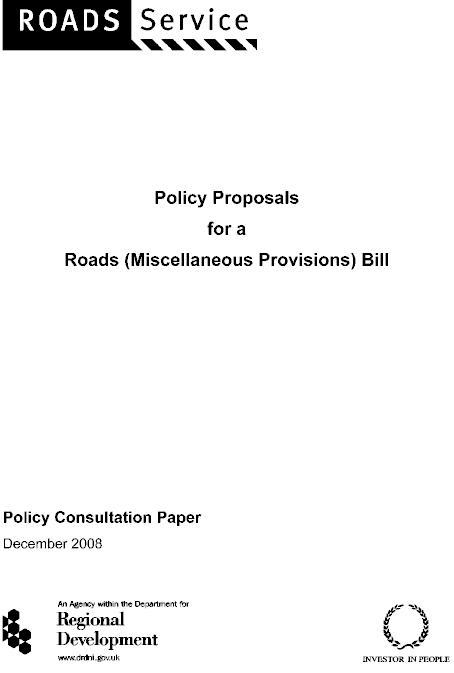
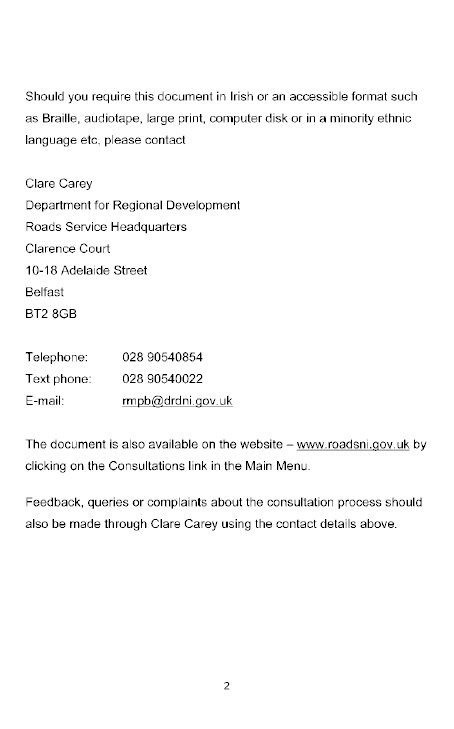
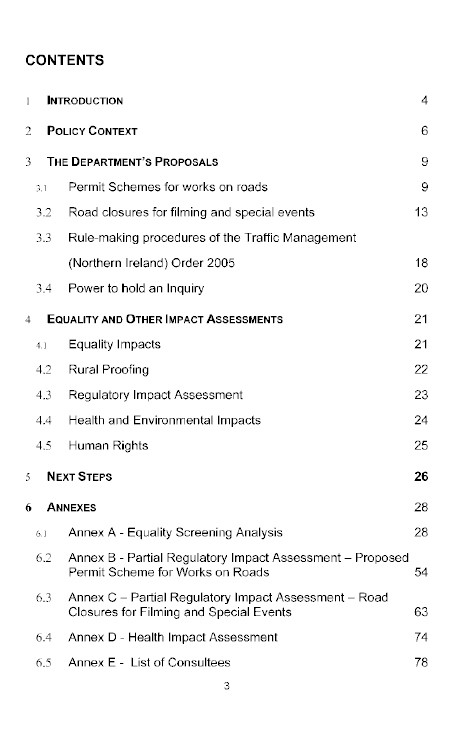
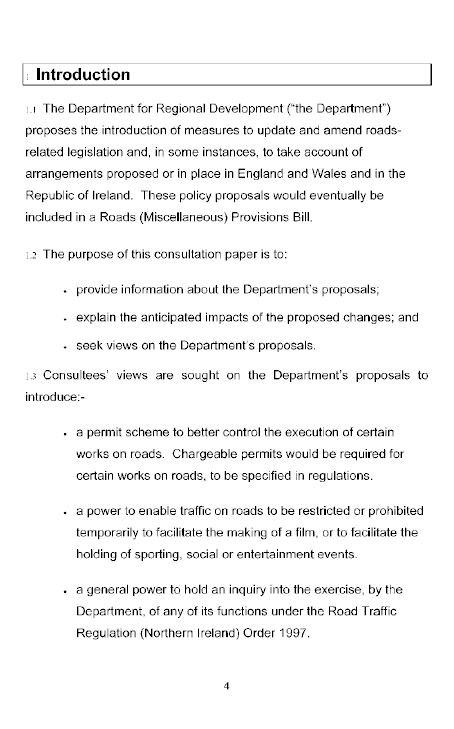
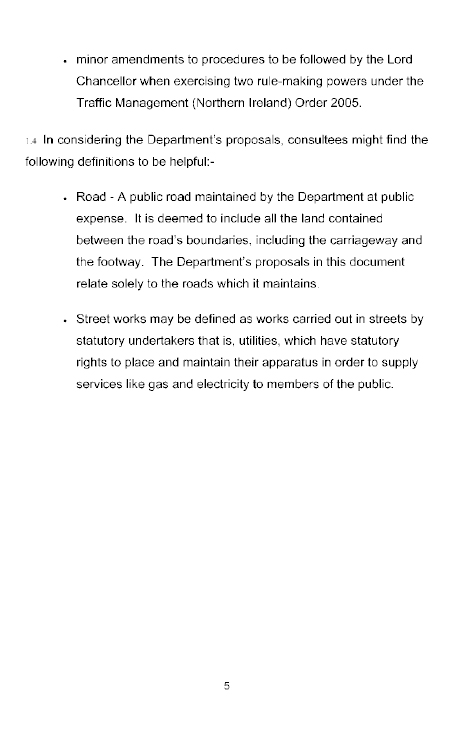
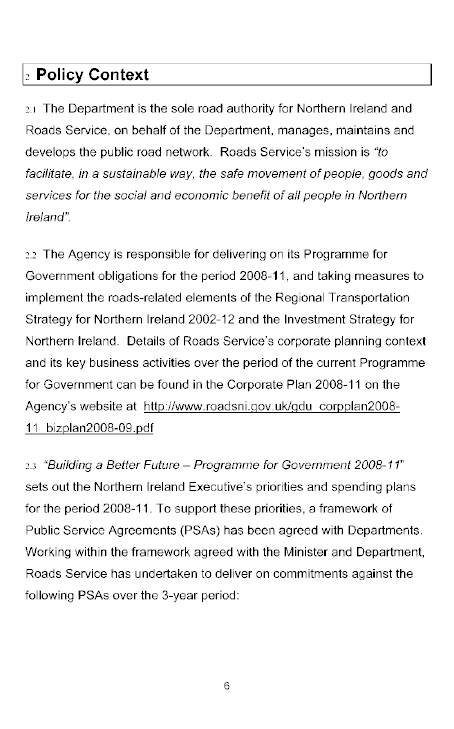
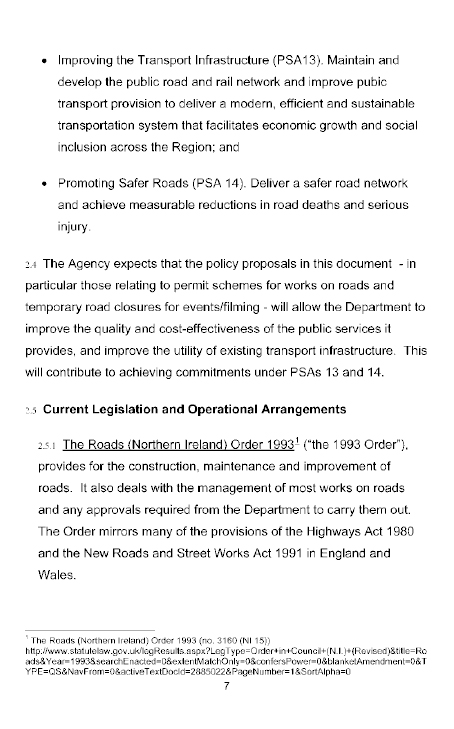
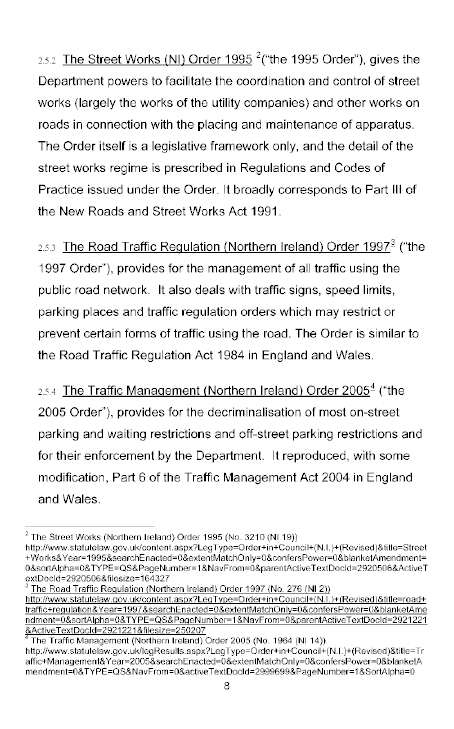
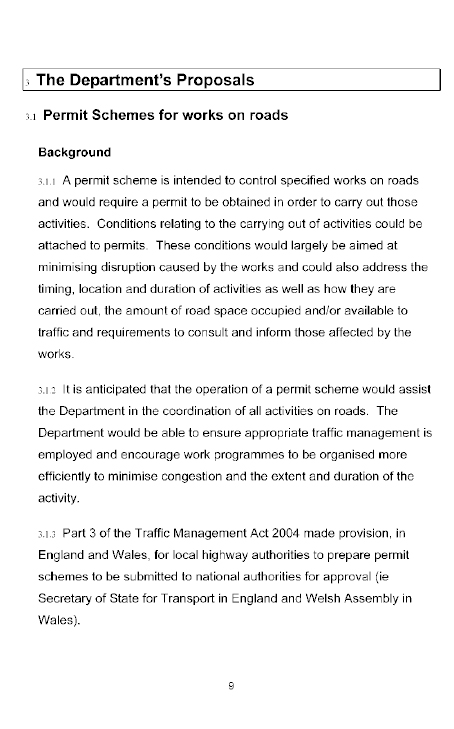
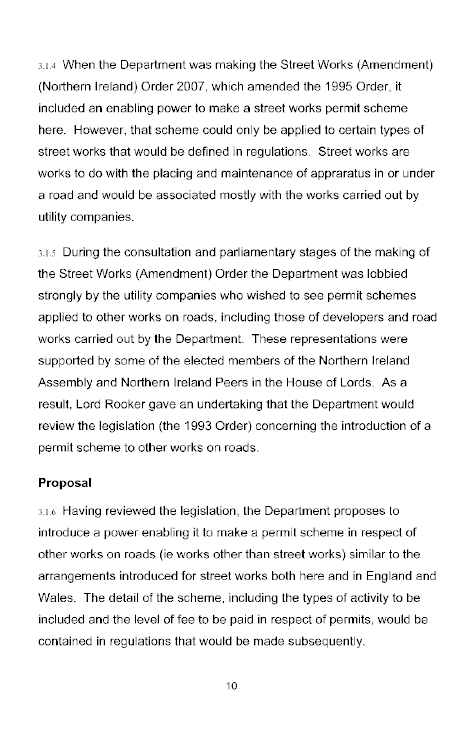
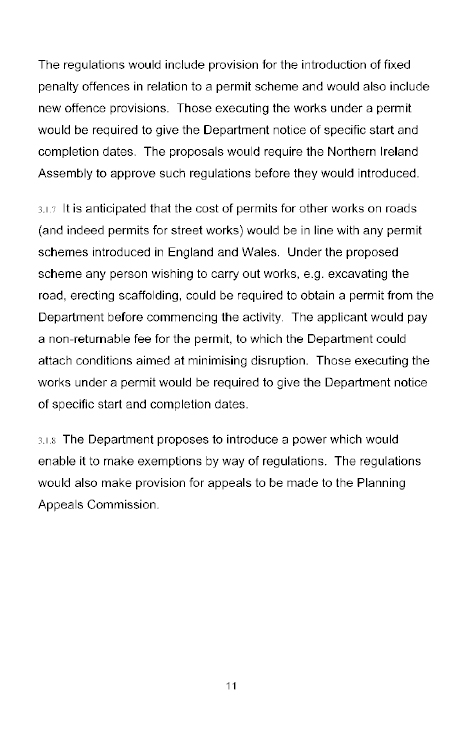
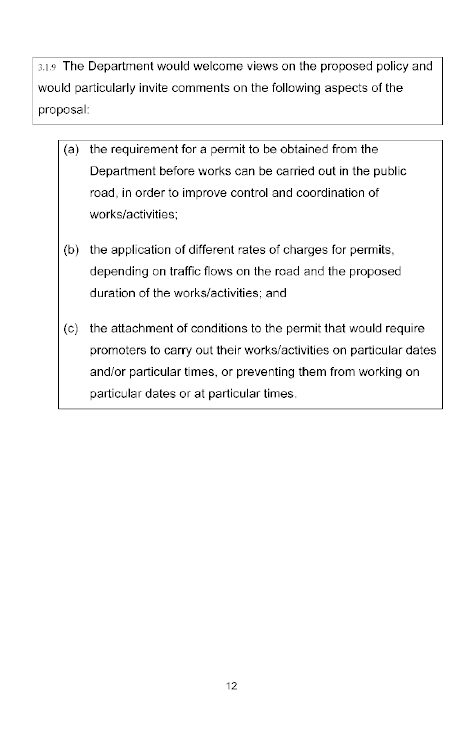
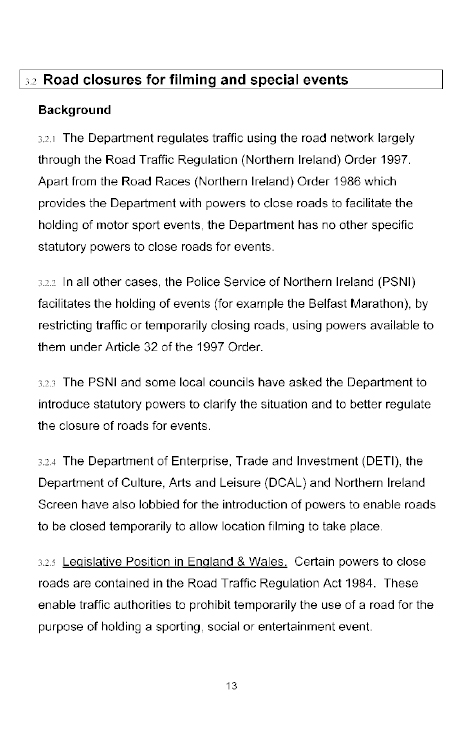
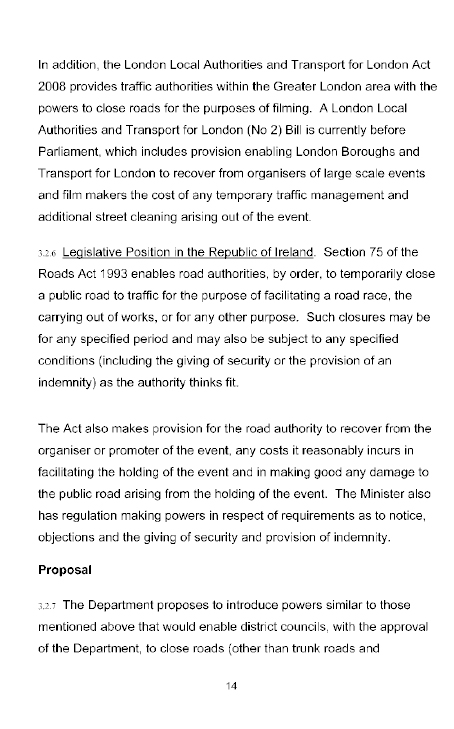
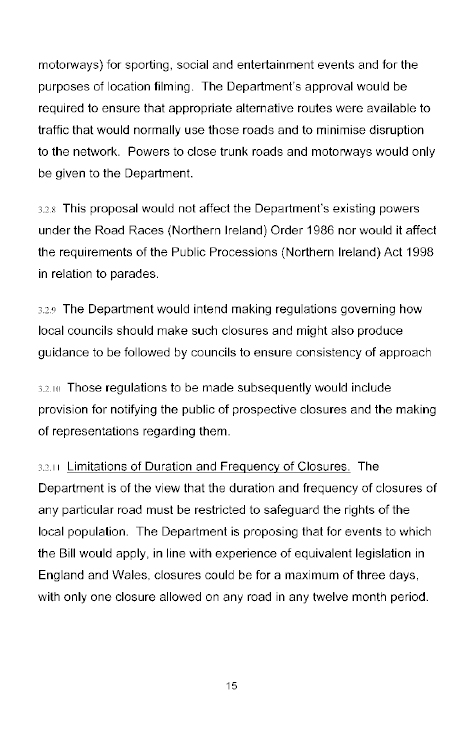
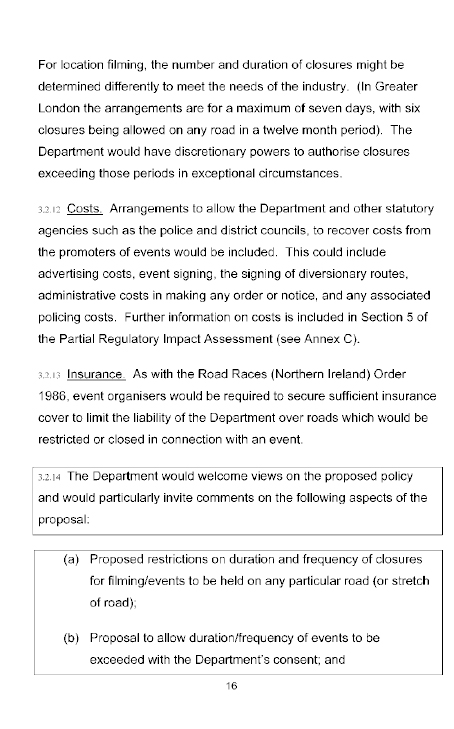

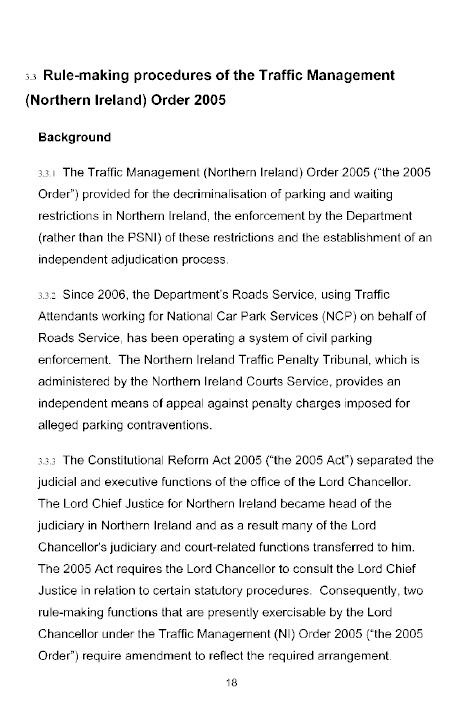
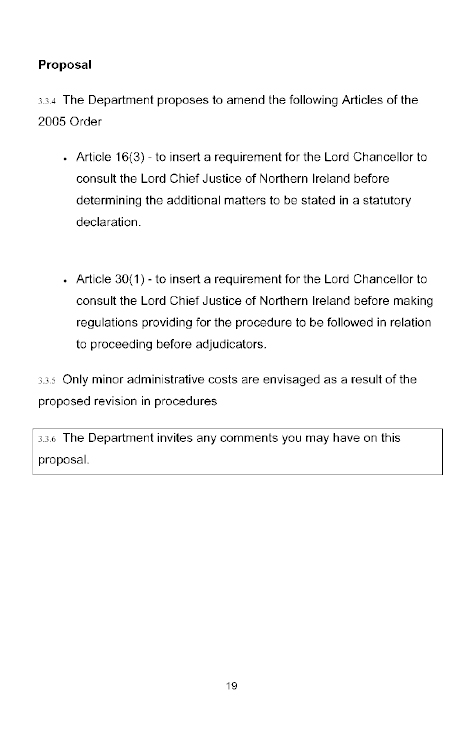
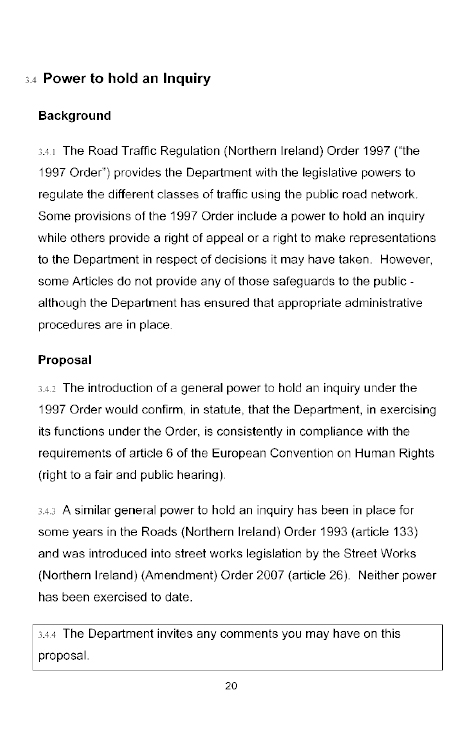
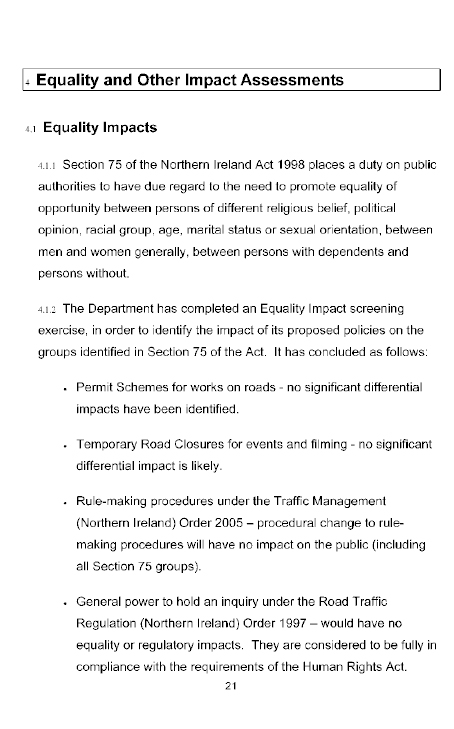
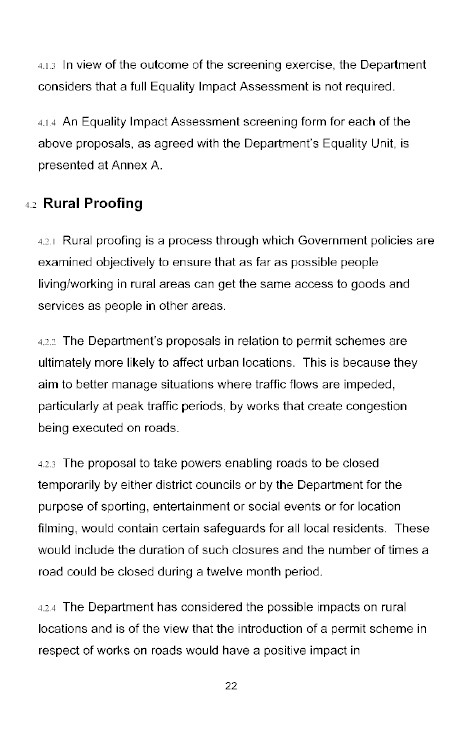
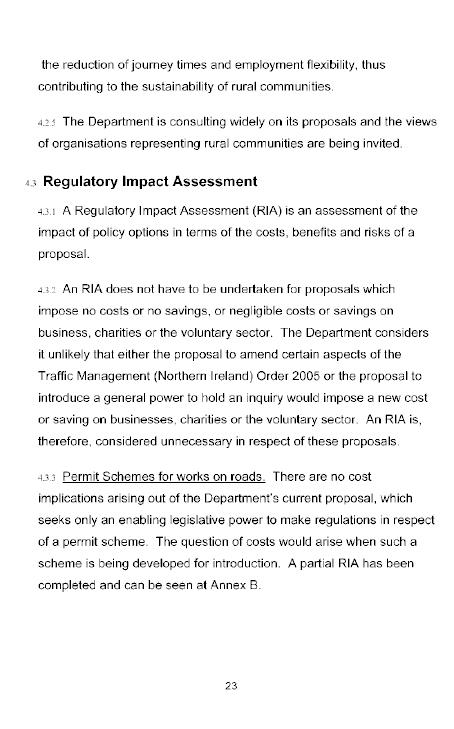
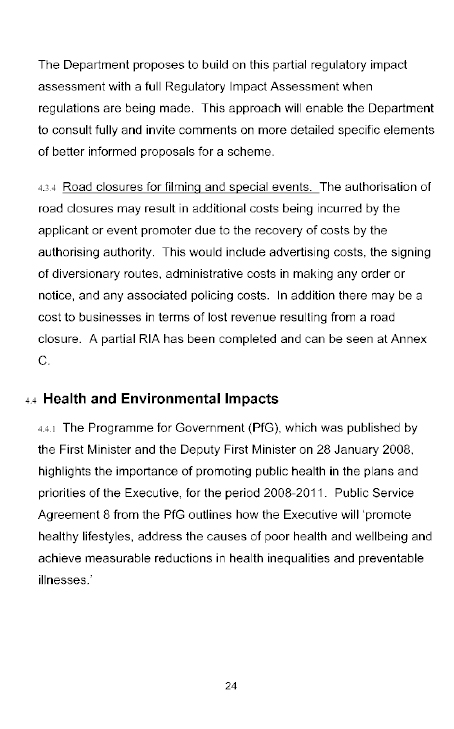
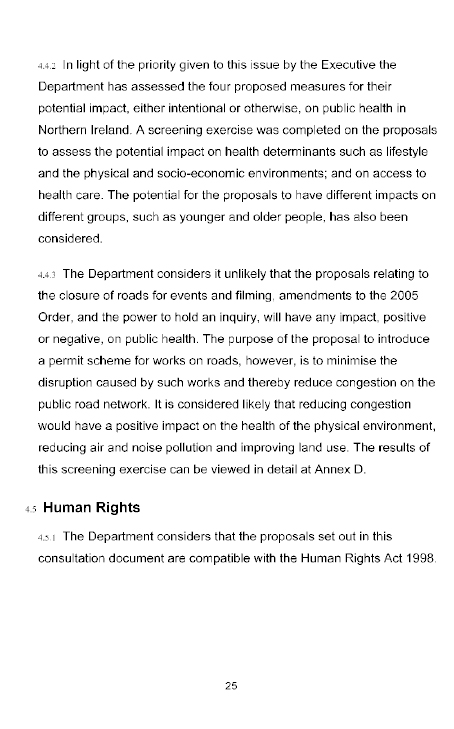
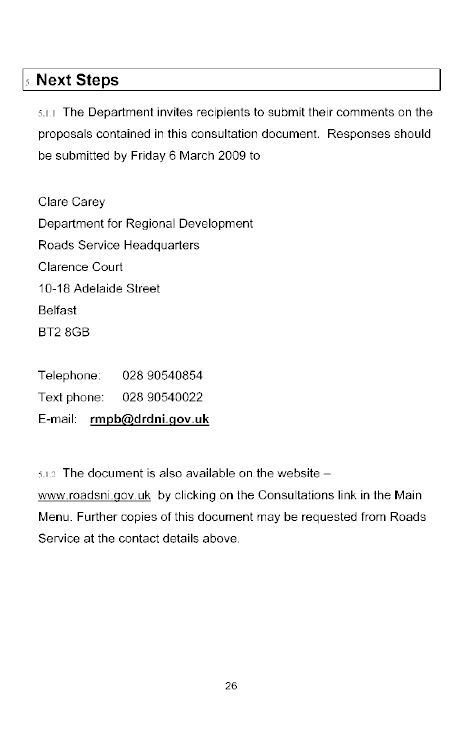
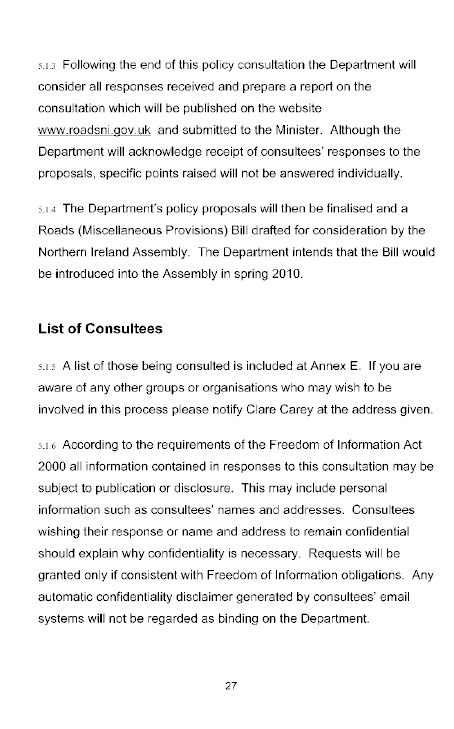
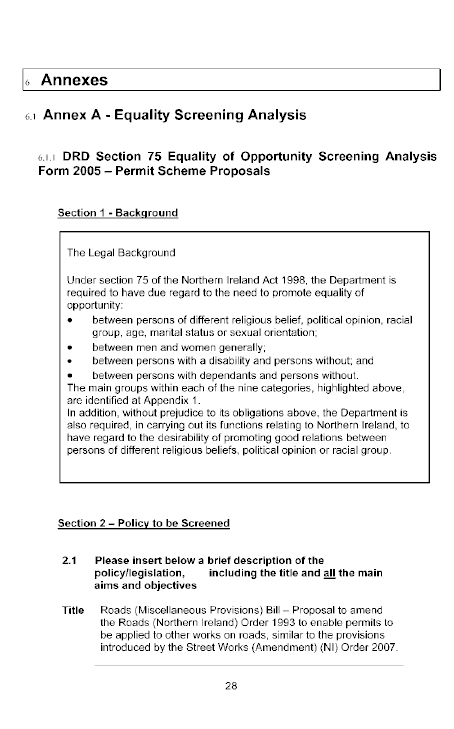
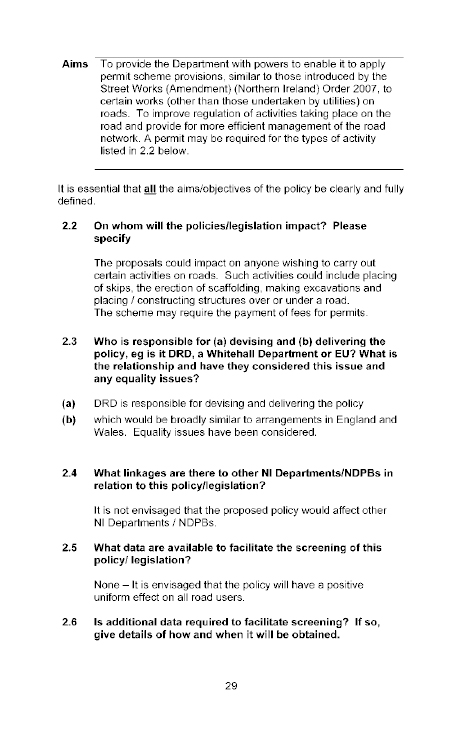
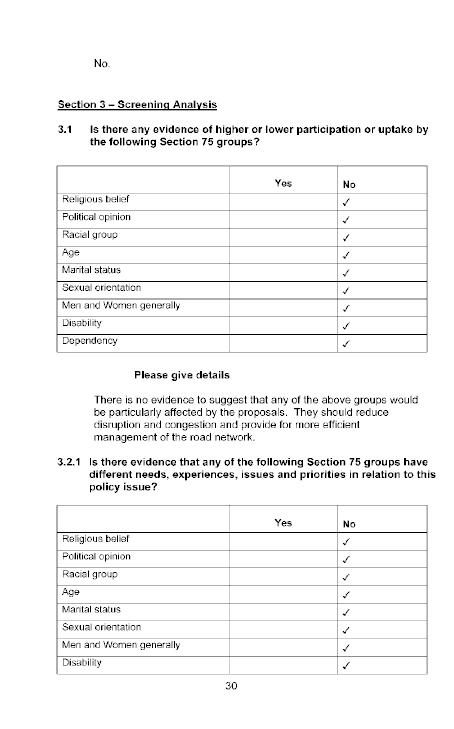
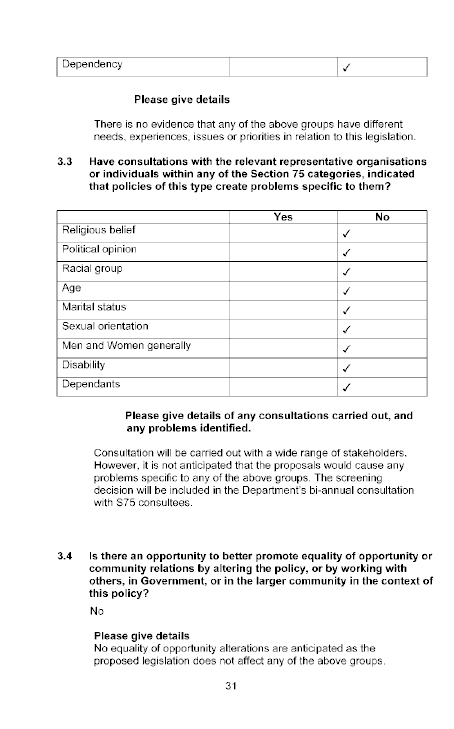
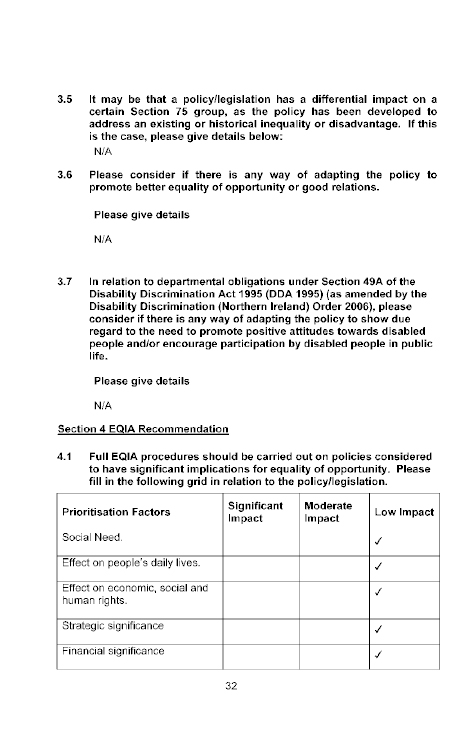
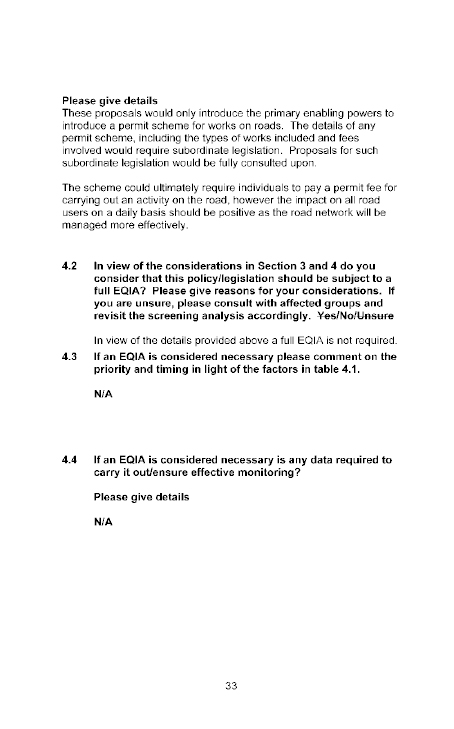
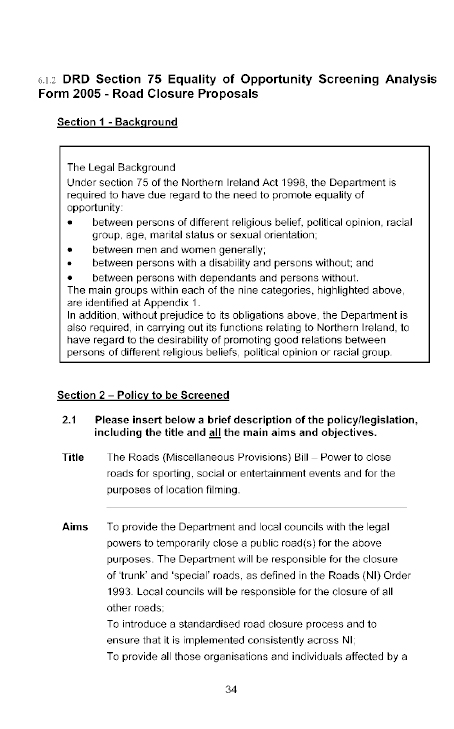
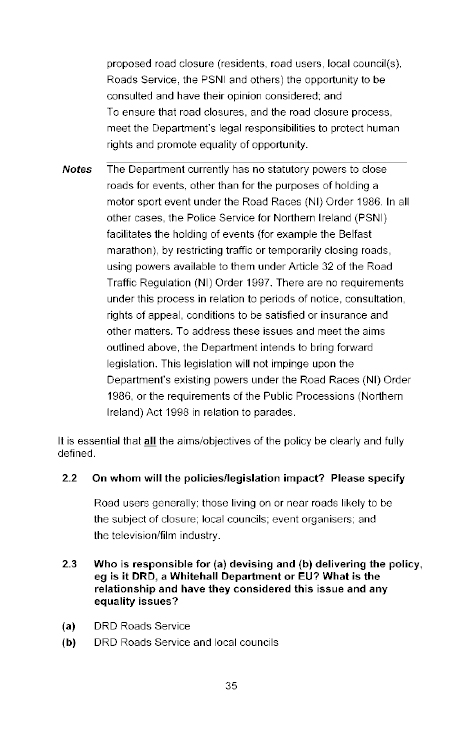
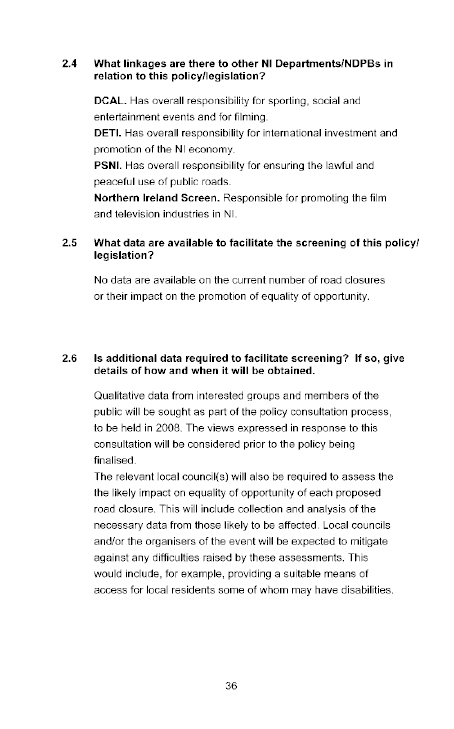
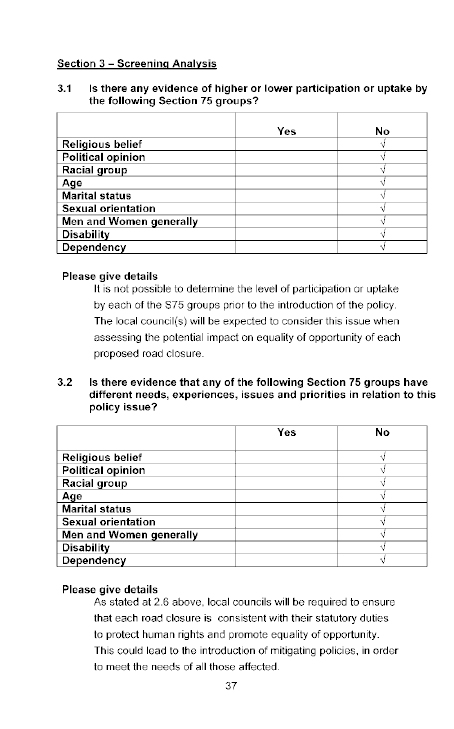
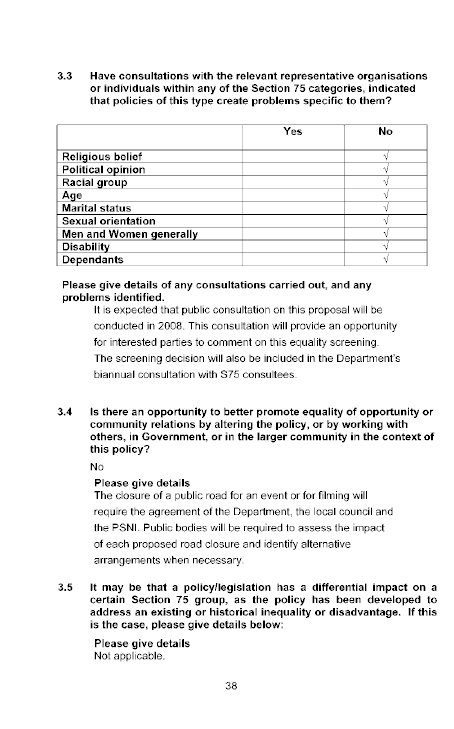
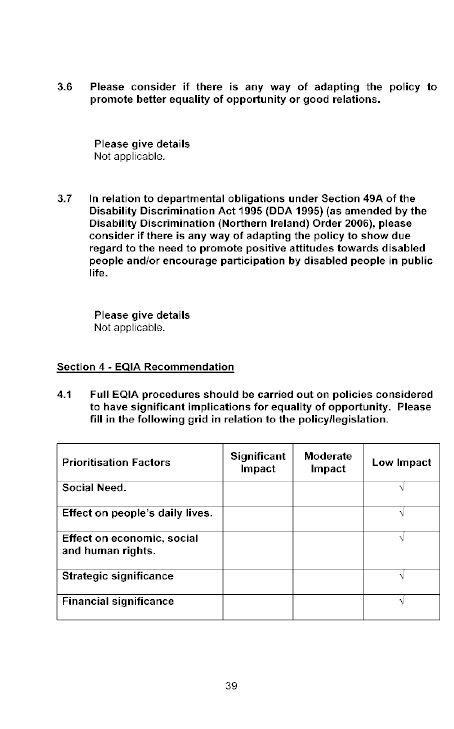
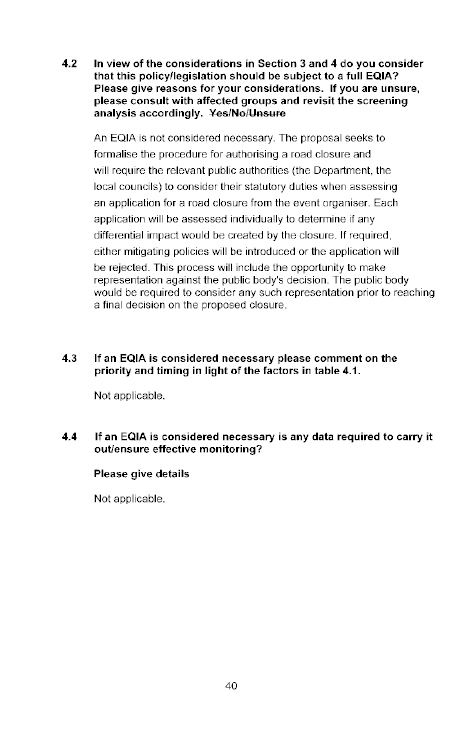
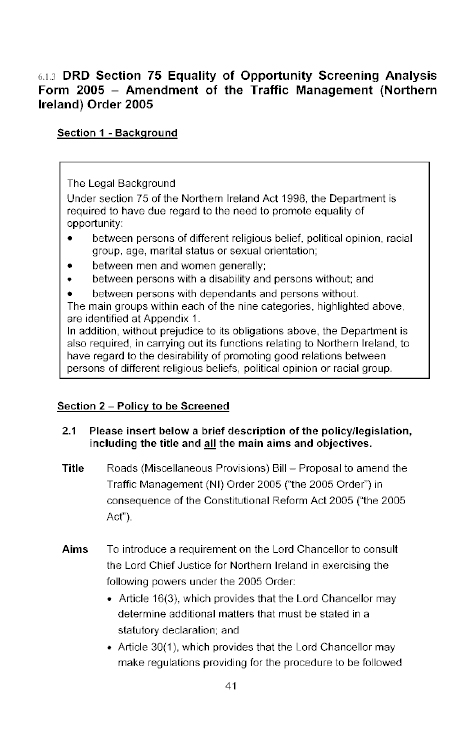
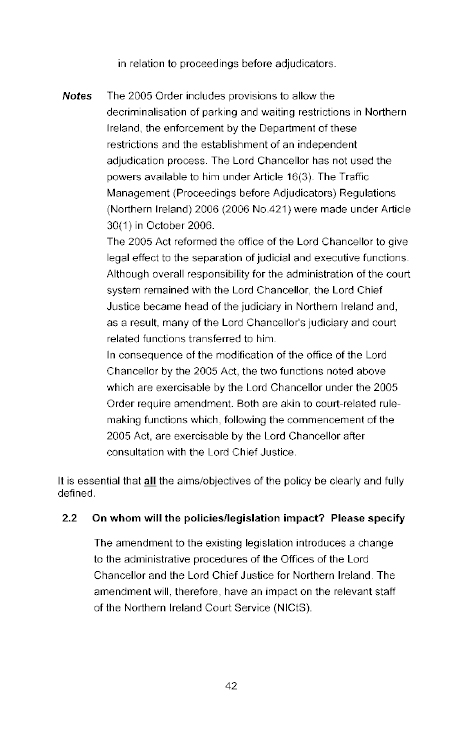
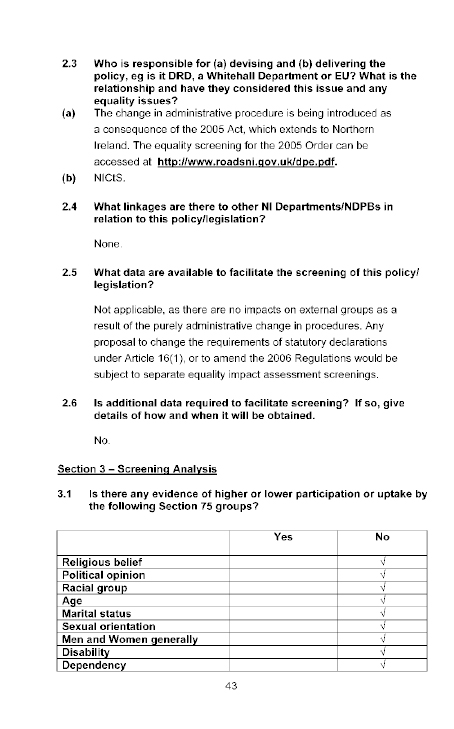
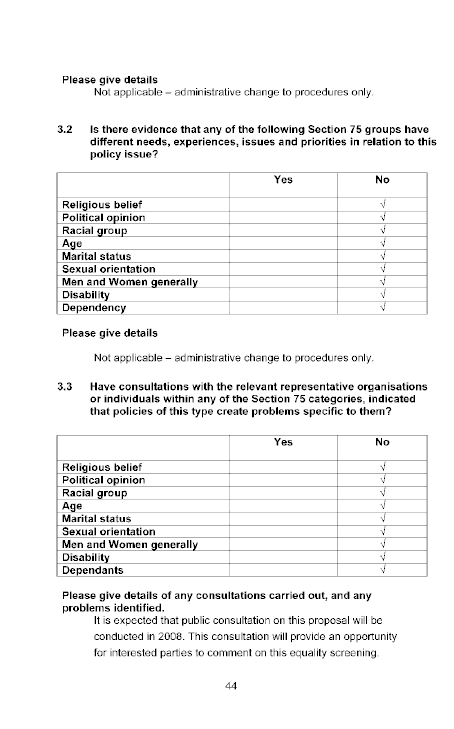
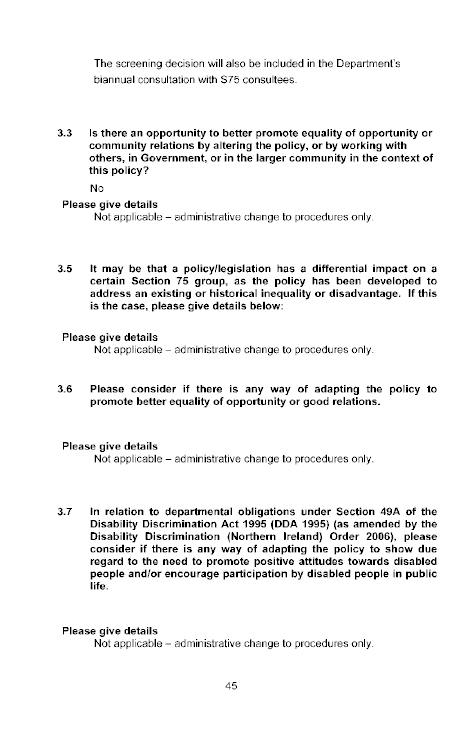
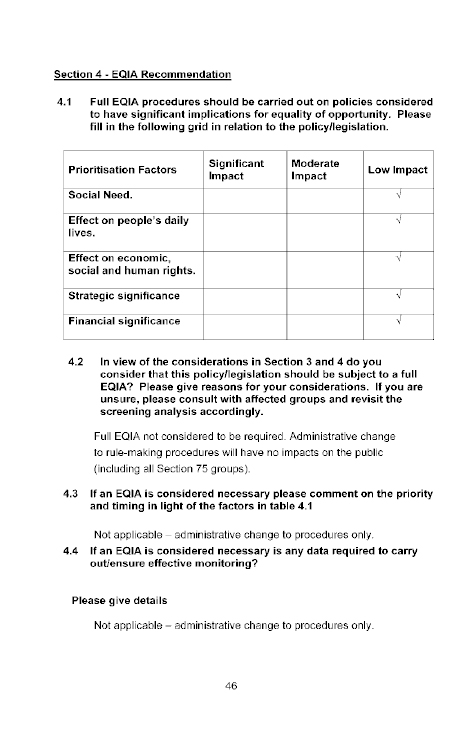
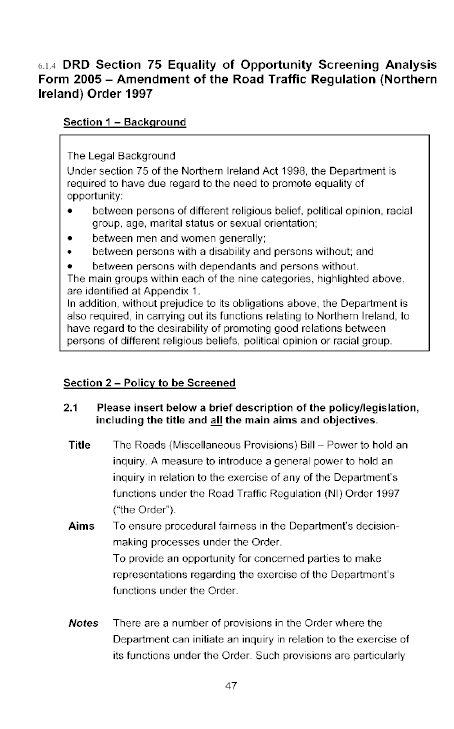
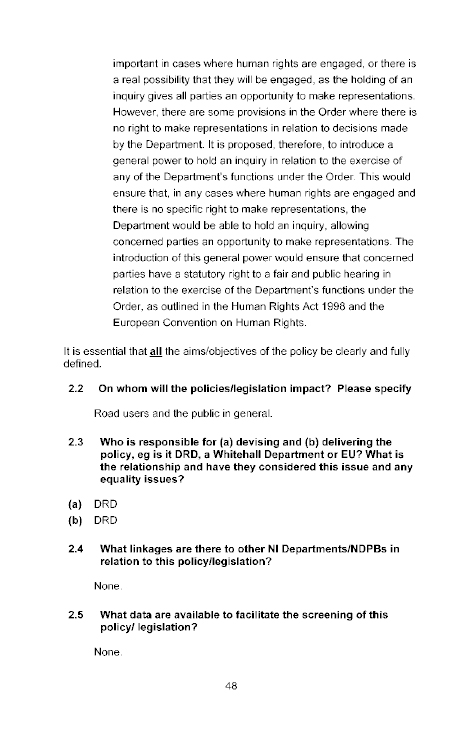
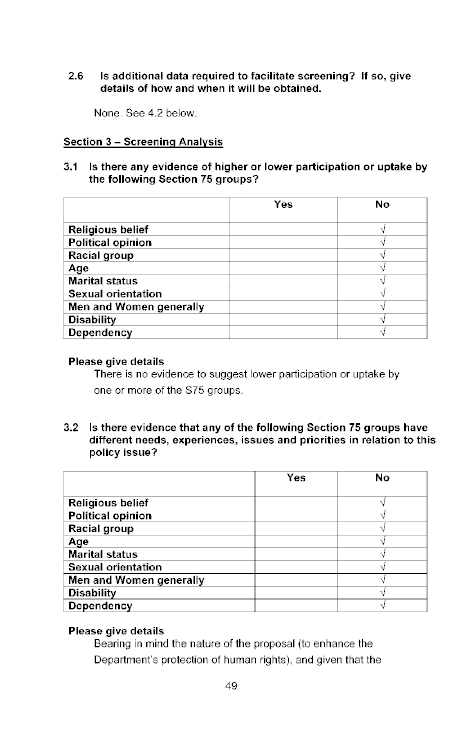
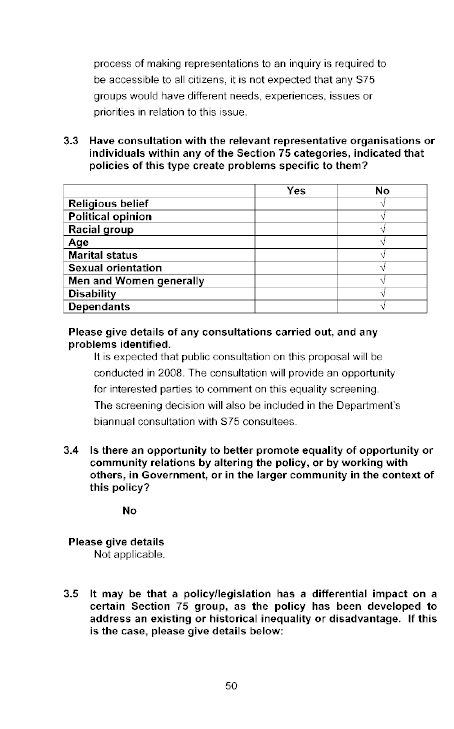
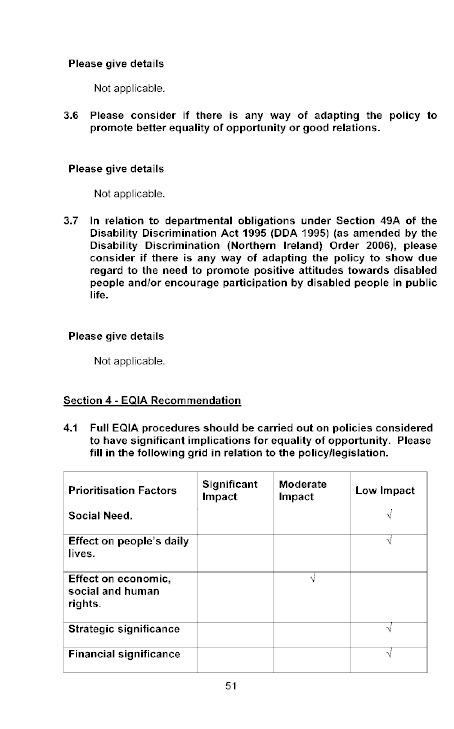
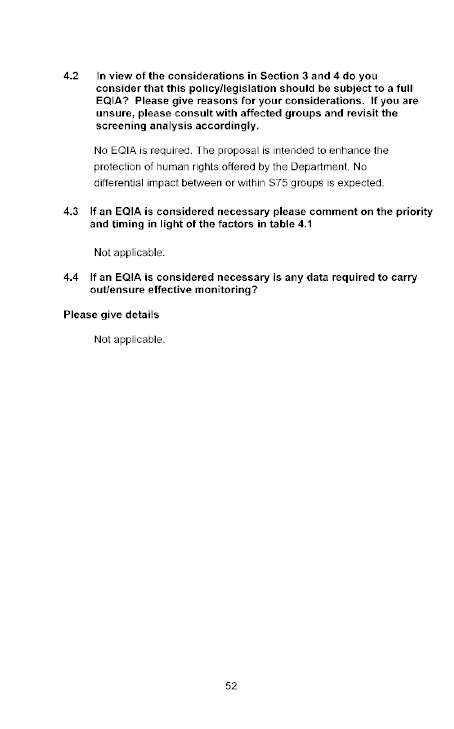
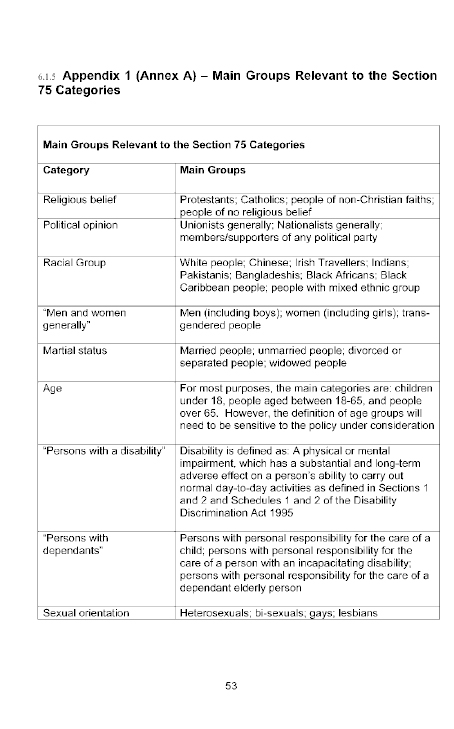
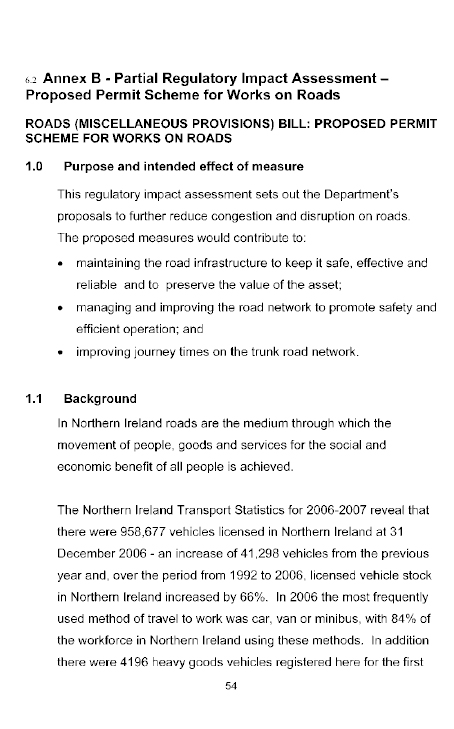
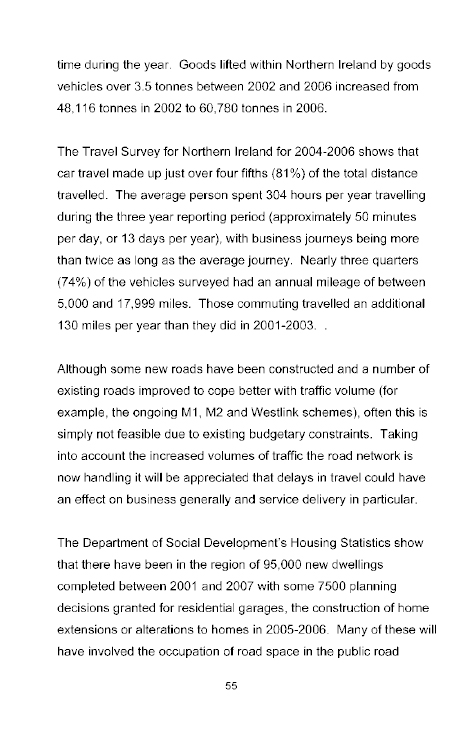
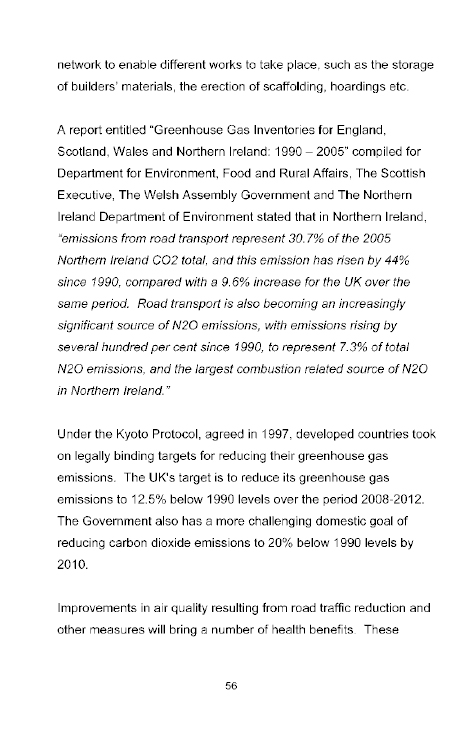
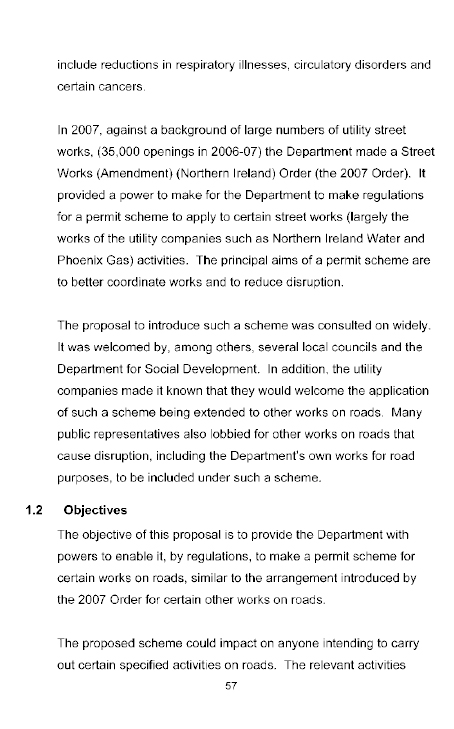
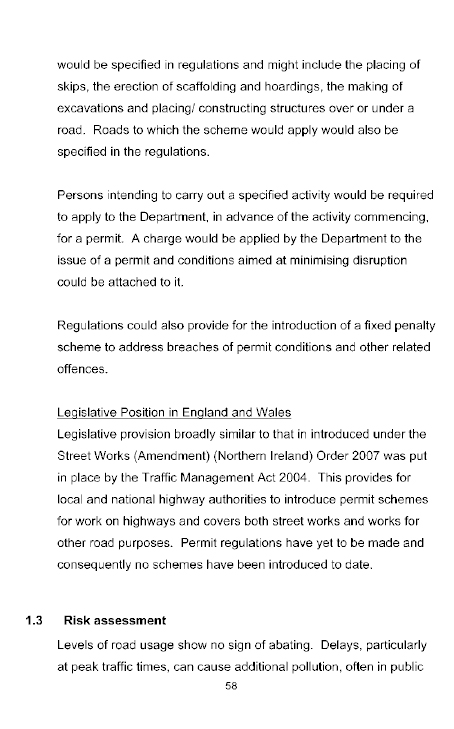
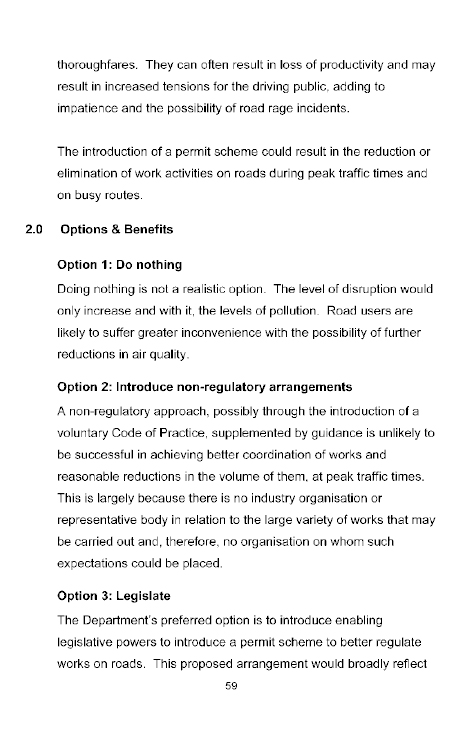
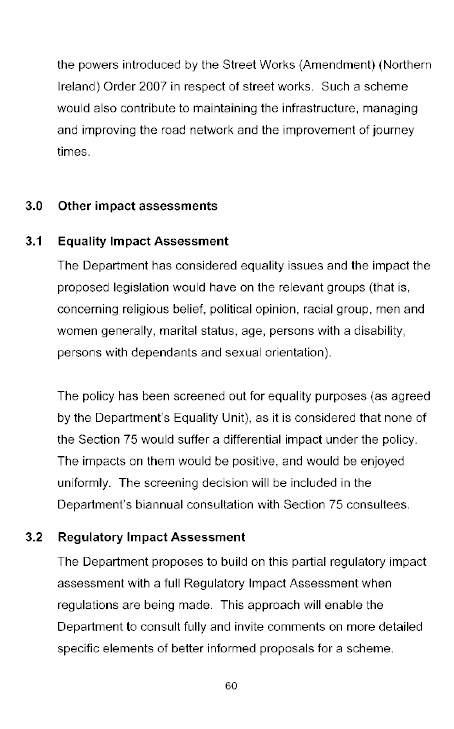
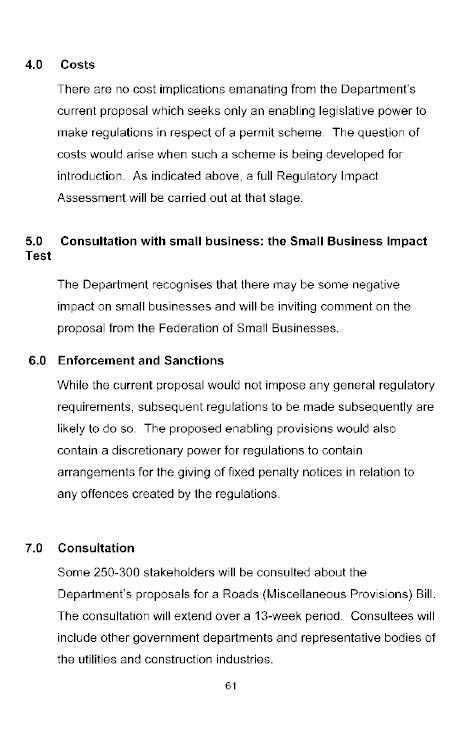

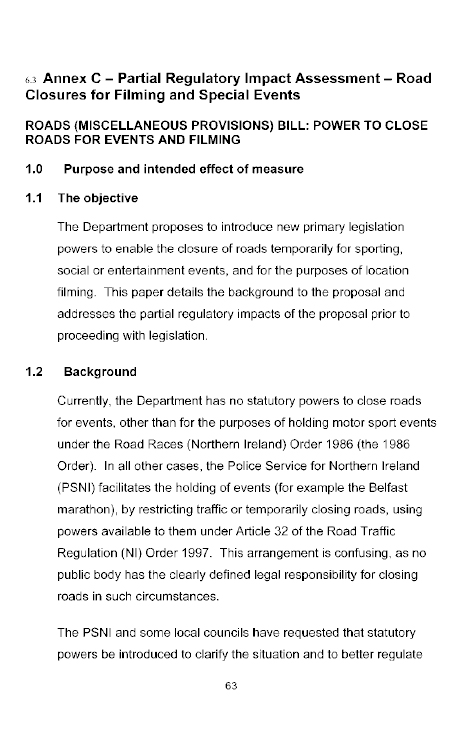
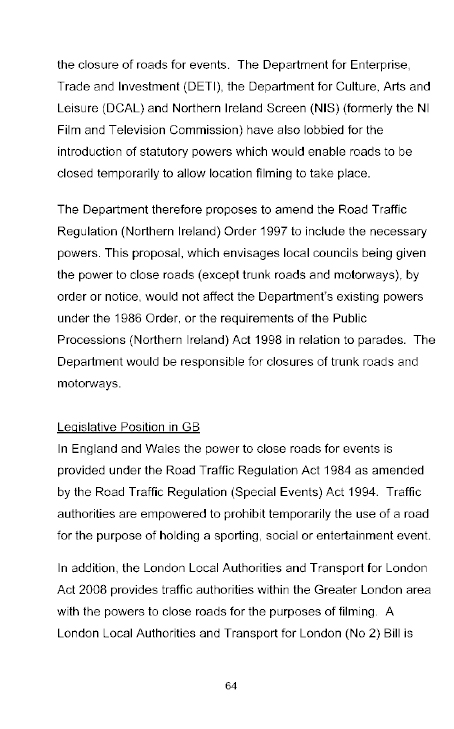
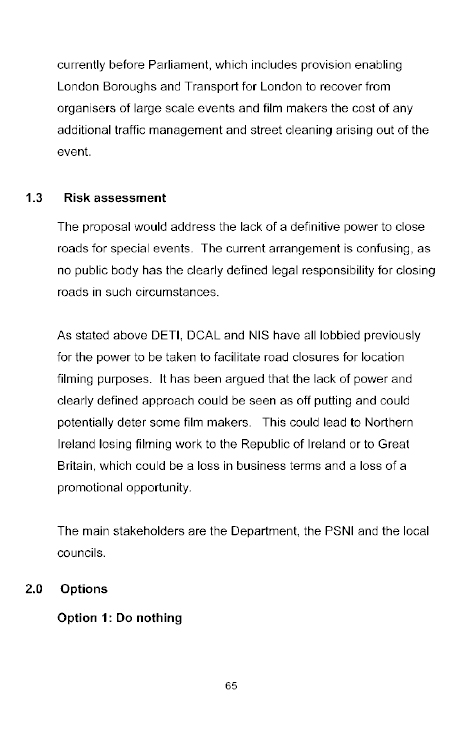
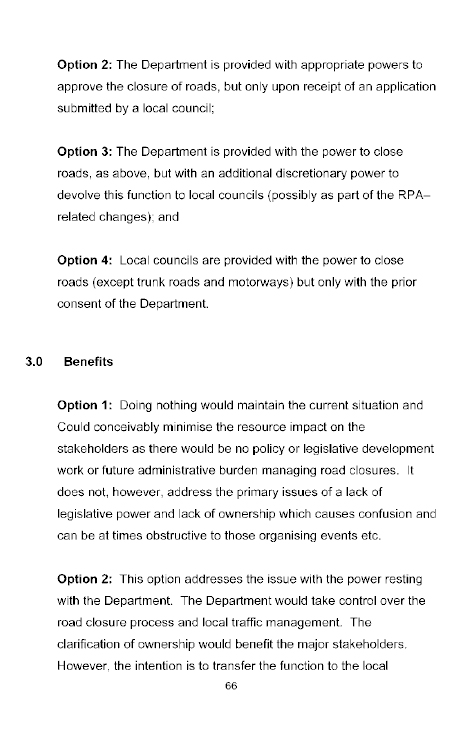
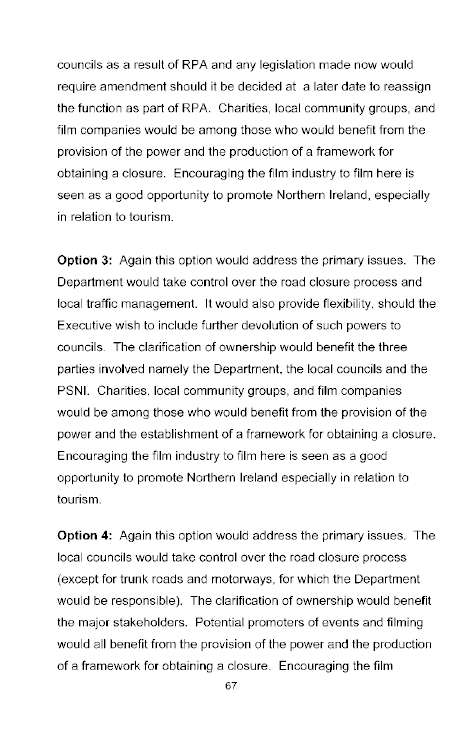
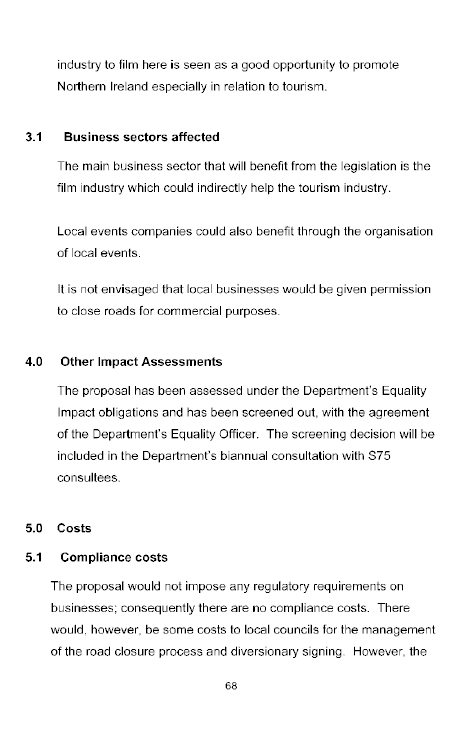
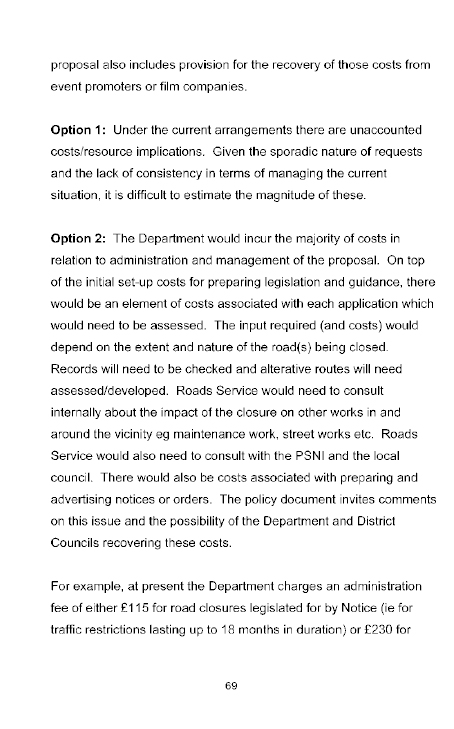
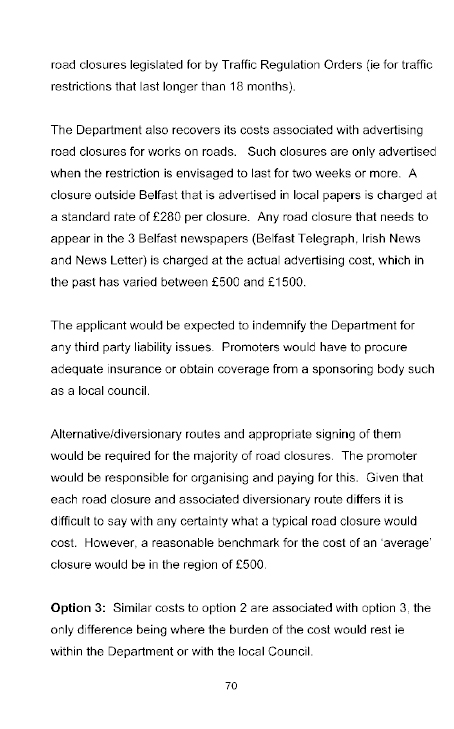
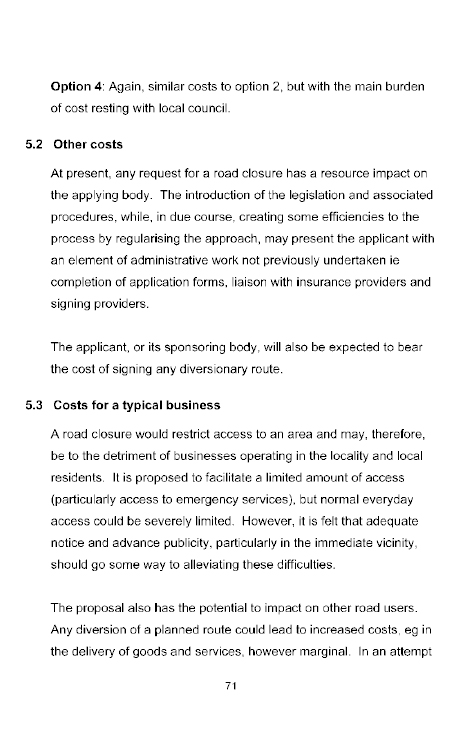

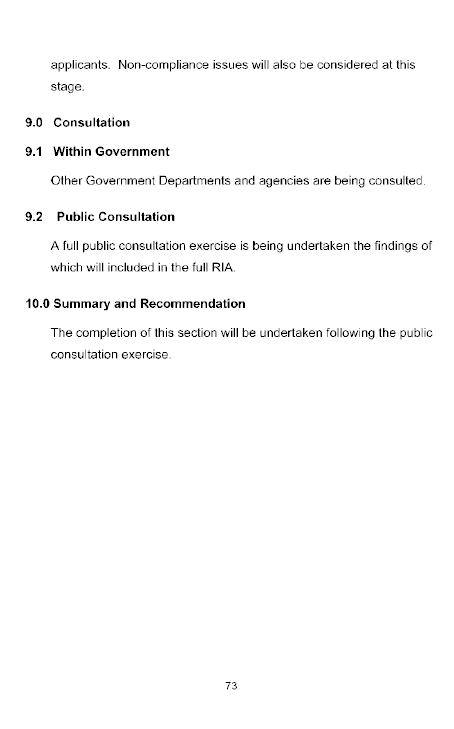
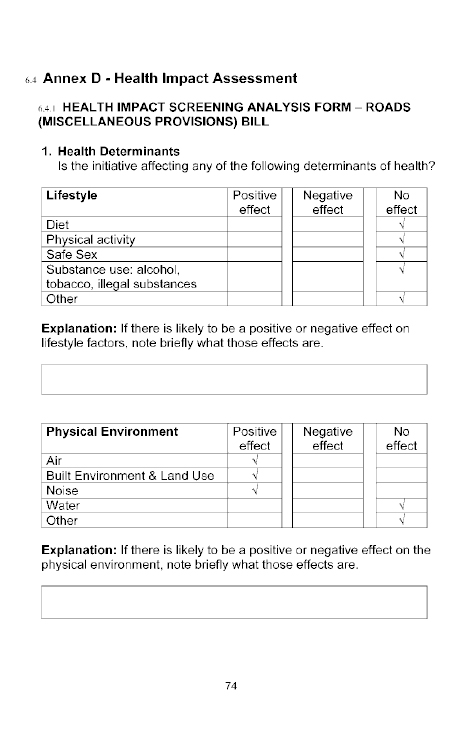

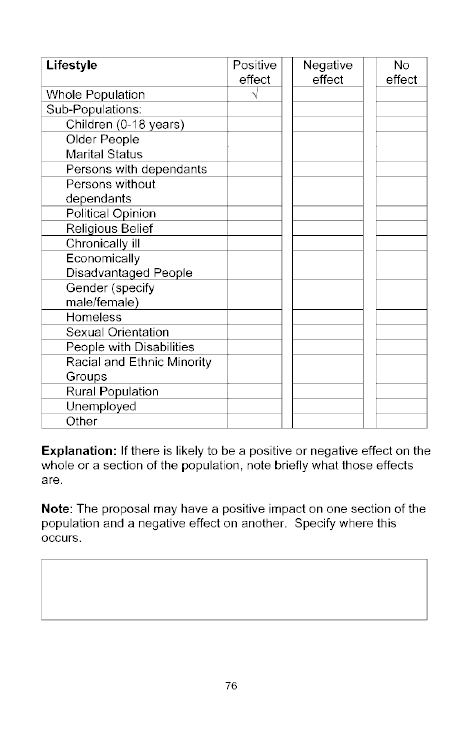
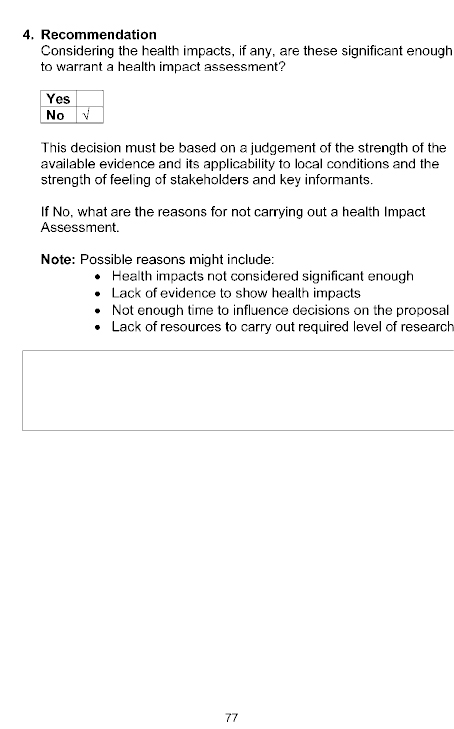
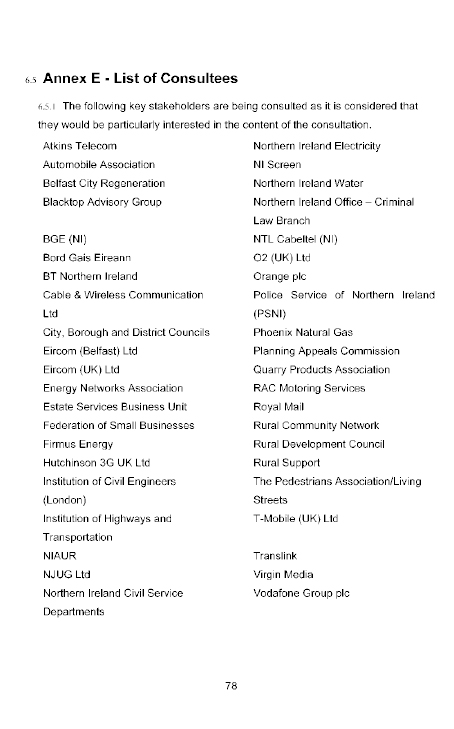
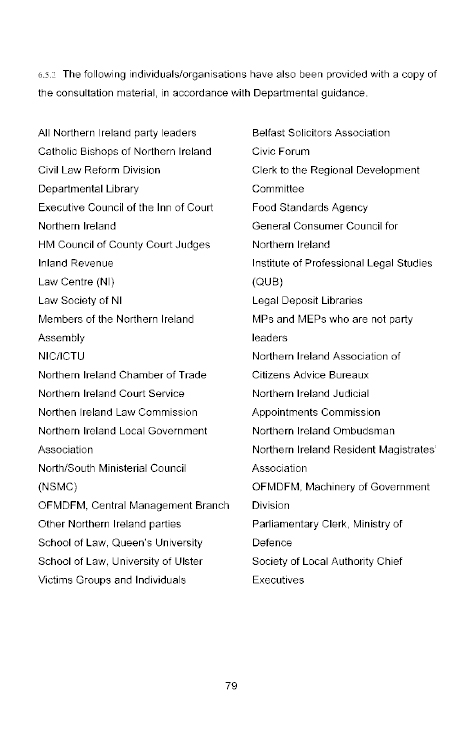
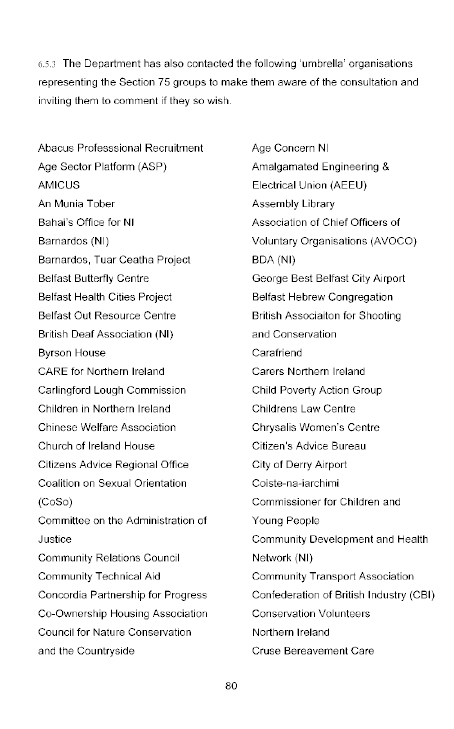
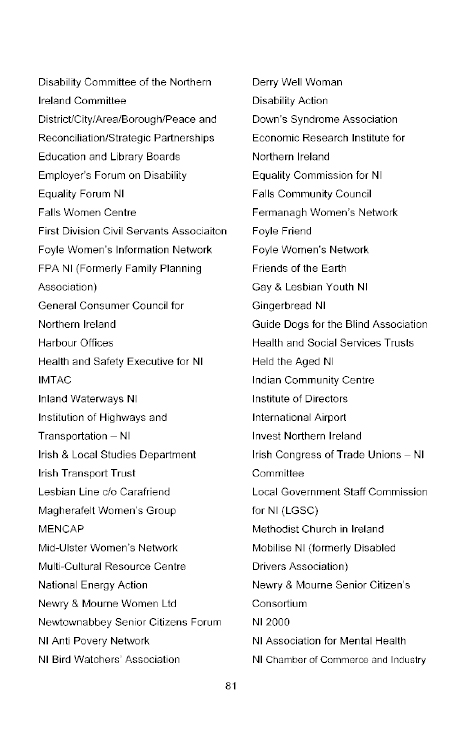
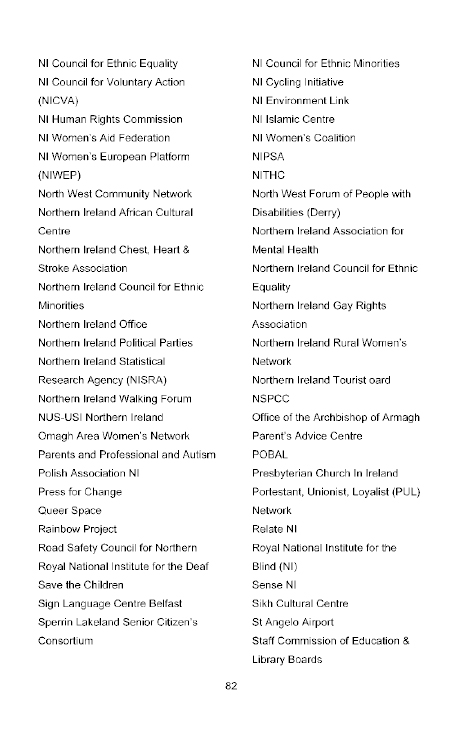

Responses to Policy Consultation and Synopsis of consultation responses, 18 March 2009
_Briefing_on_respon_fmt.jpeg)
_Briefing_on_respo_fmt1.jpeg)
_Briefing_on_respo_fmt2.jpeg)
_Briefing_on_respo_fmt3.jpeg)
_Briefing_on_respo_fmt4.jpeg)
Roads (Miscellaneous Provisions): Permit Schemes, 7 May 2009
_07052009_-_Permit__fmt.jpeg)
_07052009_-_Permit_fmt1.jpeg)
_07052009_-_Permit_fmt2.jpeg)
Roads (Miscellaneous Provisions) Bill: Policy Memorandum, 7 May 2009
_07052009_-_Policy__fmt.jpeg)
_07052009_-_Policy_fmt1.jpeg)
_Report_Public_Cons_fmt.jpeg)
_Report_Public_Con_fmt1.jpeg)
_Report_Public_Con_fmt2.jpeg)
_Report_Public_Con_fmt3.jpeg)
_Report_Public_Con_fmt4.jpeg)
_Report_Public_Con_fmt5.jpeg)
_Report_Public_Con_fmt6.jpeg)
_Report_Public_Con_fmt7.jpeg)
_Report_Public_Con_fmt8.jpeg)
_Report_Public_Con_fmt9.jpeg)
_Report_Public_Co_fmt10.jpeg)
_Report_Public_Co_fmt11.jpeg)
_Report_Public_Co_fmt12.jpeg)
_Report_Public_Co_fmt13.jpeg)
_Report_Public_Co_fmt14.jpeg)
_Report_Public_Co_fmt15.jpeg)
_Report_Public_Consu_fmt.gif)
_Report_Public_Cons_fmt1.gif)
_Report_Public_Cons_fmt2.gif)
_Report_Public_Cons_fmt3.gif)
_Report_Public_Cons_fmt4.gif)
_Report_Public_Cons_fmt5.gif)
_Report_Public_Cons_fmt6.gif)
_Report_Public_Cons_fmt7.gif)
_Report_Public_Cons_fmt8.gif)
_Report_Public_Cons_fmt9.gif)
_Report_Public_Con_fmt10.gif)
_Report_Public_Con_fmt11.gif)
Executive agreement on the content of the Roads (Miscellaneous Provisions) Bill, 26 November 2009
_26112009_Executive_fmt.jpeg)
_26112009_Executiv_fmt1.jpeg)
_26112009_Executiv_fmt2.jpeg)
Committee Stage - Roads (Miscellaneous
Provisions) Bill, 15 February 2010
_15022010_-_DRD_fmt.jpeg)
Departmental Briefing on Stakeholder Consultation,
22 March 2010
_DRD_Response_2203_fmt.jpeg)
_DRD_Response_220_fmt1.jpeg)
Submissions from Belfast City Council and
the Committee for Culture, Arts and Leisure,
31 March 2010
_DRD_response_to_B_fmt.jpeg)
_DRD_response_to__fmt1.jpeg)
_DRD_13042010_Table_fmt.jpeg)
Submissions from BT Ireland, Northern Ireland Electricity and the Committee for the Environment, 13 April 2010
_DRD_13042010_Tabl_fmt1.jpeg)
_DRD_13042010_Tabl_fmt2.jpeg)
_DRD_13042010_Tabl_fmt3.jpeg)
Submission from Phoenix Natural Gas,
16 April 2010
_DRD_Phoenix_Gas_S_fmt.jpeg)
_DRD_Phoenix_Gas__fmt1.jpeg)
Clarification of issues raised, 10 May 2010
_DALO_387_-_Clarif_fmt.jpeg)
_DALO_387_-_Clari_fmt1.jpeg)
_DALO_387_-_Clari_fmt2.jpeg)
Correspondence from the Department for
Regional Development's Primary Legislation Unit,
13 May 2010
From:
Sent: 13 May 2010 10:31
To:
Cc:
Subject: Draft amendments to Roads (Miscellaneous Provisions) Bill
[Clerk and Assistant Clerk],
As you are aware the Minister has agreed the two known amendments and these have now been drafted by OLC.
These draft amendments are attached for the consideration of the Committee.
The first relates to the comment by the [Examiner of Statutory Rules] on Clause 3(3)(e) of the Bill, which provides for only the first set of permit regulations to be made by affirmative resolution of the Assembly. The draft amendment provides for permit regulations which create an offence or increase a criminal penalty to be subject to approval by the Assembly.
The second inserts a definition of "film".
Regards
Department for Regional Development
Primary Legislation Unit
Ports and Public Transport Division
Room 6-04
Clarence Court
10-18 Adelaide Street
Belfast
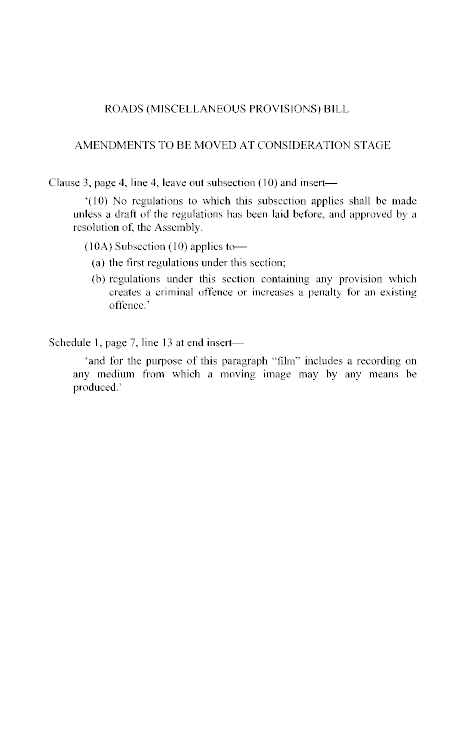
Appendix 5
Northern Ireland Assembly
Research Papers

Research Paper 581/2009 January 2010
Roads (Miscellaneous
Provisions) Bill
Research and Library Service
This paper provides an analysis of the Roads (Miscellaneous Provisions) Bill which aims to introduce measures to update and amend roads related legislation here in Northern Ireland. The new legislations will introduce provisions which give The Department for regional Development the powers to manage Events on Roads, and issue Permit Schemes for work on roads which would allow for better management of possible disruptions as well as offering the potential to generate income. This paper addresses the new provisions and provides analysis of the implications of these. The provisions for both managing Events on Roads and Permit Schemes for works on roads are based on similar legislation in England, Wales and the Republic of Ireland and therefore these are also considered.
Library Research Papers are compiled for the benefit of Members of The Assembly and their personal staff. Authors are available to discuss the contents of these papers with Members and their staff but cannot advise members of the general public.
Summary of Key Points
Introduction
The roads (miscellaneous provisions) Bill introduces a number of new measures to update and amend roads related legislation here in Northern Ireland.
The expected outcomes of these amendments will be to enable the Department for Regional Development to improve "…the quality and cost-effectiveness of the public services it provides and improve the utility of existing transport infrastructure".
This will be achieved through two new provisions which give The Department the powers to manage Events on Roads, such as closure for the purposes of filming and issue Permit Schemes for work on roads which would allow for better management of possible disruptions as well as offering the potential to generate income.
The Bill consists of 10 clauses:
- clauses 1-5 deal with the Permit Scheme;
- 6 and 7 deals with the miscellaneous provisions
These address the powers to close roads for special events including filming as well as the power to hold inquiries in connection with both new powers i.e. power to issue permits and power to close roads;
- Clauses 8-10 are the supplementary provisions.
- There are three schedules;
Schedule one includes Interpretation, procedures for making orders, how to recover costs, guidance and offences related to orders. Schedule 2 deals with amendments and schedule 3 deals with repeals.
Permit Scheme for Roads
In terms of other legislatures Provision is made for Permit Schemes on Public Roads in section 3 of The Traffic Management Act 2004[1]. It is very similar in composition to this Bill as it deals with circumstances when Permit will be issued and the arrangements for charging for these.
There is no indication that there are any councils in England charging for permits although it has been announced that a permit scheme will come into effect on London's busiest roads from January 11th 2010.
Stakeholders believe that fees should only be associated to any costs which the department may incur in issuing a permit.
Closing Roads for Special Events
In terms of closing roads, this is the result of lobbying by the PSNI and some local council's who wanted statutory powers to clarify and better regulate the closure of roads for events.
In London legislation exists which allows traffic authorities to close roads or highways specifically for the purposes of filming. This legislation was most welcome and very necessary in order that London could be viewed as world class location in which to film.
This is important as it is widely accepted that filming on location provides that location with many economic benefits both directly through job creation and the use of local services but also indirectly, not least through its propensity to promote tourism to film locations.
Clause 6 of this Bill amends the Road Traffic Regulation (Northern Ireland) Order 1997 enabling local councils to prohibit or restrict the use of roads for the purpose of holding special events which can be:
a. any sporting event, social event or entertainment which is held on a public road; or
b. the making of a film on a public road
In terms of recovering costs the bill states that the local council can retrieve all costs associated with either making the bill such as those involved in the consultation process detailed above or those which are as a consequence of issuing the order such as cleaning up and repairing any damage.
Contents
Permit Schemes for Work on Roads
Financial implications of permit scheme
Permit Schemes in Other Legislatures
Road Closure for filming and special events
Road Closures in Other legislatures
Costs for road closure by notice and order across the london boroughs
Introduction
The roads (miscellaneous provisions) Bill introduces a number of new measures to update and amend roads related legislation here in Northern Ireland. The expected outcomes of these amendments will be to enable the Department for Regional Development (the Department) to improve "…the quality and cost-effectiveness of the public services it provides and improve the utility of existing transport infrastructure".
This will be achieved through two new provisions which give The Department the powers to manage Events on Roads and issue Permit Schemes for work on roads which would allow for better management of possible disruptions as well as offering the potential to generate income.
This paper will discuss these new provisions and provide analysis of the implications of these. The provisions for both managing Events on Roads and Permit Schemes for works on roads are based on similar legislation in England, Wales and the Republic of Ireland and therefore these will also be considered.
In addition, the Roads (Miscellaneous Provisions) Bill gives the Department the power to hold a public enquiry to ensure anybody affected by the provisions introduced by the new Bill will have the opportunity to present their case and the Bill also amends "the Traffic Management (Northern Ireland) Order 2005 to take account of changes that have taken place in the functions of both the Lord Chancellor's Office and that of the Lord Chief Justice.
Permit Schemes for Work on Roads
Background
Road works cause much disruption to the roads network in Northern Ireland leading to congestion and delays. Current transport statistics suggest that the level of road use is still rising annually; with cars, vans and minibuses accounting for 83 per cent of journeys to work in 2008[2] and therefore the strain on the road network along with the need for investment will only increase in the future.
In addition to the necessary works carried out by the department to maintain the road network the utility companies contribute significantly to the disruption caused through their road openings which total in excess of 35,000 per annum[3]. The National Joint Utilities Group (NJUG) highlighted the important work of utilities in their response to the public consultation on the Bill, stating that:
"It is essential that utilities are able to conduct their necessary works to ensure supply of essential utilities such as water, gas, electricity and telecommunications services. To this end, our members undertake street works for four reasons – safety, security of supply, to connect or upgrade customers' supplies, or to divert apparatus to facilitate major transport or urban regeneration projects."[4]
The permit scheme is designed to allow for better management of road works which would minimise disruption to the road network. This would be achieved through better control of start and finish dates as specified by the permit as well as allowing for forward planning on the part of the department for things like traffic diversions.
Existing Legislation
The Street Works (Amendment) (Northern Ireland) Order 2007 introduced permit requirements, largely in respect of street works carried out by utilities, however, the consultation stage of this Bill identified the need for this type of scheme to apply to all types of work on roads therefore including private contractors as well as utilities and the roads service.
Clauses 1 - 3
Part 1 of the Bill consists of five clauses which deal with the Permit Scheme.
Clause 1 defines what a permit scheme is, which is a scheme designed to control the carrying out of work on roads and states that a permit must be obtained prior to the commencement of work. This clause also makes provision for circumstances where a permit will not be required to carry out work.
Clause 2 is concerned with the making, variation and revocation of schemes. It states that the Department may prepare a permit scheme according to the specified regulations listed in clause 3 (below) and gives details of what must be included in the order such as, where copies can be obtained, the date of the scheme and any other provision which it includes.
Clause 3 provides regulations regarding the content of schemes and the procedures to be followed in the making and operation of the schemes. The regulations make provision for:
- The criteria for issuing, reviewing or cancelling schemes;
- The facilitation of disputes;
- The appeals process;
- Actions to be taken when work is carried out without a permit;
- The penalty associated with carrying out un-consented work; and
- Deciding who is liable for carrying out un-consented work.
Financial implications of permit scheme
Clause 3(4) makes provision for the Department to have the power to issue fixed penalty notices where work is carried out without a permit, meaning that the person who is liable has the opportunity to stave off conviction by paying a fine. Provision is also made (3(5)) for the introduction of a fee for a permit application; the issuing of a permit; and an application to change a permit while subsection 6 deals with the payment of these fees.
It is suggested in the Policy Consultation paper that any charges for schemes would be in line with those introduced in England and Wales. It states that "the applicant would pay a non-returnable fee for the permit, to which the Department could attach conditions aimed at minimising disruption"[5] and those executing the works would have to give notice of specific start and finish dates.
Clauses 4 and 5
Clause 4 is the Crown Application while Clause 5 deals with interpretation of Part 1 of the Bill
Permit Schemes in Other Legislatures
In England and Wales provision is made for Permit Schemes on Public Roads in section 3 of The Traffic Management Act 2004[6]. It is very similar in composition to this Bill. In terms of payment it states that a fee may be charged for an application for a permit, the issuing of the permit, any application to change the permit and the application of these changes to the permit.
While there is no indication that there are any councils in England actually charging for the permits identified above, this English regulation: The Street Works (Charges for Unreasonably Prolonged Occupation of the Highway) (England) 2009 apply to every publicly maintainable highway, and allow councils to punish contractors and utilities for taking unreasonable times to complete jobs. Under this regulation the highway authority has the option to levy a fee when it feels the work on the road has gone on unnecessarily long, based on the original agreement it made with the undertaker. The maximum fees are shown in table 1 below:
The reason perhaps why the charges under the permit scheme have yet to be applied is that there are also provisions in the legislation, as there are in this Bill for circumstances when a fee is not necessary, where it may be discounted and the timeframe and manner of payment.
The code of practice identifies types of works which are exempt from payment, these are[7]:
- works in non traffic-sensitive streets;
- works in the footway of traffic-sensitive streets, at traffic-sensitive times;
- works in traffic-sensitive streets at non traffic-sensitive times;
- replacing poles, lamps, columns or signs in the same location;
- pole testing;
- works where any small diameter holes of less than 30mm diameter are created for investigatory purposes; for example bar holes.
- works carried out by, or on behalf of, a highway authority.
Therefore, what constitutes a traffic sensitive street may be open to interpretation.
Table 1: Maximum fees (daily charges) for unreasonable overrun of project[8]
| Street having a road category other than 2, 3 or 41 |
Street of road category 2 | Street of road category 3 or 4 (TS) |
Street of road category 3 or 4 (TS) |
|
| Major and Standard works | £ 2, 500 | £2,000 | £750 | £250 |
| Minor and Immediate works | £500 | £500 | £250 | £100 |
It has been announced that a permit scheme will come into effect on London's busiest roads from January 11th 2010. The Permits scheme, which will affect 18 Borough's in all, will require utility companies and other companies to apply for permits to dig up roads and is also aimed at reducing disruption by putting heavy penalties on jobs that go over time for example, they will have to pay £240 for each permit and face fines of up to £5,000 if they breach regulations[9]. Transport for London also believes that:
"Permitting will enable TfL to plan and coordinate the timing of roadwork's, providing greater opportunities for multiple companies to work on the same sections of road simultaneously"[10].
While this will reduce the need to re-dig certain roads and will inevitably reduce disruption, further action may also be taken. In addition to the permitting scheme and with a view to putting the companies under further pressure to complete jobs on time TfL are in talks with the Department for Transport to allow them to introduce a lane rental scheme which would require utility companies to pay a rental charge for every day that they are working on a street, rather than a one-off charge.
In terms of the response at consultation to the introduction of charges for permits here in Northern Ireland; BT, NIE and NJUG all took the view that these should only be associated to any costs which the department may incur with NJUG stating that:
"Roads that do not attract congestion should not be included within a permit scheme. Charges should only relate to the additional costs incurred in operating a permit scheme and not be related to the works activity being undertaken. There should be no profit loading which this proposal would allow."[11]
This suggestion from NJUG would appear to be closely aligned to what is happening in England with only the busiest roads in London now likely to charge for the permit scheme. The possible negative implications of these types of charges becoming too widespread include the passing on of costs to consumers[12].
Road Closure for filming and special events
Background
The PSNI and some local council's lobbied the Department to introduce statutory powers to clarify and better regulate the closure of roads for events. Currently the Department controls road closures through either the:
- Road Traffic Regulation (Northern Ireland) Order 1997; or the
- Road Races (Northern Ireland) Order 1986.
The Police Service for Northern Ireland facilitates events such as the Belfast Marathon through the temporary closing of roads under article 32 of the Road Traffic Regulation (NI) Order 1997.
Road Closures in Other legislatures
In England powers to close roads are contained in the Road Traffic Regulation Act 1984 which states that the traffic authority can prohibit or restrict traffic on a road for the purpose of:
a. facilitating the holding of a relevant event,
b. enabling members of the public to watch a relevant event, or
c. reducing the disruption to traffic likely to be caused by a relevant event.[13]
In this "relevant event" means any sporting event, social event or entertainment which is held on a road and the order which closes the road will only last for 3 days[14]. This does not however pay any particular reference to closing a road for the purpose of filming which has created a level of ambiguity surrounding what is a "relevant event".
The power to close a road for filming is of particular interest to this Bill which will provide the power to enable traffic on roads to be restricted or prohibited temporarily to facilitate the making of a film, or to facilitate the holding of sporting, social or entertainment events.
London
The London Local Authorities (LLA) and Transport for London (TfL) Act 2008 provides legislation which allows traffic authorities to close roads or highways in London specifically for the purposes of filming. According to Film London which acts as London's film and media agency this legislation was most welcome and very necessary in order that London could be viewed as world class location in which to film.[15]
The issue with the previously existing legislation was the level of ambiguity which existed over what was a relevant event (see above) and this was seen as a major disadvantage when compared to other cities worldwide.
It is widely accepted that filming on location provides that location with many economic benefits both directly through job creation and the use of local services[16] but also indirectly, not least through its propensity to promote tourism to film locations[17].
What the old legislation did allow for was a road closure by order for up to three days and only once per year, where as this legislation allows for road closures to be longer and occur more often depending on whether they are done through Order or through Notice.
The closure of a road by Order is done through the amendment in the LLA & TfL Act 2008 to the Highways Act 1980 which (in section 12(2)) specifies that roads may be closed "…for a relevant event" and emphasises that "relevant event" includes filming. In addition to the one order which was allowed this new legislation allows for a further six orders (7 total) per road, per calendar year, each of which can last up to seven days[18] (section 13(2)).
Notices may also be issued under this new legislation but are more short term, lasting only 24 hours. The issue of whether or not to grant a Notice to restrict or prohibit traffic on a road is at the discretion of the local authority and there are a number of London Boroughs who do not offer these. When issued, Notices can come into effect immediately and there are no limits to the number of these which can be issued to a particular road (section 13(4)).
Costs
Having an Order or Notice implemented involves a fee which is set by the various boroughs and is paid for by the applicant (see annex 1 for charges). The production companies are also responsible for the additional costs associated with necessary traffic management plans such as:
- Stewarding;
- policing and security plans;
- the provision, maintenance and removal of all advance signing;
- traffic management signs;
- cones and barriers as agreed with the Traffic Authority; as well as
- any other costs associated with issuing the Order/Notice[19].
Lead in Times i.e. when an application must be made and the cost of applications for both Notice's and Order's vary dramatically across all Boroughs', for example in Bromley a notice is £162 where as in Camden it costs £2000. In Bromley the lead in time is five days and Haringley it is six weeks[20]. This would suggest that both cost and lead in time are dependent on popularity indicating that Bromley is not the most sought after location for filming where as Camden and Haringley may well be. Order's can cost anywhere from £340 – 2100 and in the majority of cases these take a minimum of six weeks and can take up to 24 (weeks).
Republic of Ireland
The power to recover costs for holding events is also present in Section 75 of the Roads Act 1993 (Republic of Ireland) which enables road authorities in the Republic to close temporarily close roads by order for the purpose of facilitating a road race, the carrying out of works, or for any other purposes[21]. Provisions also exist for applicants to apply in advance, the requirement for time to be given to consider objections and the provision for the requirement of an indemnity[22].
Clauses 6 and 7
Part 2 of the Bill provides the Miscellaneous Provisions which are concerned with "prohibition or restriction of use of public roads in connection with special events"[23] and includes 2 clauses (clauses 6 and 7). Clause 6 amends the Road Traffic Regulation (Northern Ireland) Order 1997 enabling local councils to prohibit or restrict the use of roads for the purpose of holding special events, while clause 7 replaces section 65 of that legislation dealing with Inquiries which may be held into either the issuing of permits or the closure of roads. Clause 7(4) further states that Inquiries should be held according to the regulations provided in Schedule 6 of the 1997 order which deals with publication of a notice and the eligibility of participants in the Inquiry.
Schedule 1
The intricacies of clauses 6 and 7 are dealt with within the Schedules of this Bill, of which there are three. Schedule 1 replaces Schedule 3A of the 1997 Order and provides interpretation regarding the details of closing roads for special events, the purpose of the Bill, details of procedures for making orders and rules regarding the recovery of costs.
First of all it removes the perceived ambiguity which existed by defining what events are "relevant events", these can be:
a. any sporting event, social event or entertainment which is held on a public road; or
b. the making of a film on a public road
It excludes as special events; public processions, motor races and cycling races which all have legislation in place to enable the closing of roads for those purposes. Like the Road Traffic Regulation Act (1994) which operates in England and Wales the purpose of the Bill is to:
a. facilitate the holding of a relevant event,
b. enable members of the public to watch a relevant event, or
c. reduce the disruption to traffic likely to be caused by a relevant event
Orders cannot be issued if it would prevent access to any shops or homes adjacent to the road. The order also may contain a number of provisions for the responsibilities of promoters such as the need for insurance, safety certificates (for equipment), to erect barriers, to erect signs and the provision that they must comply with any other requirement, similar to the requirements in London.
In addition to these provisions the Bill states that Orders will only be made when an application is submitted by a promoter and when the application is received a notice must be published in a local paper which identifies:
- The name of the promoter;
- The road affected;
- Details of any restrictions;
- The dates of these;
- Any alternative routes for drivers and pedestrians;
- The address where the public may view the application; and
- The way in which objections can be submitted
As well as public consultation the Bill specifies that all the relevant emergency services be consulted.
In terms of recovering costs the bill states that the local council can retrieve all costs associated with either making the bill such as those involved in the consultation process detailed above or those which are as a consequence of issuing the order such as cleaning up and repairing any damage.
Clauses 8 - 10
Clauses 8-10 are the supplementary clauses. Clause 8 is 'minor amendments and repeals' which are dealt with also in schedules 2 and 3. Clause 9 is 'commencement' and Clause 10 is the short title of the Bill which is the "Roads (Miscellaneous Provisions) Act 2009.
Annex 1
Costs for road closure by notice and order across the london boroughs
Borough |
Road Closure by Notice (£) |
Road Closure by Order (£) |
|---|---|---|
| Brent | 625 | 1820 +VAT |
| Bromley | 162 | 1500 |
| Camden | 2000 | 1600 |
| City of London | NA | 1000 – 2100 |
| Croydon | NA | 700 |
| Ealing | 528 + Standard Filming Charges | 528 + 309 For Advertising + Standard Filming Charges |
| Greenwich | 414 + Associated Costs | 414 + Associated Costs |
| Hackney | 600 | 600 |
| Hammersmith & Fulham | 340 + Traffic Management Costs |
340 + Traffic Management Costs |
| Haringey | 1500 | 1500 |
| Harrow | 700 | 1500 |
| Havering | 1035 | 1035 +Additional Costs |
| Hillingdon | 200 | 1000 |
| Hounslow | 200 | 850 Chiswick 650 Rest of Borough |
| Islington | 2000 | 2000 |
| Royal Borough of Kensington and Chelsea |
NA | 1025 |
(Footnotes)
1 Road category is an indication of the importance of the street - 0 being the highest, 4 the lowest.
[1] OPSI: Traffic Management Act 2004 [online] Available from: http://www.opsi.gov.uk/acts/acts2004/ukpga_20040018_en_1
[2] Roads (Miscellaneous Provisions) Bill – Explanatory and Financial Memorandum
[3] Ibid
[4] (NJUG) National Joint Utilities Group – Response to Consultation. 26th February 2009
[5] Road Service (2008) "Policy Proposals for a Roads (Miscellaneous Provisions) Bill". Policy Consultation Paper. DRD: Belfast.
[6] OPSI: Traffic Management Act 2004 [online] Available from: http://www.opsi.gov.uk/acts/acts2004/ukpga_20040018_en_1
[7] DfT(2009) New Roads and Street Works Act 199: Code of Practice for the Co-ordination of Street Works and Works for Road Purposes and Related Matters. Dft: London [online] Available from: http://www.dft.gov.uk/pgr/roads/network/local/streetworks/cop/cop3rdedition.pdf
[8] Ibid (page 67)
[9] Williams, D. (2009) "Utility firms will need a permit to dig holes in roads". London Evening Standard (7th December 2009) [online] Available from: http://www.thisislondon.co.uk/standard/article-23780629-utility-firms-will-need-a-permit-to-dig-holes-in-roads.do
[10] Transport for London (TfL) "First road works permit scheme in UK to start on 11 January 2010" [online] Available from: http://www.tfl.gov.uk/corporate/media/newscentre/13757.aspx
[11] (NJUG) National Joint Utilities Group – Response to Consultation. 26th February 2009
[12] See: Barney, K. (2009) "Mayor's roadwork's charge 'will increase energy bills'". London Evening Standard (14th October 2009) [online] Available from: http://www.thisislondon.co.uk/standard/article-23756244-mayors-roadworks-charge-will-increase-energy-bills.do
[13] Roads Traffic Regulation Act 1984. S. 16A(2)
[14] Roads Traffic Regulation Act 1984. S. 16B
[15] Film London (2008) "The London Local Authorities and Transport for London Act 2008" [online] Available from: http://www.filmlondon.org.uk/uploads/documents/doc_680.doc
[16] NI Executive (2009) "US studio to film Hollywood Blockbuster in Northern Ireland " [online] available from: http://www.northernireland.gov.uk/news/news-ofmdfm/news-ofmdfm-090409-us-studio-to.htm
[17] Bolan, P., Crossan, C. and Connor, N. (2008) "Film and Television Induced Tourism in Ireland: A Comparative Impact Study of Ryan's Daughter and Ballykissangel". Conference Proceedings, University of Nottingham [online[ Available from: http://lit.academia.edu/documents/0008/5817/NottinghamPaperBolanCrossanOConnor.doc
http://lit.academia.edu/documents/0008/5817/NottinghamPaperBolanCrossanOConnor.doc
[18] London Local Authorities and Transport for London Act 2008 [online] Available from: http://www.opsi.gov.uk/acts/localact2008/ukla_20080003_en_3
[19] Ibid.
[20] Film London (2008) "Borough Road Closures and Traffic Management" [online] Available from: http://www.filmlondon.org.uk/uploads/documents/doc_679.pdf
[21] Road Service (2008) "Policy Proposals for a Roads (Miscellaneous Provisions) Bill". Policy Consultation Paper. DRD: Belfast.
[22] Section 75 (4) Roads Act 1993 [online] Available from: http://www.irishstatutebook.ie/1993/en/act/pub/0014/sec0075.html
[23] Roads (Miscellaneous Provisions) Bill, Part 2.
Appendix 6
Other Documents Relevant to the Roads (Miscellaneous Provisions) Bill
Roads (Miscellaneous Provisions) Bill - As Introduced
_Roads_(Miscellaneo_fmt.jpeg)
_Roads_(Miscellane_fmt1.jpeg)
_Roads_(Miscellane_fmt2.jpeg)
_Roads_(Miscellane_fmt3.jpeg)
_Roads_(Miscellane_fmt4.jpeg)
_Roads_(Miscellane_fmt5.jpeg)
_Roads_(Miscellane_fmt6.jpeg)
_Roads_(Miscellane_fmt7.jpeg)
_Roads_(Miscellane_fmt8.jpeg)
_Roads_(Miscellane_fmt9.jpeg)
_Roads_(Miscellan_fmt10.jpeg)
_Roads_(Miscellan_fmt11.jpeg)
_Roads_(Miscellan_fmt12.jpeg)
Explanatory and Financial Memorandum
_Explainatory_and_F_fmt.jpeg)
_Explainatory_and__fmt1.jpeg)
_Explainatory_and__fmt2.jpeg)
_Explainatory_and__fmt3.jpeg)
_Explainatory_and__fmt4.jpeg)
_Explainatory_and__fmt5.jpeg)
_Explainatory_and__fmt6.jpeg)
_Explainatory_and__fmt7.jpeg)

Transcript of First Stage, 18 January 2010
Transcript of Second Stage, 26 January 2010
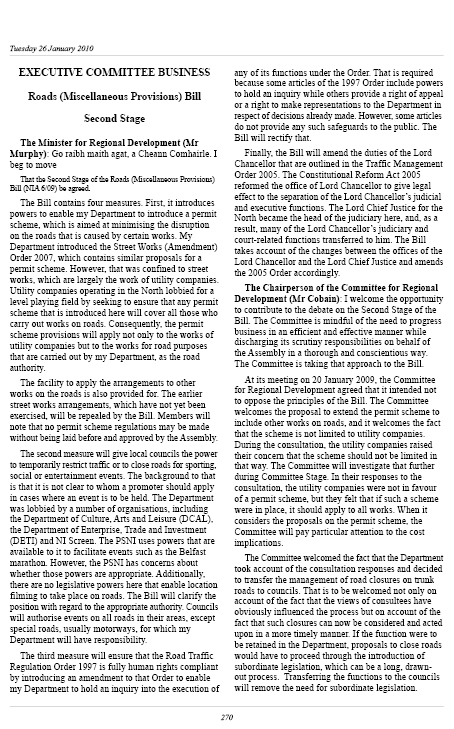
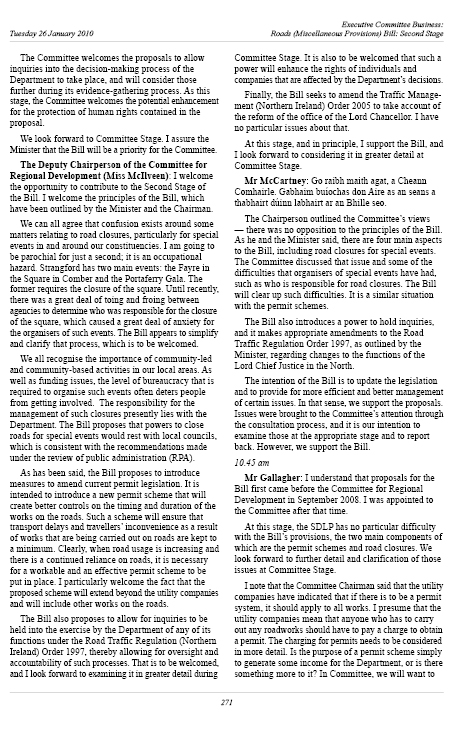
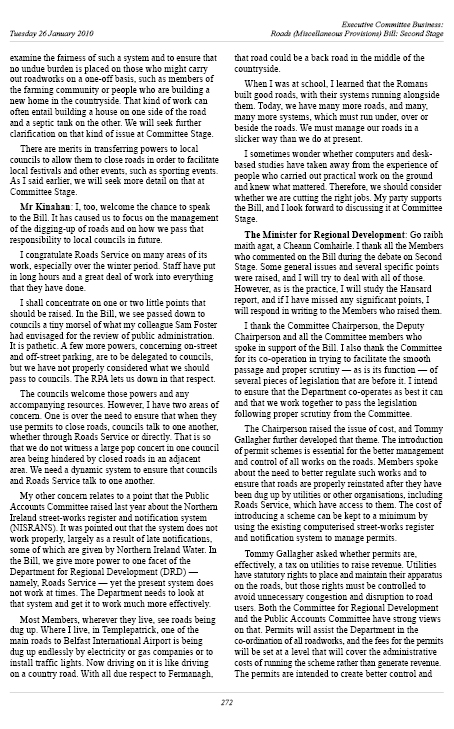
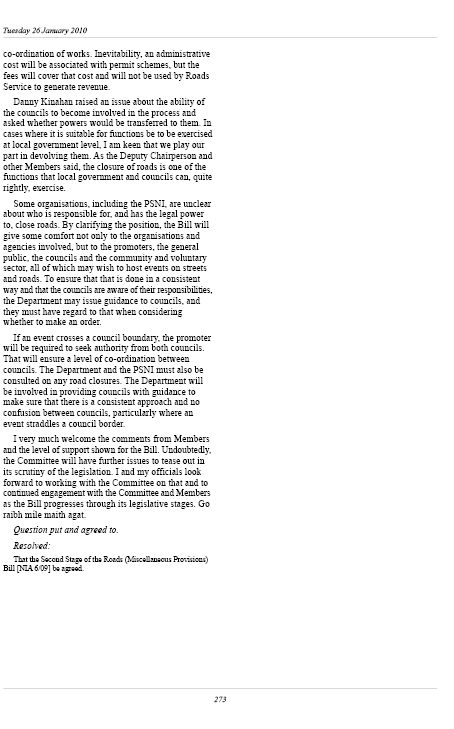
Motion for Extension of Committee Stage,
15 February 2010
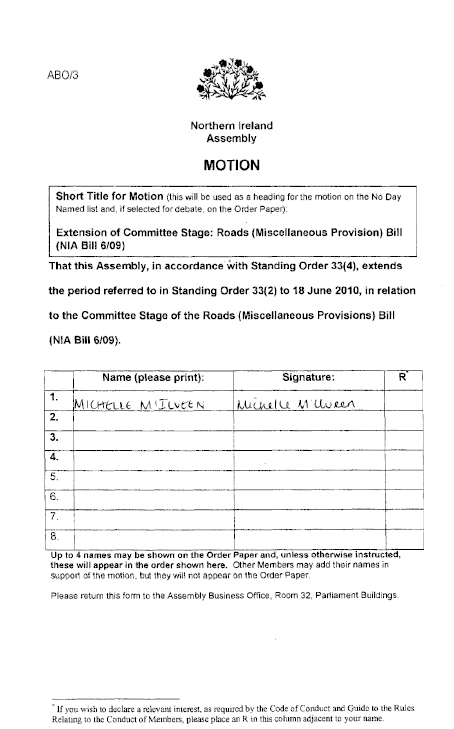
Transcript of Motion for Extension
of Committee Stage, 15 February 2010
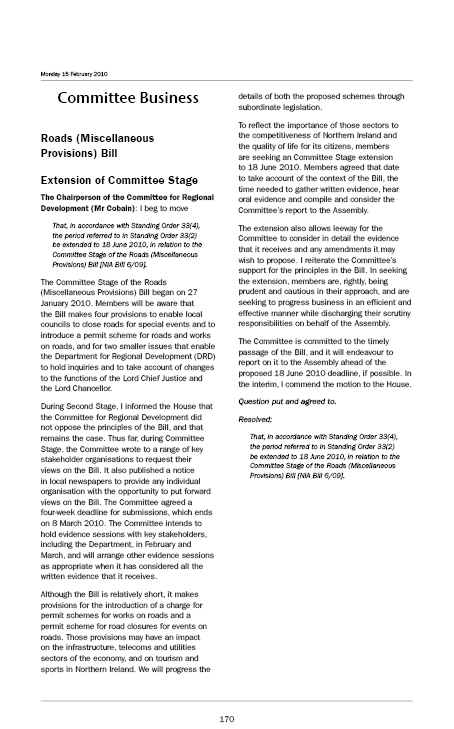
Public Notice, Published 8 February 2010
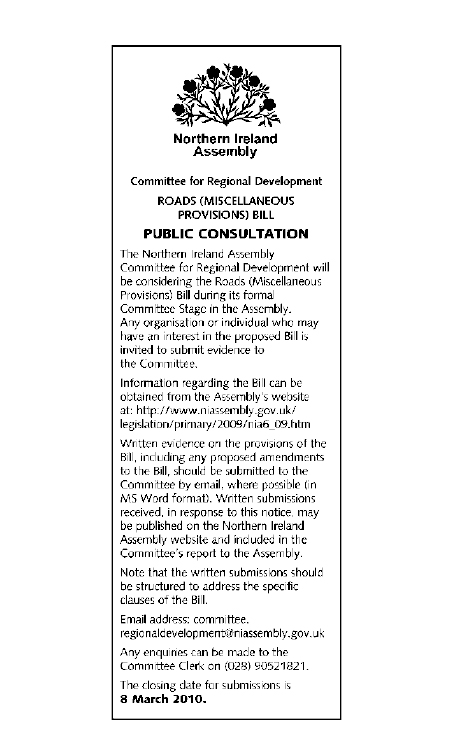
Appendix 7
Stakeholders invited
to give evidence
Stakeholders invited to give
evidence to the Committee
The following Assembly Committees, Government Departments and stakeholders organisations were specifically invited to provide written evidence to the Committee during its call for evidence on the Roads (Miscellaneous Provisions) Bill:
Antrim Borough Council;
Ards Borough Council;
Armagh City and District Council;
Arts Council of Northern Ireland;
Ballymena Borough Council;
Ballymoney Borough Council;
Banbridge District Council;
Belfast City Council;
BT Ireland;
Carrickfergus Borough Council;
Castlereagh Borough Council;
Coleraine Borough Council;
Committee for Culture, Arts and Leisure;
Committee for the Environment;
Confederation of British Industry;
Confederation of British Industry;
Cookstown District Council;
Craigavon Borough Council;
Department of Enterprise, Trade and Investment;
Derry City Council;
Down District Council;
Dungannon and South Tyrone Borough Council;
Federation of Small Businesses;
Fermanagh District Council;
Firmus Energy;
Larne Borough Council;
Law Centre NI;
Limavady Borough Council;
Lisburn City Council;
Magherafelt District Council;
Moyle District Council;
Newry and Mourne District Council;
Newtownabbey Borough Council;
North Down Borough Council;
Northern Ireland Authority for Utility Regulation;
Northern Ireland Council for Voluntary Action (NICVA);
Northern Ireland Electricity;
Northern Ireland Local Government Association (NILGA);
Northern Ireland Screen (formerly Film NI);
Northern Ireland Water;
Omagh District Council;
Phoenix Gas;
Police Service of Northern Ireland (PSNI);
Roads Service;
Strabane District Council; and
Virgin Media.
